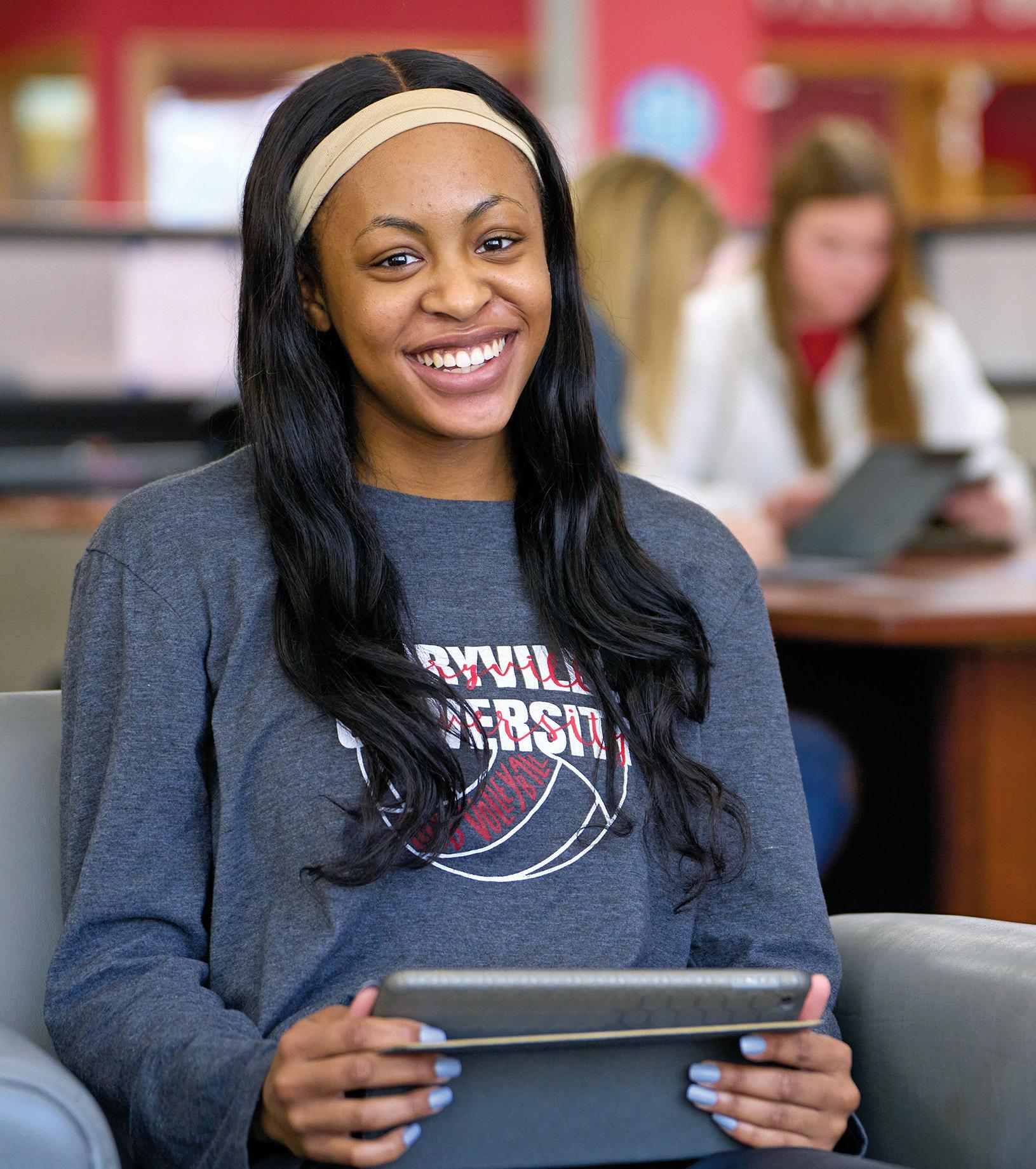




Prospective students can chat with their future classmates and connect with current Maryville students using a new app.

THE COVER
Thank you, Maryville nurses! From left, Sara Geile, BSN, RN, ’19; Professor of Nursing LaDonna Whitten, RN, PhD; Karen Korte, MSN, APRN, FNP-BC, ’22; Ayllyn Nolte, BSN, ’22; and Riley Anderson, BSN, RN, ’20.

EDITORIAL
Editor: Constance Gibbs
Design and Layout: Cisneros Design
Contributing Writers: Jong Cambron, Andrew Faught, Nancy Fowler, John Gibbs, Emily Karcher, Dale Singer and Gabbie St. Pierre
Contributing Photographers: Max Bouvatte, Dan Donovan, Jerry Naunheim, Kevin A. Roberts, Tim Vizer and Theo Welling
ADMINISTRATION
President: Mark Lombardi, PhD
Vice President for Integrated Marketing and Communications: Marcia Sullivan
Executive Director of Development and Alumni Relations: Fay Fetick
Director of Alumni Services: Pamela Kramer
Before joining the Maryville faculty, Assistant Professor of Nursing Demetruis M. Leonard, MSN, RN, ’13, served in Iraq as part of Operation Enduring Freedom and completed advanced degrees while balancing work and family life.
Maryville students are using storytelling to explain complex scientific concepts such as black holes, rip currents and the effects of Alzheimer’s disease on the brain.


Samantha Lee Smugala, ’12, is helping revitalize
St. Louis by transforming vacant lots into mini parks.
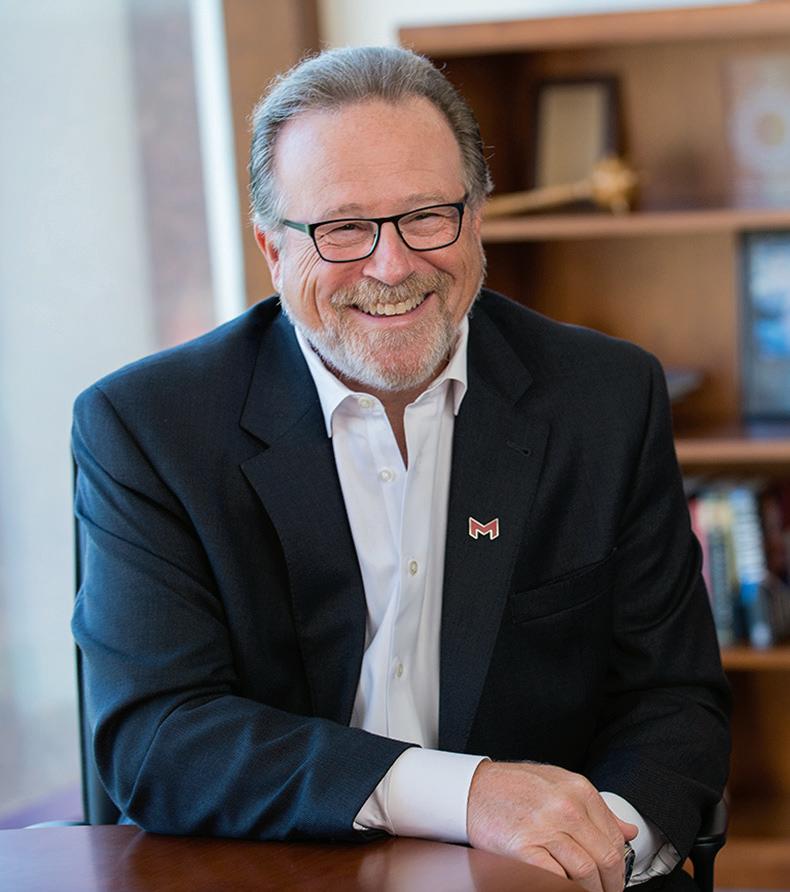
Dear Friends,
The year 2022 is a focal point for Maryville University, this region, our nation and the world.
First, God willing, we are moving past this horrific pandemic that has taken loved ones, interrupted lives and stalled dreams. Ahead lies a different world than the one we had in 2019, but one full of promise and opportunity for our students and graduates as they can continue their journeys and accomplish their goals.
Second, 2022 represents the 150th year of this great and good University. Throughout this year we are celebrating the amazing achievements of our forebears, the foundation of innovation they built and the wondrous achievements of the past 150 years and our glorious future. All of this will culminate in a spectacular set of events at Homecoming 2022 this fall. Make your plans now to join us.
Third, in this issue, we explore and salute the amazing achievements of our students, faculty, staff and alumni who have persevered and thrived in making stronger, better and more creative communities across St. Louis, the region and the nation. I cannot
tell you how proud I am of their character in adversity, passion amidst change and commitment against all odds. The people of Maryville continue to be great beacons for education, tolerance and civil engagement. Finally, the forward progress of your Maryville University accelerates. We are strong, vibrant and creatively reshaping the face of higher education, making it more accessible, affordable, inclusive and responsive to the needs and demands of a digital world.
As you go through this issue, I think you will be truly amazed at all that this wonderful community has achieved in the most trying of circumstances.
As always, your support and good counsel is needed and always welcome.
Warmest regards,
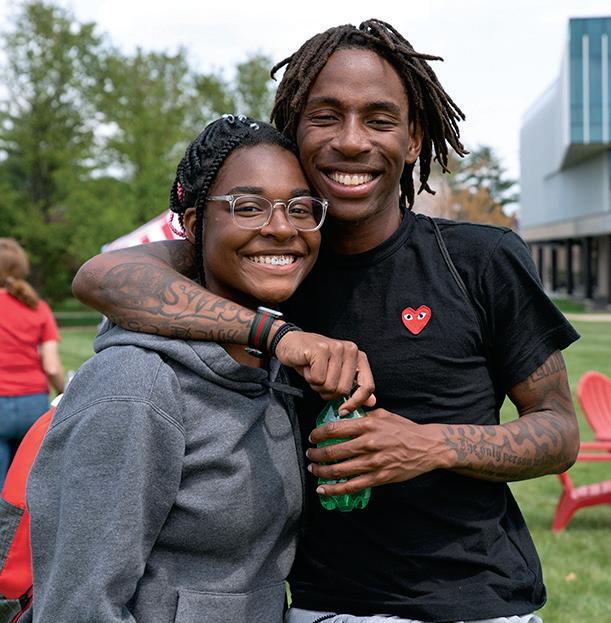
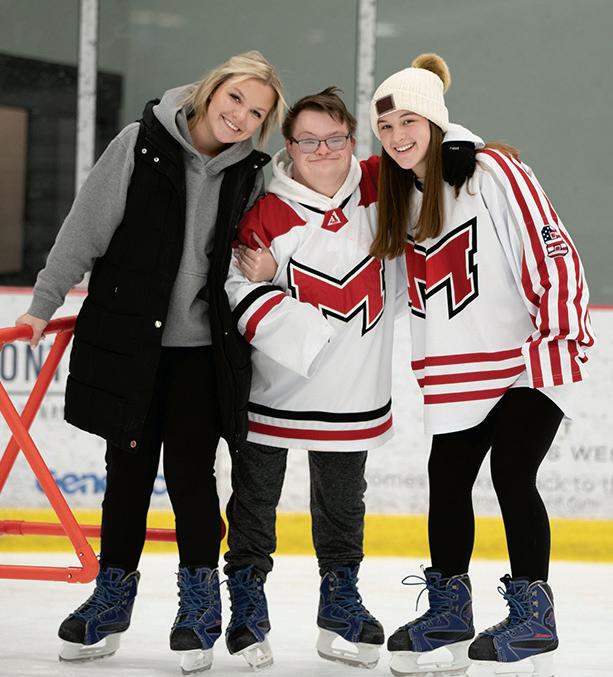
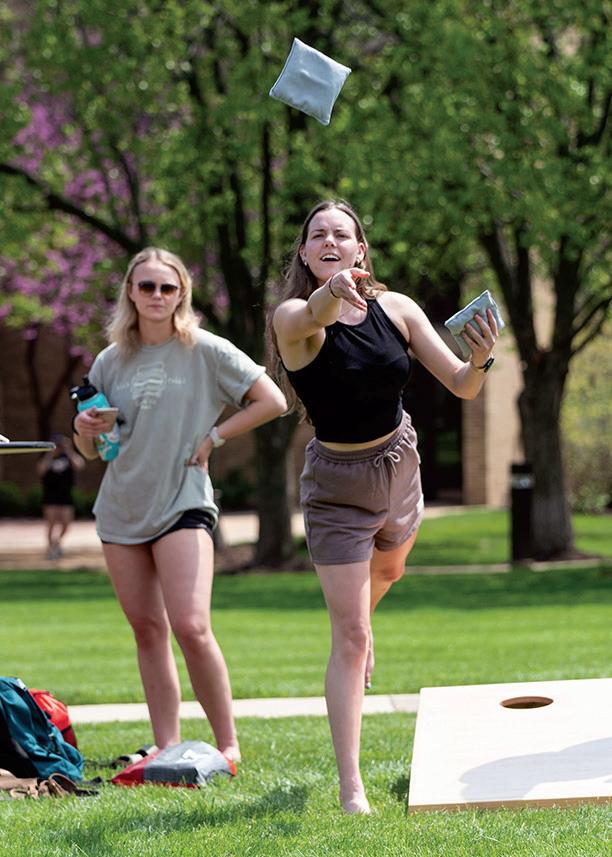
The Maryville community is celebrating our 150th anniversary in many ways, from attending events to posting our favorite Maryville memories on social media. The celebration continues throughout 2022 and will conclude at Homecoming this fall!
In February, Maryville celebrated athletics achievements past and present during Athletics Alumni Weekend with a series of signature events. The weekend kicked off with the Athletics Hall of Fame which honors the accomplishments of past studentathletes and athletics teams. Congratulations to the 2022 Athletics Hall of Fame Class: Shelby Miller Gliebe, ’15, Women’s Basketball; Elizabeth Kiblinger, ’15, Cross Country/Track; Armon Provo, ’15, Men’s Basketball; the 2001 Men’s Golf Team; and the 2016 Softball Team.
The weekend continued with Saints Skate at the Maryville University Hockey Center. Alumni, students, faculty and staff had the opportunity to skate on the same ice as the Saints. Afterward, they cheered on the men’s and women’s ice hockey teams
during tournament games. The men’s team was crowned 2022 Lindsay Cup Conference Champions the next day.
Athletics Alumni Weekend concluded with tours of the Maryville University Athletic Complex and the men’s soccer alumni game and banquet.
In April, Maryville Day featured a carnival on the quad. Attendees enjoyed food trucks, cornhole and traditional carnival games, including the high striker, clown tooth knockout and ring toss.
Amid confetti cannons, Vice President for Student Life Nina Caldwell, EdD, and Maryville Student Government President Nidal Yasir ceremoniously cut a four-tiered 150th-themed cake. That evening, students participated in a silent disco where they danced to music listened to on wireless headphones.
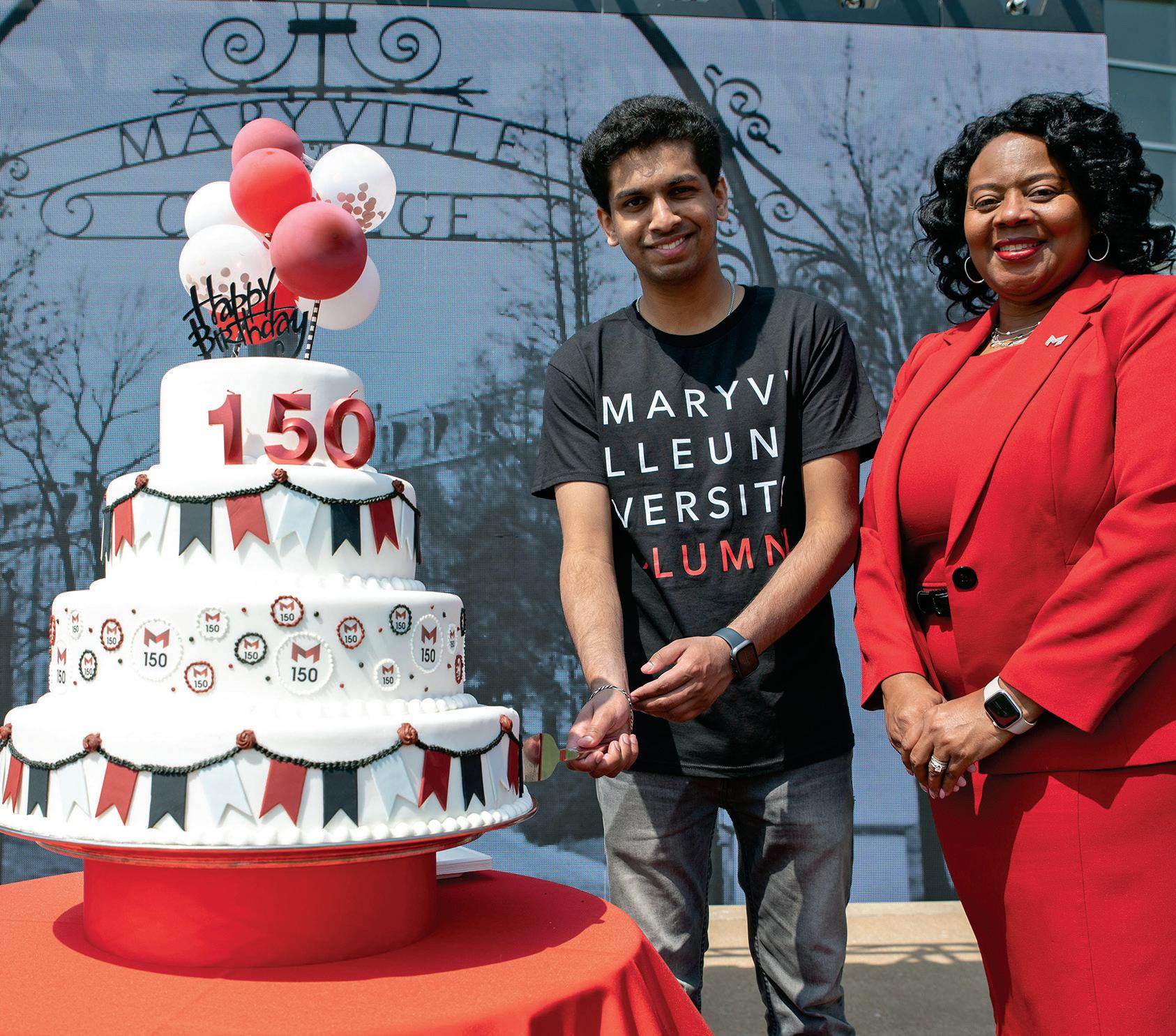
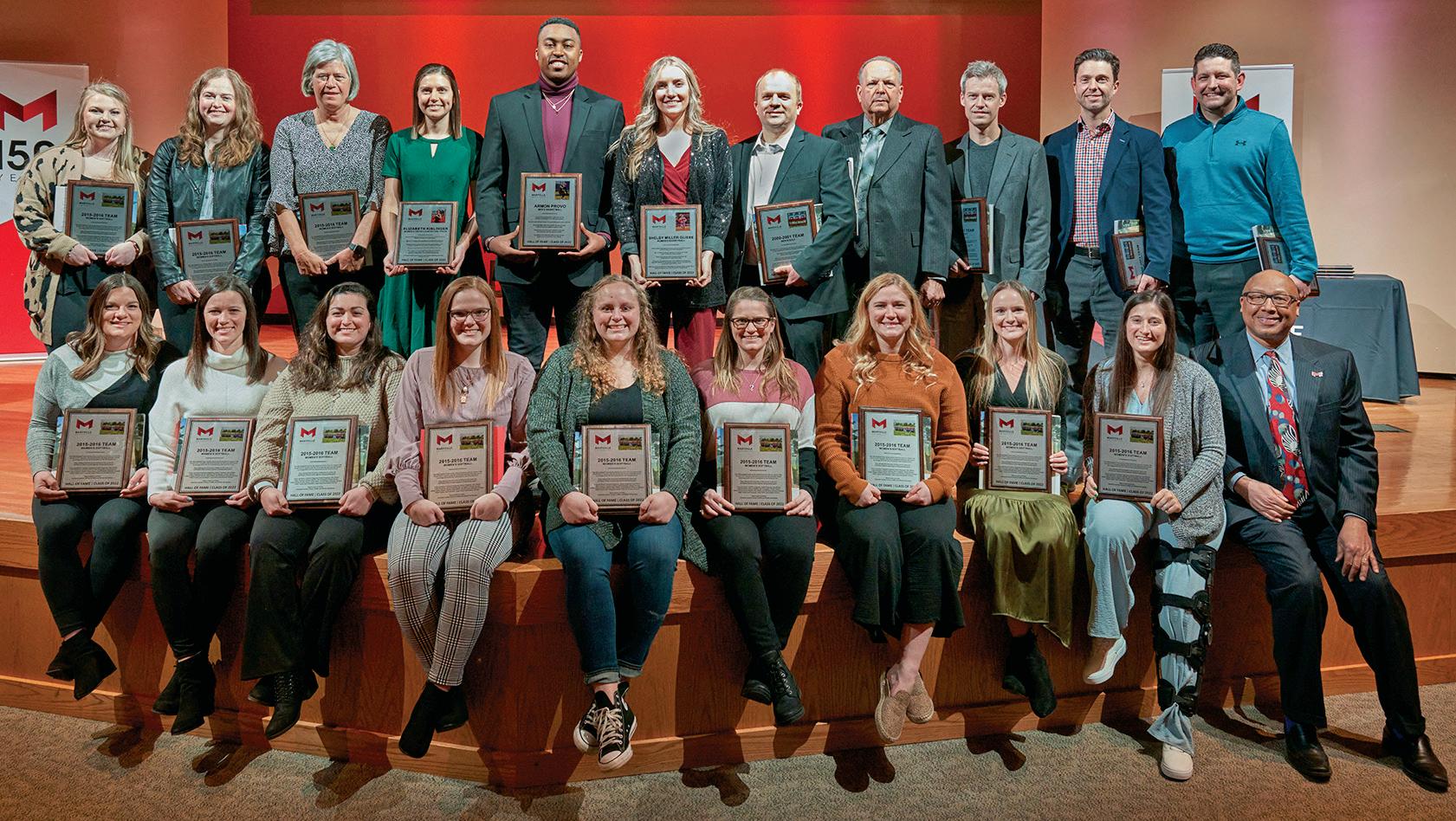
150th Anniversary Bash
September 30, 2022
We hope you’ll join us for our 150th Anniversary Bash as we close out our yearlong celebration, as part of Homecoming 2022. The party is so big, we need the entire campus for it! Explore different eras of Maryville history across campus. Check out our live interactive stations, enjoy live music and look to the skies for our drone show.
For more information, visit maryville.edu/150
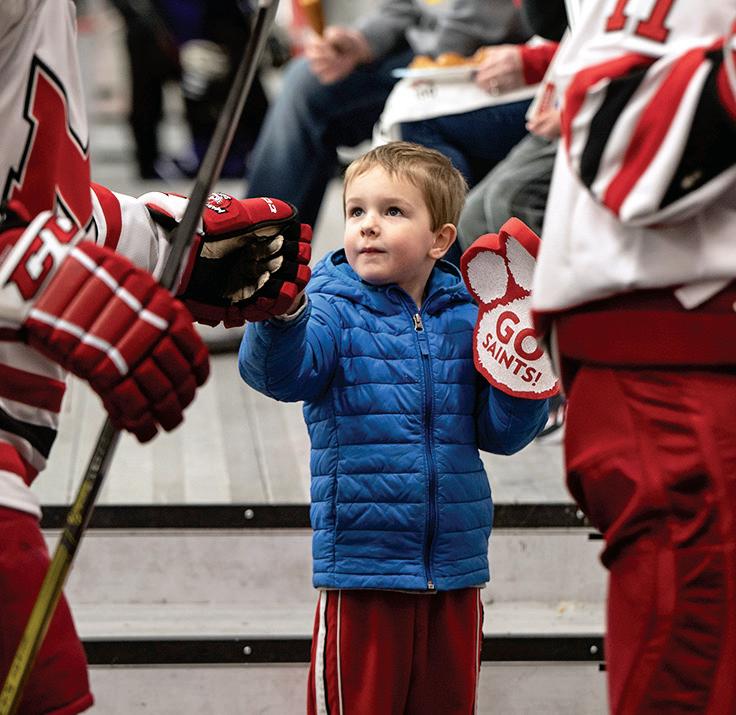
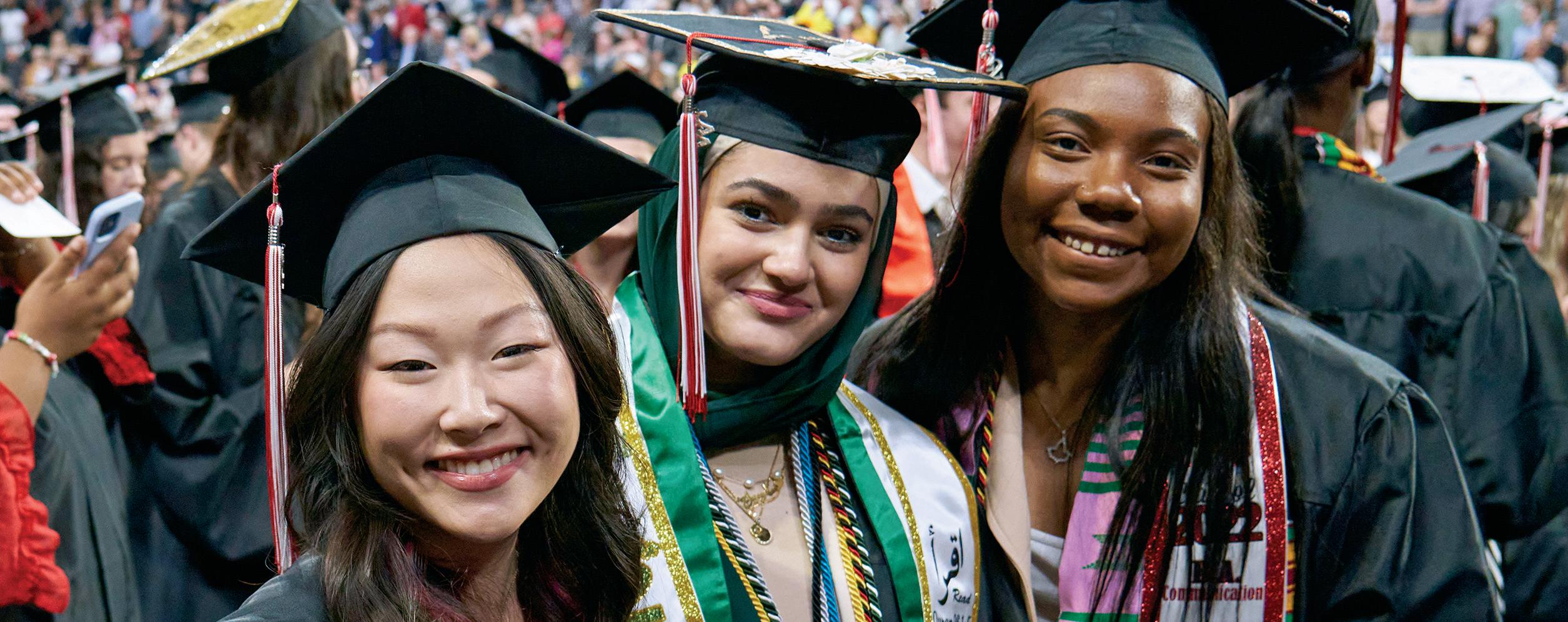
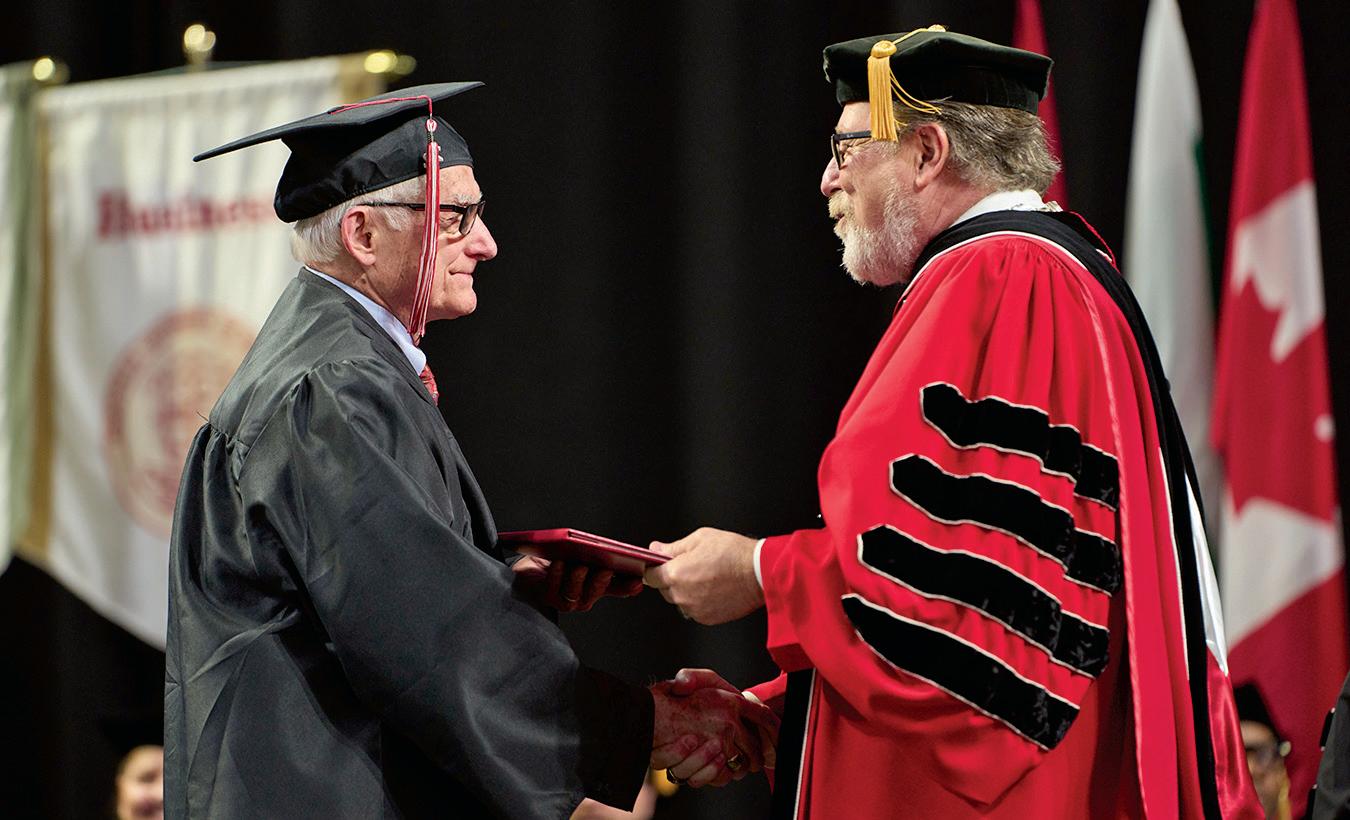
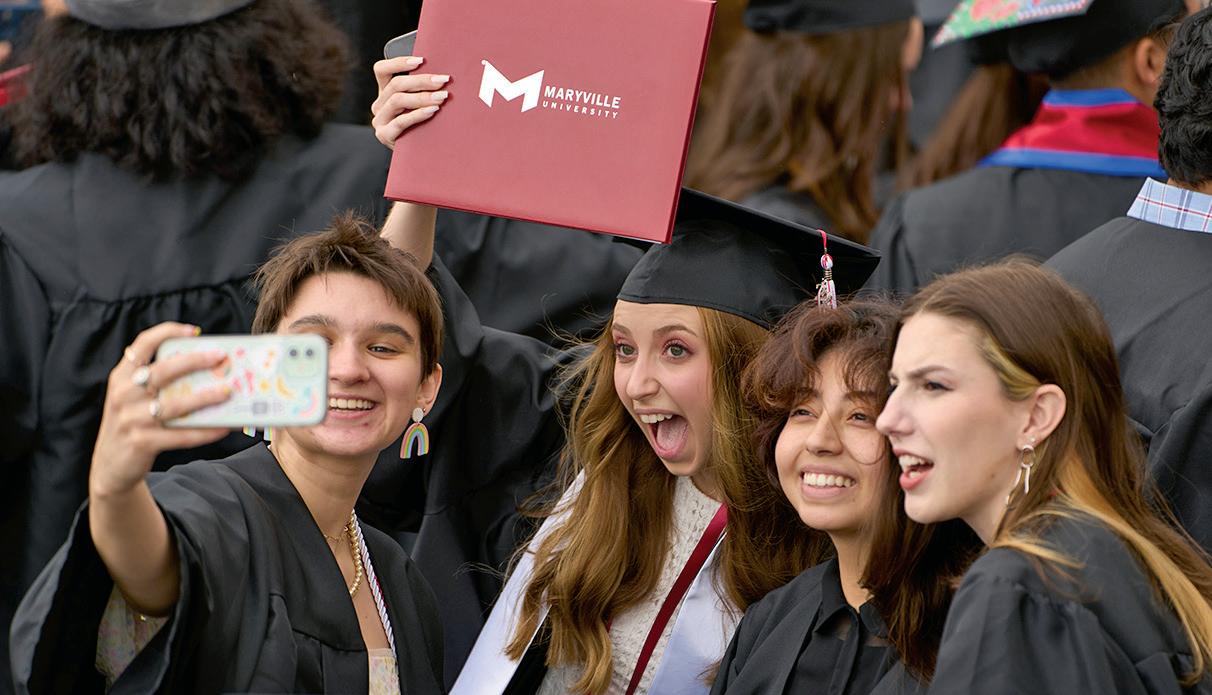
The Maryville community was overjoyed to celebrate an in-person Commencement for the first time in two years since the pandemic began. Nearly 1,000 graduates walked across the stage during two ceremonies — one undergraduate and a second graduate — at The Family Arena in St. Charles, Mo. Faculty, family and friends were also welcomed back to cheer on graduates. Among the Class of 2022 was Stancel Skelton who, at 83 years young, proved you are never too old to follow your dreams. A Maryville Online student, Skelton graduated with a Bachelor of Arts in Business Administration and traveled from San Jose, Calif., to attend Commencement. Additionally, Martha “Marti” Keller, who earned her Bachelor of Arts in Liberal Studies, had more than one reason to celebrate: Her boyfriend popped the question during a surprise marriage proposal following her walk across the Commencement stage.
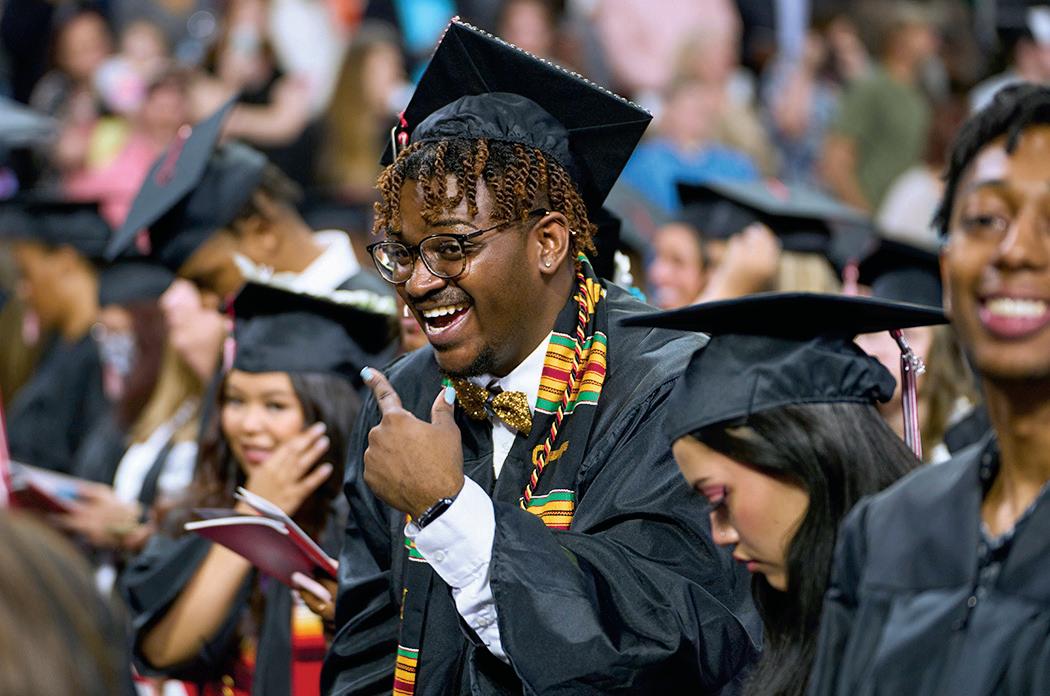
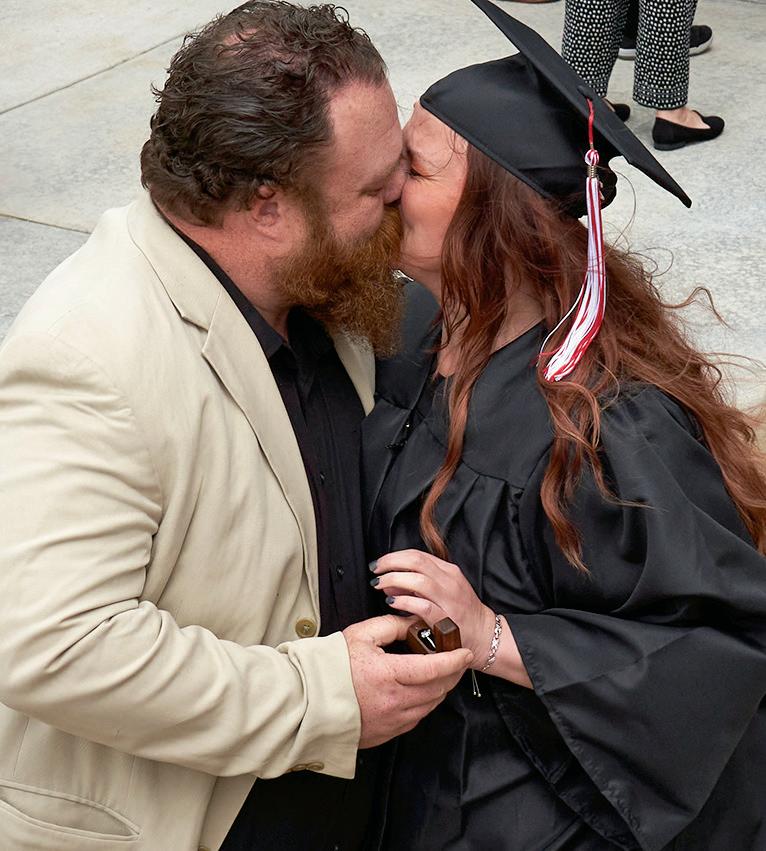
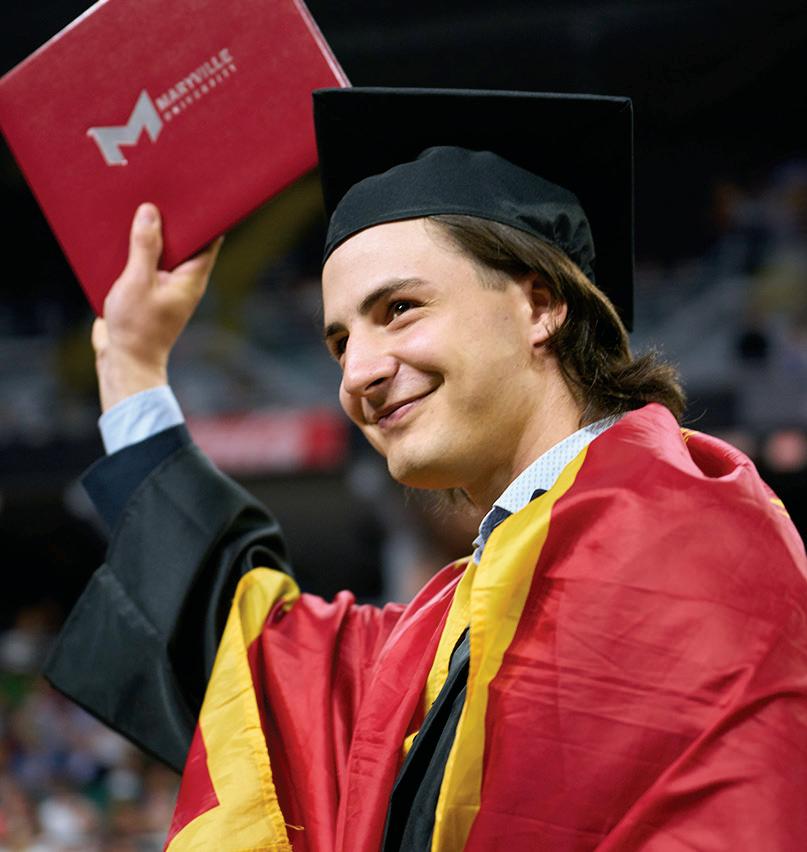
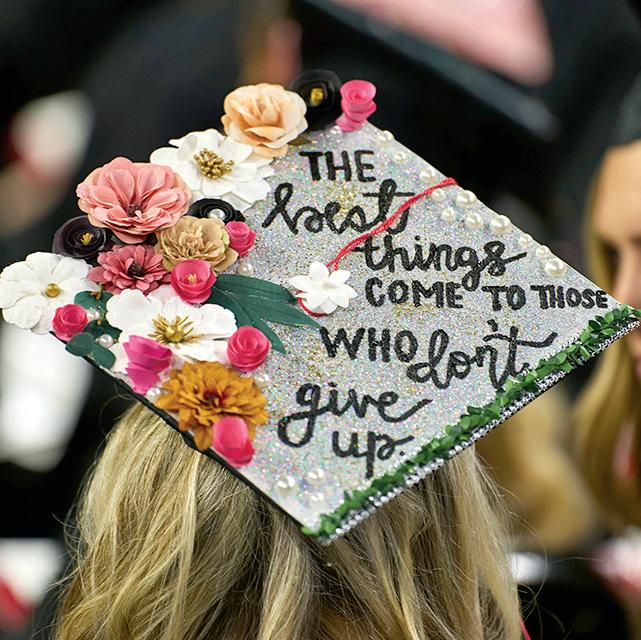
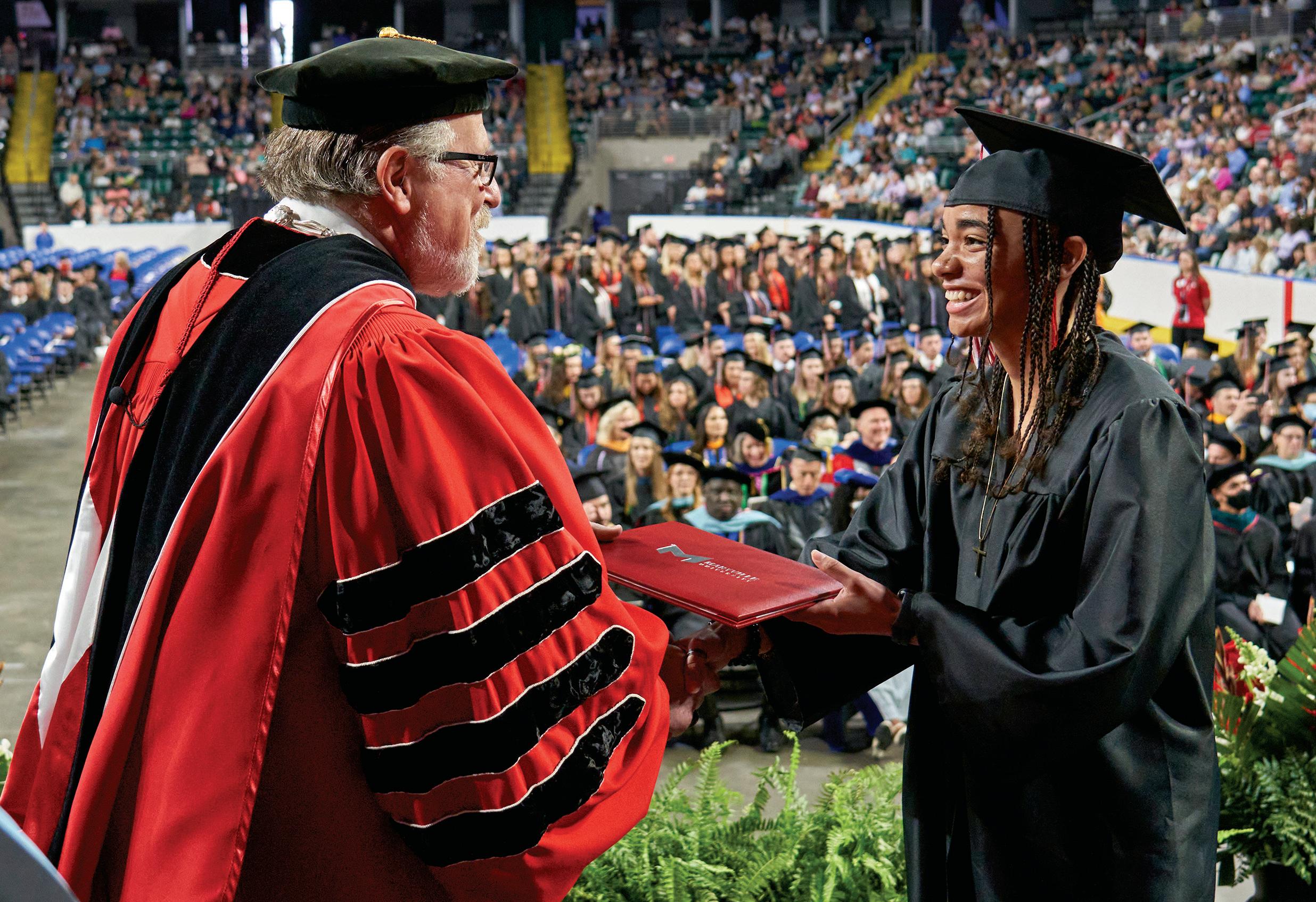
Maryville University is transforming higher education at a pace more common in the entrepreneurial world than in education, and is frequently recognized for its leadership.
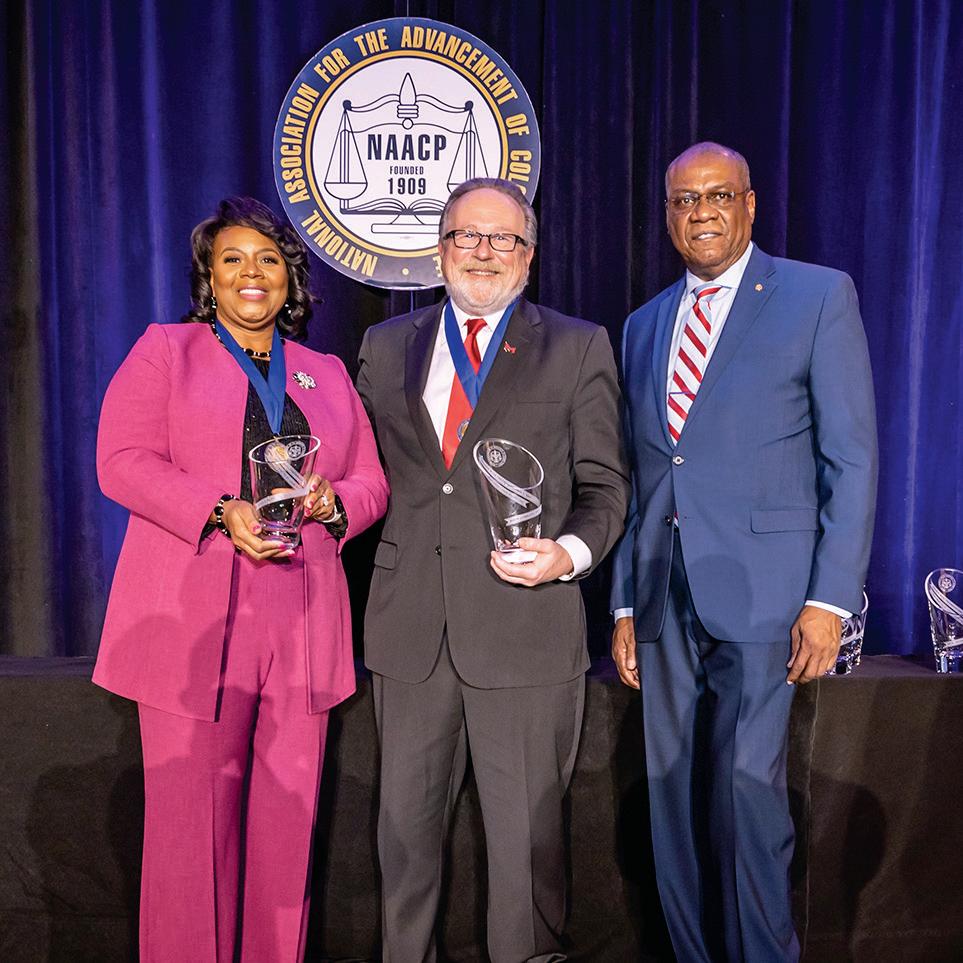
The St. Louis City NAACP presented the Frankie Muse Freeman/Norman R. Seay Commitment to St. Louis Award to President Mark Lombardi, PhD, and Vice President for Student Life Nina Caldwell, EdD. The award is presented annually in recognition of exemplary service, distinguished leadership and commitment to improve the cultural, social and economic growth and development of the St. Louis area.
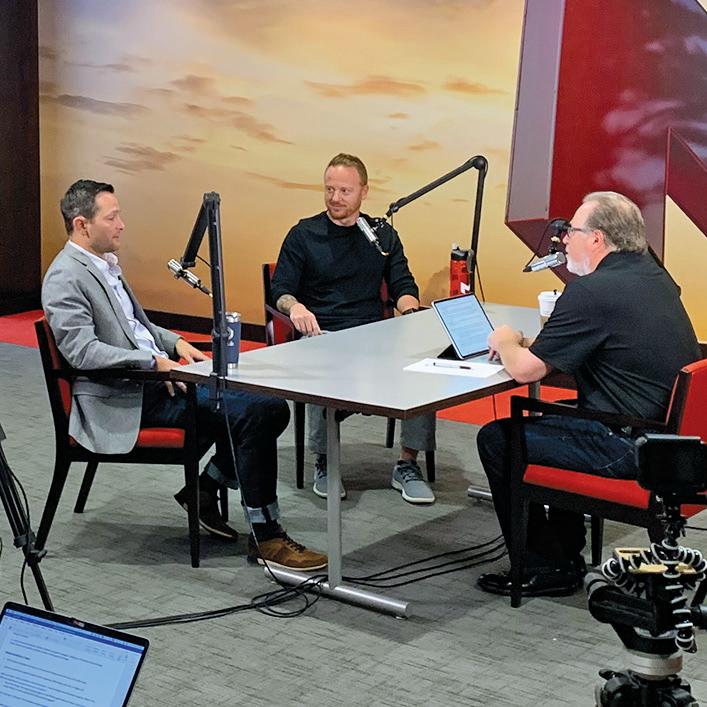
Maryville launched a new podcast titled “Disruptor in Chief,” which features conversations with Maryville faculty, staff and other change agents in the higher education industry. Hosted by President Mark Lombardi, PhD, the series shares how Maryville is driving the future of higher education. Subscribe and listen to episodes on Apple Podcasts or Spotify. Video versions of select episodes are also available on YouTube.

Maryville is helping entrepreneurs of color in St. Louis develop new skills and navigate the demands of running a business online.
The COVID-19 pandemic has posed unexpected challenges for small businesses. According to a recent report, 57 percent of firms in the U.S. characterized their financial condition as “fair” or “poor” during the pandemic. In underrepresented communities of color, this percentage increased dramatically.
Maryville was featured at the 2022 SXSW EDU Conference & Festival, one of the most influential conferences for educational thought leadership and innovation. President Mark Lombardi, PhD, spoke about driving a revolution in higher education and how Maryville is leading that effort.
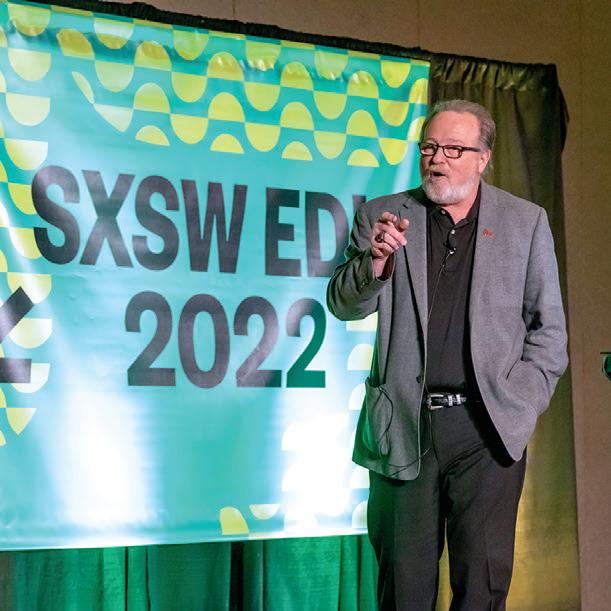
Some owners were able to pivot online, while others struggled to obtain the digital expertise they needed to adapt to this new environment. But digital skills are crucial for modern businesses that want to keep pace with our changing economy.
That’s why Maryville launched the Digital Development Project. Together with community advocacy organizations in St. Louis, the University is helping entrepreneurs of color in St. Louis develop new skills and navigate the demands of running a business online.
Through the program, entrepreneurs are connecting with a network of expert advisers and learning the fundamentals of e-commerce, digital marketing channels, analytics, measurement platforms, strategies and tactics. Additionally, experts recommended by each organization are serving as business advisers, providing guidance on vital topics like e-commerce, acquiring loans and business skills.
“Minority-owned businesses are the backbone of the local economy, and they’ve been hit very hard by the pandemic,” said President Mark Lombardi, PhD.
“That’s why we’re providing an outstanding digital marketing boot camp to help businesses improve their bottom line and grow. We’re proud to get this off the ground, and we’re excited about the impact that it’s going to have here in the St. Louis community and beyond.”
A new program encouraging cultural fluency for Maryville interior design students launched this year, thanks to funding from the Angelo Donghia Foundation. The Design Ambassadors will participate in field trips to architecturally significant buildings, museums and landmarks in St. Louis and throughout the Midwest, along with guest lectures, workshops and networking opportunities. They will interact with the community and learn the importance of understanding the needs and touchstones of diverse clients. The program is made up of a cohort of eight to 10 students who are selected through an application process. Throughout the year, the Design Ambassadors will bring their newfound expertise back to the Maryville community through events and presentations, culminating in an annual exhibition.
Maryville Forward is an opportunity to propel Maryville University ahead into the next 150 years. This new recognition group honors donors who give a minimum of $1,000 to the Maryville Fund. Annual gifts to the Maryville Fund enable the University to respond quickly to opportunities and support students and faculty in the most impactful way. The funds give us the flexibility to manage crises and take advantage of the best changes in innovation, technology and learning. While Maryville understands the importance of scholarships, leadership and programs made possible by donors, giving unrestricted dollars supports the mechanism that keeps it all going. Gifts to the Maryville Fund transform the University and make a lasting impact.
Join the movement! Together, we can move Maryville Forward into the next 150 years. Give now at maryville.edu/give.
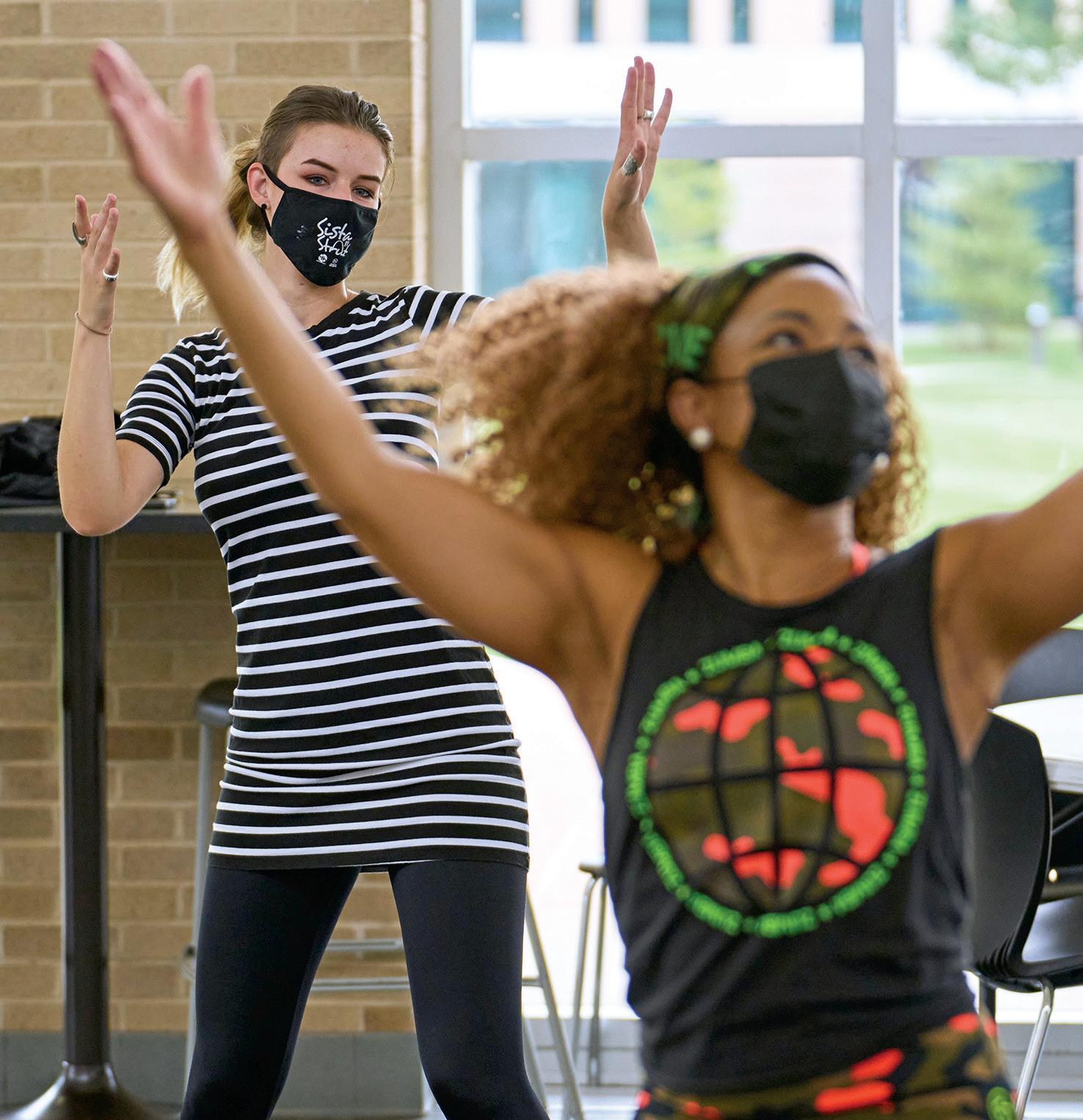
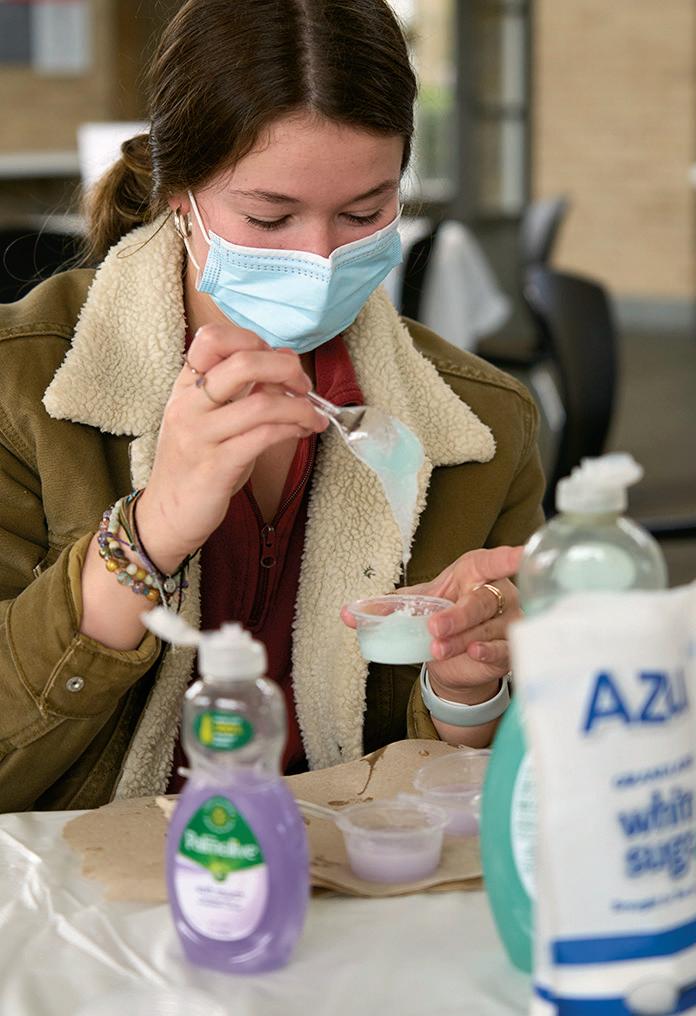
In October, Maryville offered a campus-wide mental health day. Classes were canceled for both on-campus and online students. In lieu of classes, the University hosted a variety of events to allow community members to engage in self-care, including Zumba, guided deep stretching, DIY sugar scrub creations and blanket-making. Students were also encouraged to reach out to family, friends and loved ones to recharge. Additionally in February, a second campus-wide mental health day was held for another opportunity for rest and rejuvenation.
Two years into the pandemic, mental health challenges continue to plague college students. Maryville is instructing faculty and staff on how to address those challenges.
There are nearly 20 million college students in America.
The COVID-19 pandemic made college far different than they expected.
“Even prior to the pandemic, universities nationwide were seeing huge increases in the number of students struggling with depression, anxiety and suicidal thoughts,” said Jennifer Henry, MA, LPC, director of the counseling center.
“People forget that college students are barely adults. They think they’re doing fine, that they can handle things on their own. But really college is a time when students are expecting to branch out and be spontaneous. They’re having this experience but in such a different way.”
To address those challenges, Maryville University announced expanded Mental Health First Aid training for faculty and staff.
The program previously launched in August 2021 with 50 individuals taking advantage of the course.
The expansion invites and encourages all faculty and staff to participate.
The training teaches how to identify, understand and respond to signs of mental health and substance use problems. The goal is to equip individuals to become better observers and responders to students in order to be able to spot problems before they become a serious challenge.
The training is led by Associate Professor of Occupational Therapy Ashlyn Cunningham, OTD/OTR/L, who is a certified
instructor for Mental Health First Aid. Individuals are certified for three years after completing the training.
“The pandemic has caused emotional strain and enormous psychological impact on our students that we want to mitigate,” said President Mark Lombardi, PhD. “Often, if we can address mental health and substance use problems early on, we can make a difference. Maryville is offering this training to faculty and staff so that we are better prepared to serve our students and each other.”
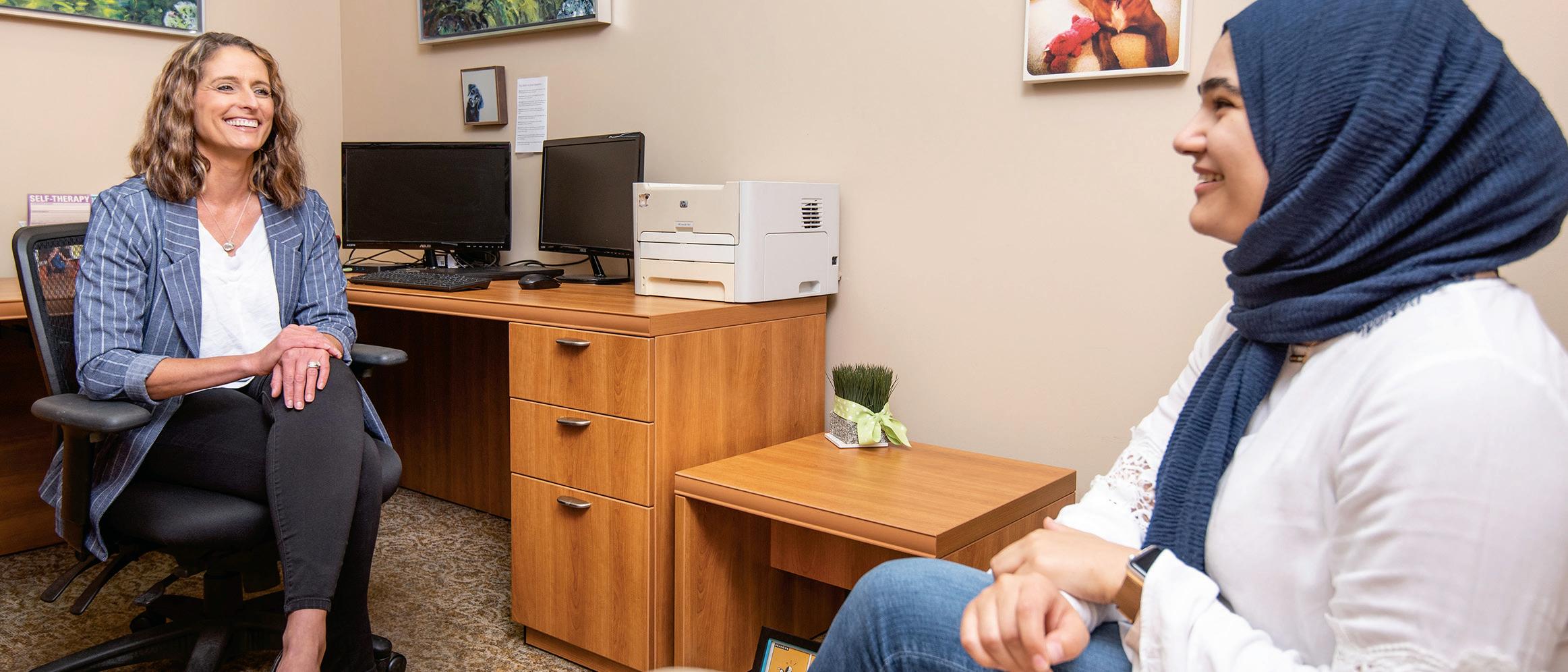
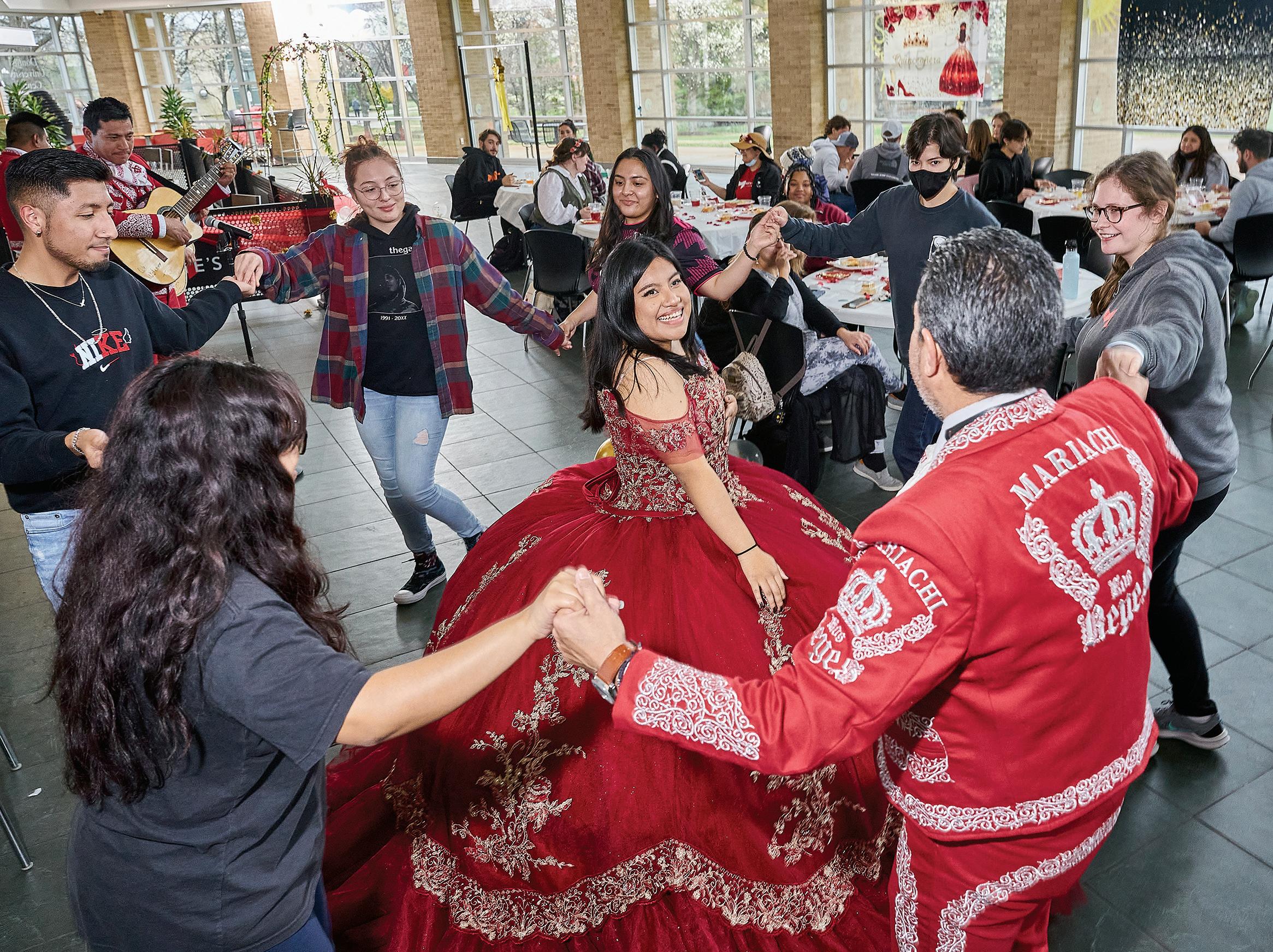
Maryville’s LatinX Student Alliance hosted a quinceañera celebration in honor of the student organization’s 15th anniversary. The event included a night of music, food and fun as students learned about the different traditions that take place at a quinceañera. Quinceañeras are celebrated across Latin America and throughout the United States and signal the passage from girlhood to womanhood.
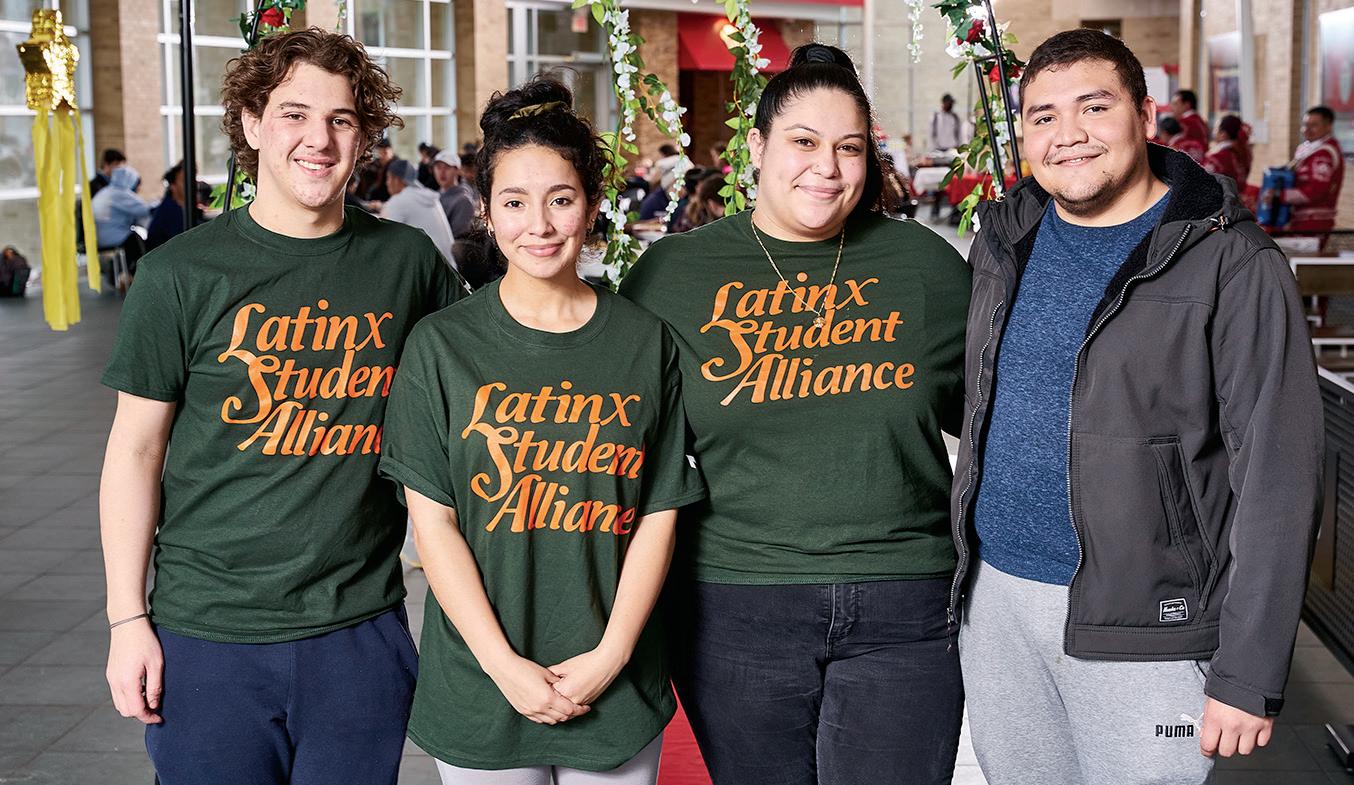
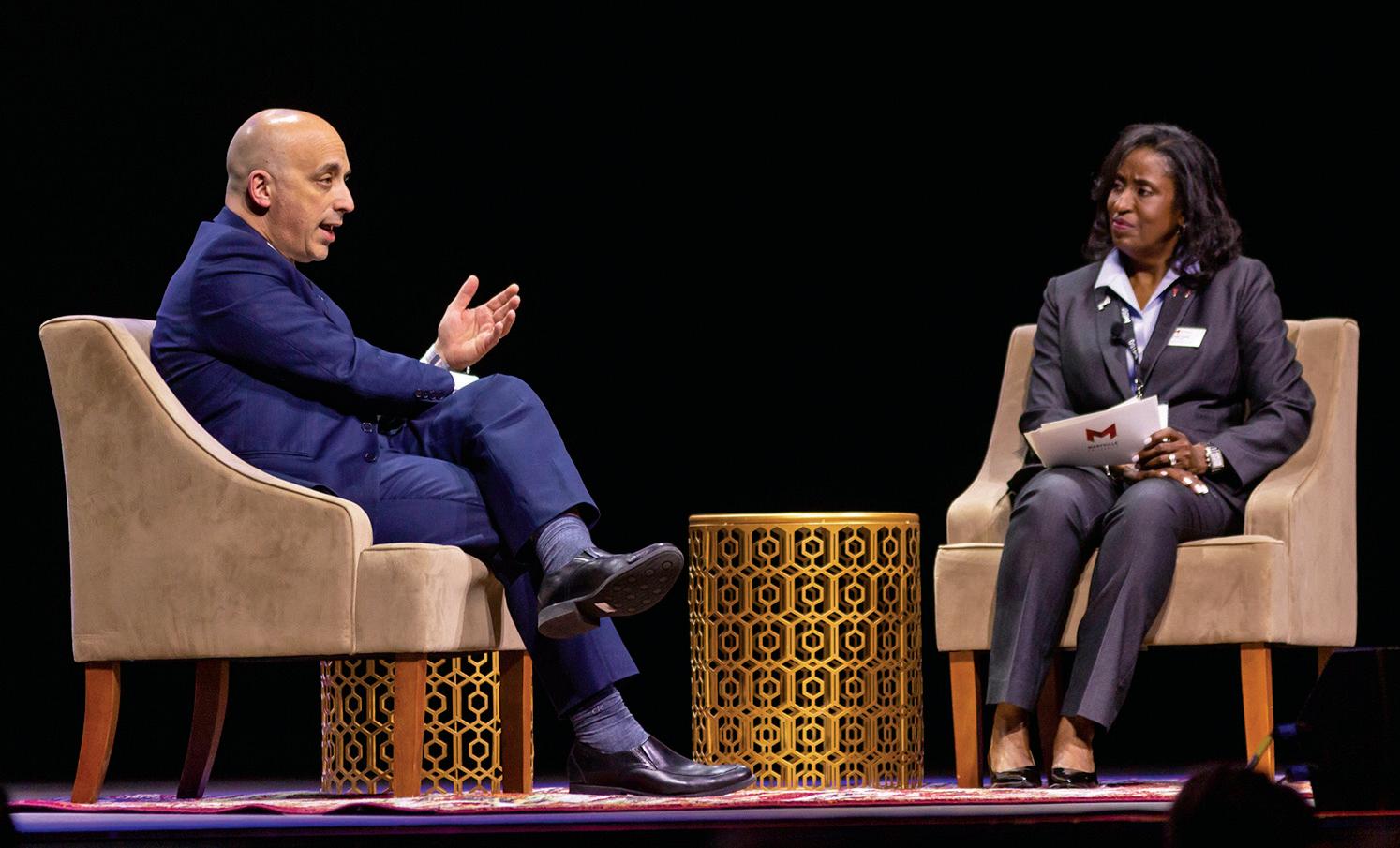
Jonathan Greenblatt spoke about the growth of hate and systemic violence in the U.S. during the inaugural Staenberg Lecture.
In April, the annual Staenberg Lecture series launched at The Factory in West St. Louis County. Made possible through a generous commitment to Maryville University from the Staenberg Family Foundation, the lecture series focuses on contemporary social issues through the lens of the Holocaust, its lessons and its historical significance.
The inaugural lecture featured Jonathan Greenblatt, CEO and national director of ADL (Anti-Defamation League), the world’s leading anti-hate organization. Greenblatt sounded the alarm that hate and systemic violence is gathering momentum in the United States — and that violence on a more catastrophic scale could be just around the corner.
“After we saw neo-Nazis marching through Charlottesville, after a rash of anti-Jewish assaults in Brooklyn, after the umpteenth time that a politician compares the state-sponsored genocide of 6 million Jews to mandates to wear masks indoors or after the U.S. Capitol was the site of a violent
insurrection — if that doesn’t worry you, you’re not paying attention,” he said.
“These threats are like killer storms bearing down on us, threatening to bring immediate violence and overwhelming harm to us all. In the face of this, we need to both defend ourselves and work to combat it aggressively. We have no other choice.”
Greenblatt also reflected on Russia’s invasion of Ukraine, the largest military mobilization in Europe since World War II.
“It’s gut-wrenching to see the scenes of horror and utter brutality of the Russian forces as they lay waste to this wonderful country,” he said. “It’s an unnecessary war that’s caused the death of thousands, dislodged millions of innocents and traumatized the world. The ramifications of the Russian savagery pose a threat to democracy everywhere and remind us of the danger of ignoring dictators.”
The Staenberg Lecture series will return in Spring 2023. More details about the event will be announced in the coming months.
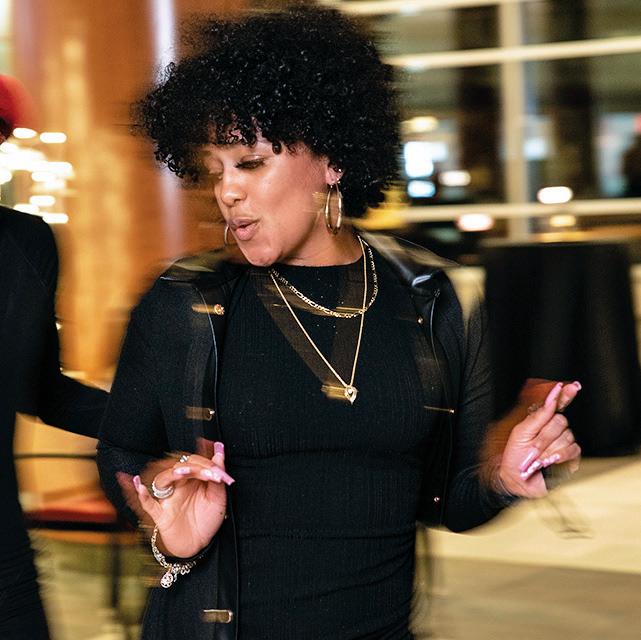
In February, Maryville celebrated the 11th annual Evening of Art and Jazz, sponsored by Maryville’s Association of Black Collegians and the Office of Diversity and Inclusion. The event showcases Black artists from the St. Louis area and the Maryville community. Students enjoyed donning their best cocktail attire and dancing the night away to a live jazz band. Guests only left the dance floor to strike a pose at the photo booth or grab a refreshment.
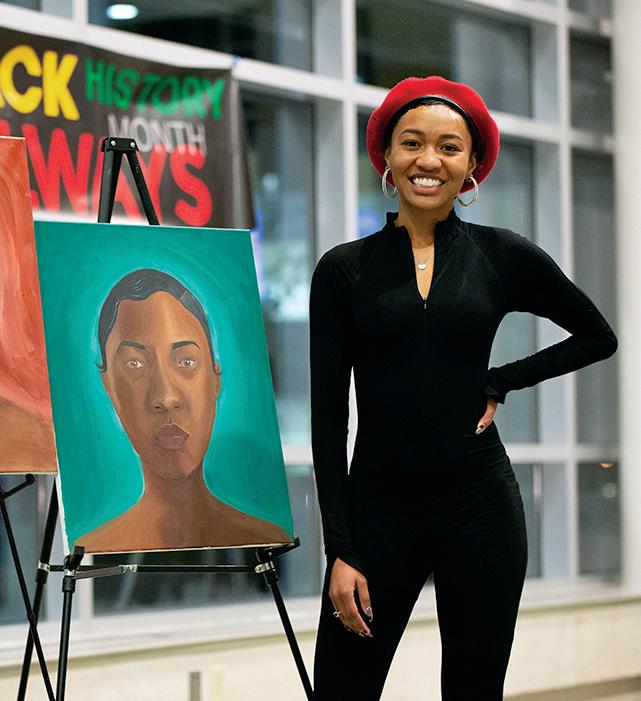
Cherie Fister, MFA, vice president for academic affairs, has announced her retirement. She leaves a lasting legacy for active student learning.
Cherie Fister, MFA, vice president for academic affairs at Maryville University, will retire effective at the end of the academic year. Her leadership was futuristic, innovative, thoughtful, engaging and always mindful of achieving the best for students.
“Maryville’s strength has always been its people. I knew the day I started and I believe it as deeply today,” Fister said. “It is with great emotion that I announce my retirement. I thrive on a fresh start and I think Maryville is poised for multiple fresh starts. I know liberty from pandemic conditions will bring joy to campus and co-creating the strategic plan will bring new energy.”
Under Fister’s leadership, Maryville created a campus-wide Active Learning Ecosystem that puts students at the center of learning. Students actively participate in the learning process by doing, making and interacting with each other and the environment around them, anytime and anywhere.
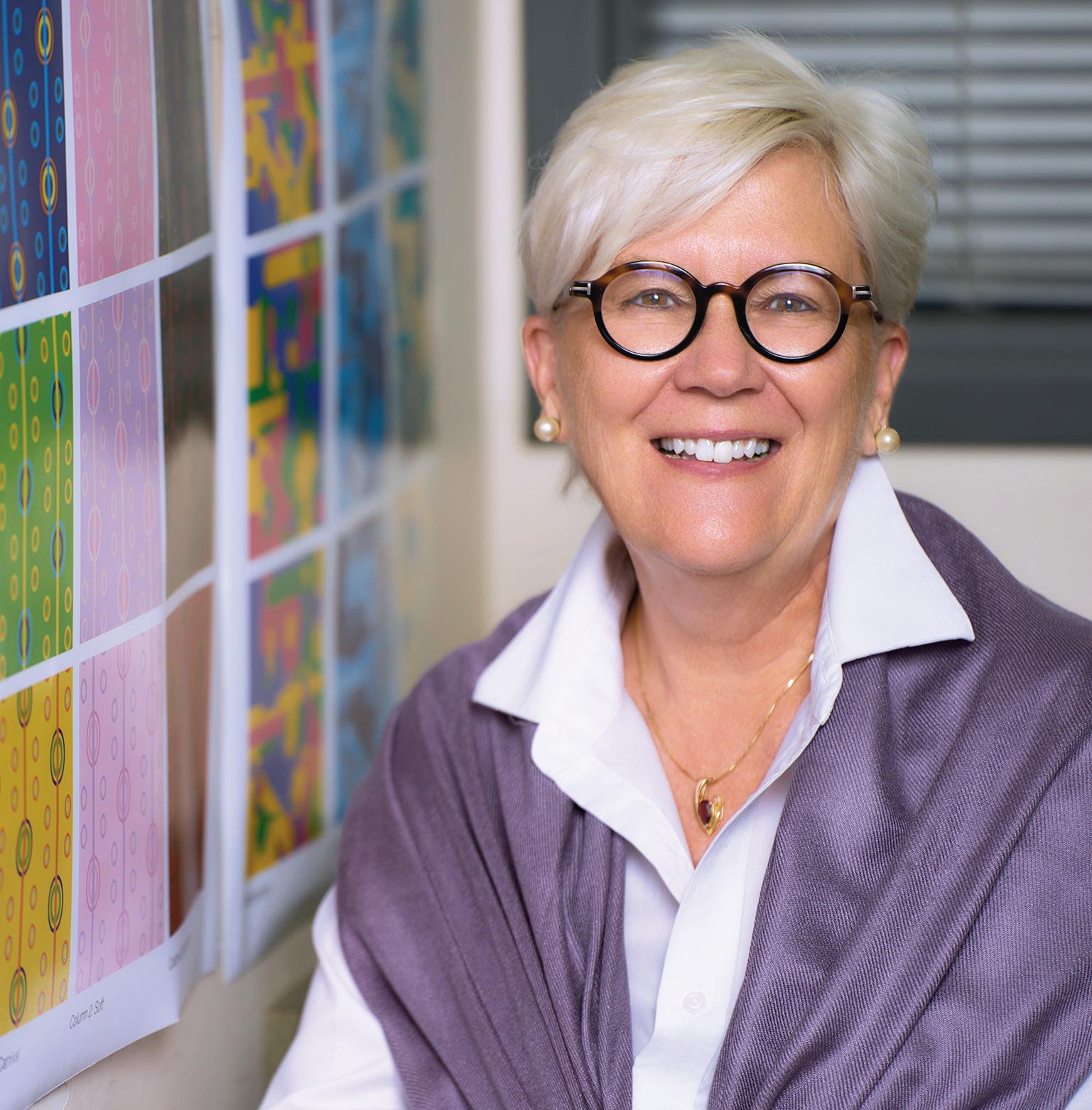
Additionally, Fister’s passion for teaching, learning and creativity has helped faculty shape personalized approaches to learning for every student. This includes enabling new ways for students to access information, collaborate and demonstrate understanding through Maryville’s Digital World program. She credits Maryville’s intense commitment to learning technology, paired with the faculty investment in the Scholarship of Teaching and Learning, with paving the way for the Active Learning Ecosystem’s success.
Fister joined the Maryville faculty in 1995, first serving as director of the graphic design program she created. During her nearly 20-year tenure as program director, the
Graphic and Interactive Design Programs received NASAD accreditation, gained national respect and created a network of professional designers who continue to support upcoming Maryville students.
Fister was named dean for the College of Arts and Sciences in 2015 after serving as interim dean and associate dean. In 2018, she moved into the role of vice president for academic affairs.
Jennifer Yukna, PhD, will move into the role of vice president for academic affairs following Fister’s retirement. Yukna has served as a faculty member, assistant dean and dean for the College of Arts and Sciences since her hiring in 2008.
Director of the Counseling Center
JENNIFER HENRY, MA, LPC , was featured in a Scripps television report about the mental health challenges that continue to plague college students as they navigate the pandemic era.
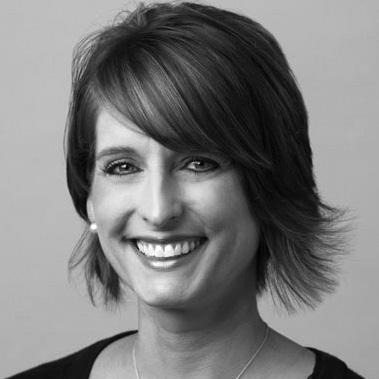
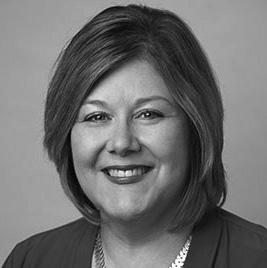
Assistant Professor of Nursing
NINA ZIMMERMANN, EDD, APRN, ANP-BC is preparing nursing students for advanced practice through the original podcast series “Nurse Practitioners Changing Practice.”
Assistant Professor of Cybersecurity BRIAN GANT, EDD , received a 2021 Excellence in Education Award from the St. Louis American Foundation for his leadership in the classroom and the community.
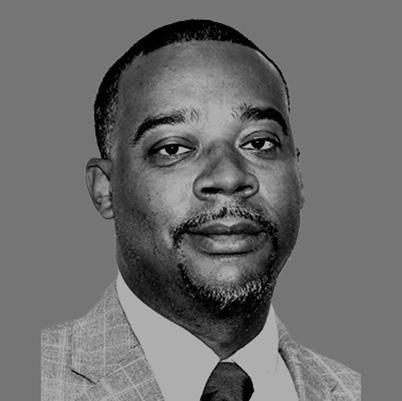
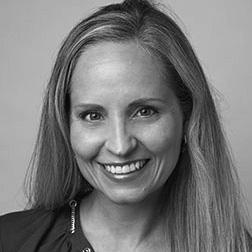
Associate Professor of Biology
KYRA KRAKOS, PHD was named part of a team of researchers that will study pollination in urban orchards thanks to a new grant from the U.S. Department of Agriculture.
MARIEA SNELL, RN, FNP, DNP assistant director of the DNP Program and associate professor of nursing, was honored at the annual gala for 100 Black Men of Metropolitan St. Louis.
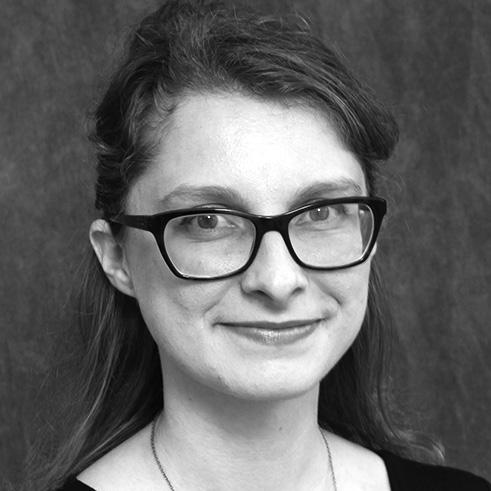
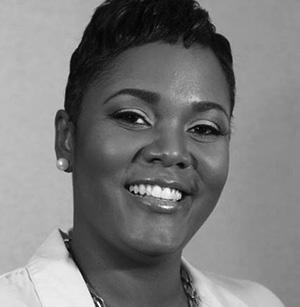
Development Director JAMI DOLBY was honored at the annual gala for 100 Black Men of Metropolitan St. Louis.
Cloud Engineer JOSHUA TEPEN was a featured speaker at the AWS re:Invent conference for his expertise regarding Maryville’s data lake, a centralized repository allowing the University to store data at any scale.
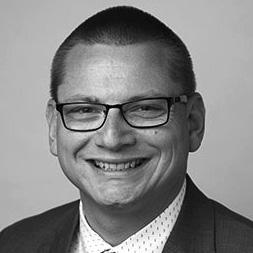
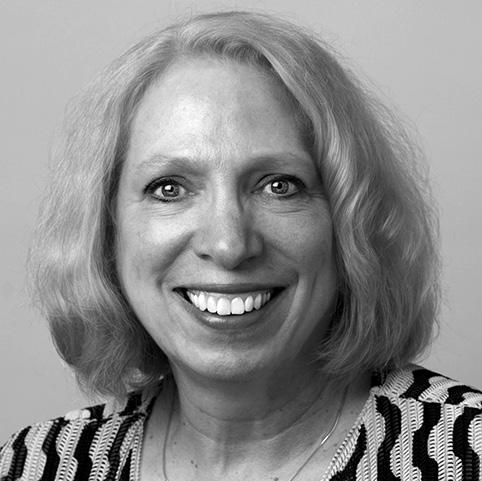
ELIZABETH BUCK, PHD, RN adjunct professor of nursing and past assistant dean for nursing, received the March of Dimes Lifetime Achievement Award for her significant impact on the field of nursing.
Director of Career and Professional Development
ANTOINETTE BOYD, EDD , presented research about unconscious bias to members of the Missouri Department of Higher Education and Workforce Development.
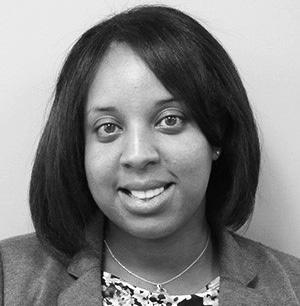
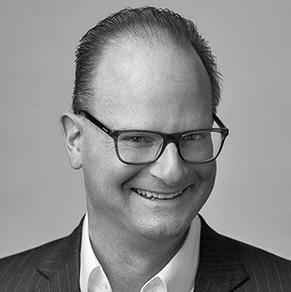
SCOTT CHADWICK, PHD chief of corporate partnership acquisitions, was featured by the St. Louis Business Journal for his expertise regarding workforce development and the future of the workplace.
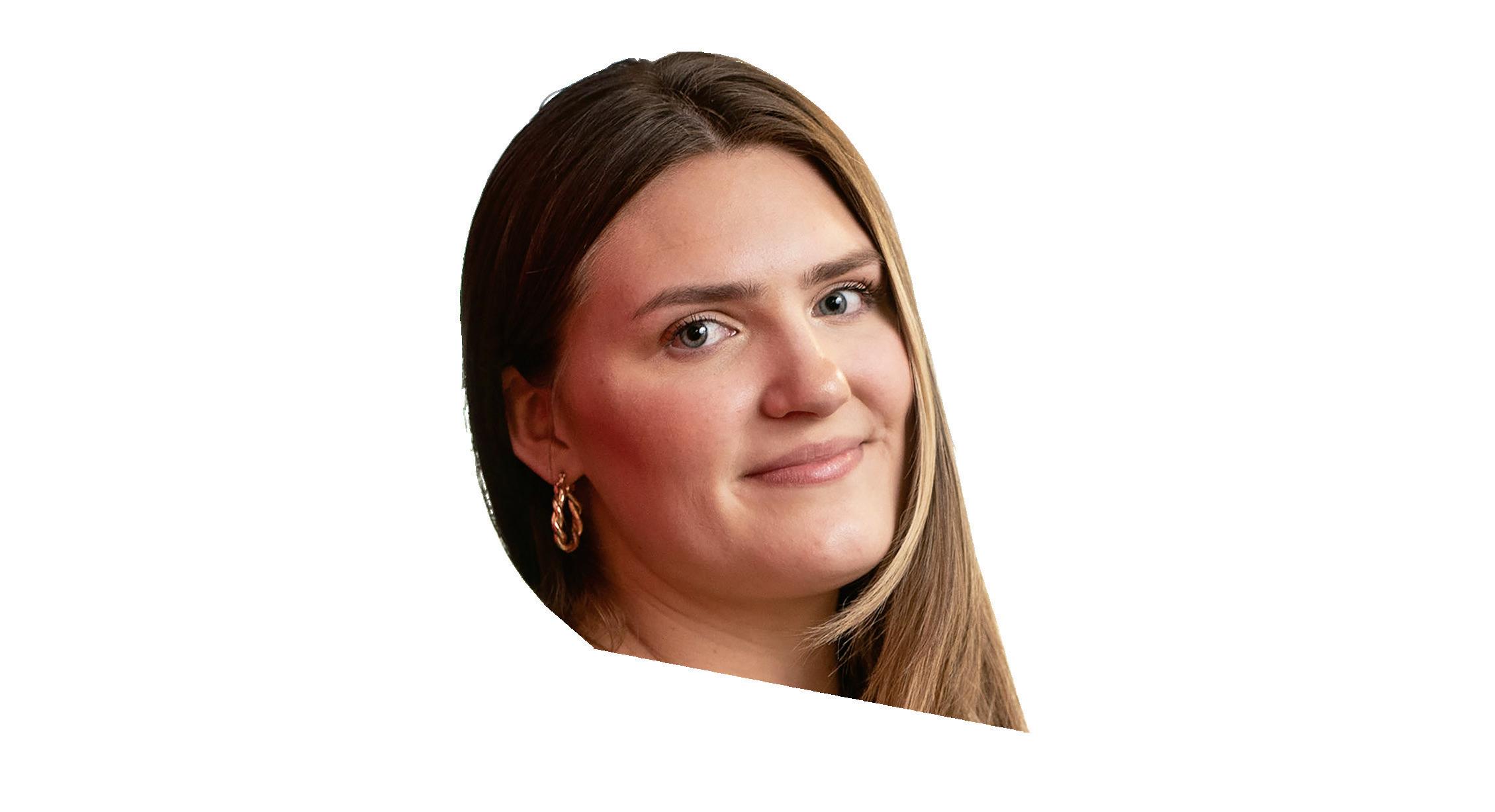
Maryville University is connecting with prospective students through a new app, ZeeMee. Current students like Cici Rindy serve as influencers, posting regularly to show what life is like as a Maryville Saint.
BY NANCY FOWLER
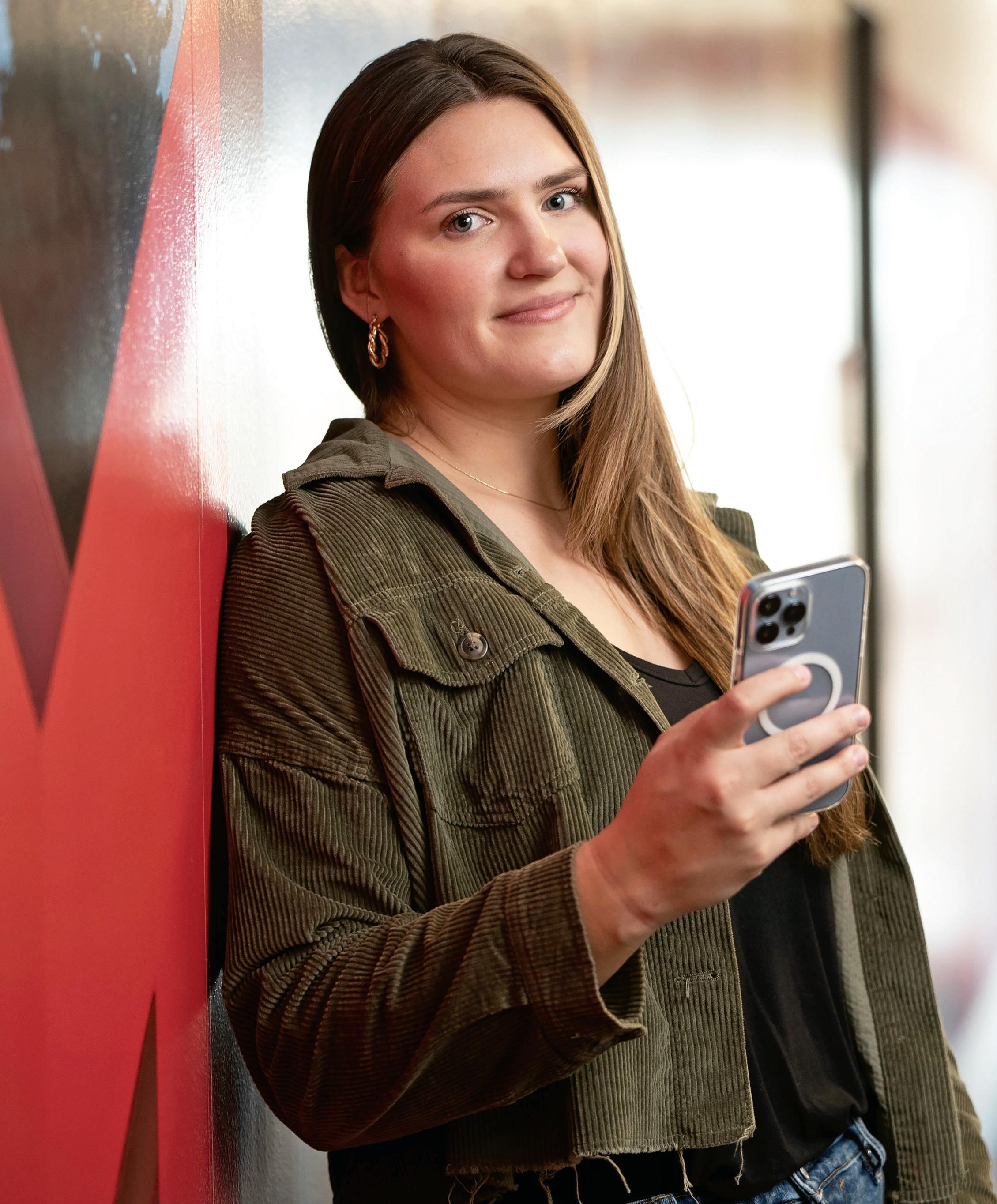
Plenty of Maryville students enjoy social media, and Cici Rindy is no exception. But Rindy devotes an unusual amount of time to these platforms — not in her personal life, but in her part-time job for Maryville. As Digital Engagement Specialist in the Office of Admissions, she oversees accounts such as Instagram, Facebook, Twitter and TikTok.
Rindy got the job through Maryville’s new apprenticeship program. Following a rigorous application and interview process, she was one of six students selected in 2021. Through the program, students earn academic credit, financial compensation and real-world experience without leaving campus. Apprenticeships are available in various University departments and, since its launch, the program has doubled in size.
For Rindy, who’s pursuing a bachelor’s in communications with an emphasis in strategic communication, the apprenticeship is a perfect fit. Most importantly, the position works well with her commitments as a member of the women’s basketball team.
“I never thought it would be possible to be able to have a job while being a studentathlete,” Rindy said. “But with this job, I can work from anywhere, and as long as I get it done, that’s what matters.”
One of Rindy’s accomplishments for the Office of Admissions is implementing a new social media platform called ZeeMee. It’s a virtual gathering place with a casual vibe for high-schoolers and other prospective students. Some participants join ZeeMee as early as eighth grade when they are first beginning their college search process.
“There’s nothing else like it,” Rindy said. “It really gives them a sense of what it’s like to be a student here.”
On ZeeMee, prospective students create profiles that can include photos and videos along with information such as their sports and other activities. The platform connects these students to each other while also connecting them with the University.
The platform provides several chats including a general chat for students only.
A handful of Maryville students — Rindy and four others — contribute to the University’s ZeeMee account as influencers. They create and share a variety of content such as videos about topics ranging from choosing a major to getting along with roommates.
Connecting prospective students with potential roommates is an important feature of ZeeMee. “Someone may post, ‘I’m an easygoing person’ or ‘I like to go to bed early’ or ‘I like to keep my room tidy,’” Rindy said. “And someone will then come back with, ‘Hey, I think we could be a really great match, here’s my Snapchat and my phone number.’”
By the time ZeeMee followers arrive on the Maryville campus, they’ll already have friends and an established community.
That’s perhaps even more important during a pandemic when it may be more difficult to meet people. “And if you come to Maryville even knowing just one person, you’re more likely to go to a game or some other event,”
Rindy said.
ZeeMee benefits not only students but also the University. The platform allows Maryville admissions professionals to see more sides of a prospective student than an application can provide. It could also help with student retention, Rindy said. She explained a chief reason students leave college is that it’s not what they expected.
Getting to know a school through ZeeMee, “means a lot fewer surprises,” she said.
STAY CONNECTED. maryville.edu/magazine
Since September, Maryville has garnered more than 2,200 ZeeMee followers. The platform is yet another way the University pays attention to each and every applicant, Rindy said.
“Our admissions counselors genuinely want to get to know prospective students and their families and find out what they want in a school to make sure it’s a good match,” Rindy said.
Rindy “dove headfirst” into her job, according to Assistant Director for Campus Visit Experiences Lacey Norman. She said Rindy has an infectious enthusiasm. One chilly day in January, the Wisconsin native coaxed Norman and other staff members outside to dance for TikTok videos. “We were all cracking up,” Norman said. Even when not on campus, Rindy is often on the job, according to Norman. “She’ll clock in for an hour to edit content while she’s riding a bus to her basketball game,” Norman said. “She’s very committed.” Rindy graduated in May and plans to pursue a master’s degree. But first she wants to take advantage of opportunities offered by an open job market.
“I want to get that real-world experience that will help me narrow down exactly what I want to get my master’s in,” Rindy said. “No matter what, I want to have a job where I can switch things up, not sit in an office doing the same thing every day.” Wherever she ends up, Norman is betting on Rindy to do great things. “She definitely has the drive and the initiative to get things done and plan things out,” Norman said. “She’ll be successful at whatever she does.”
Maryville nursing students benefit from a wide range of real-world experiences that Assistant Professor of Nursing Demetruis M. Leonard, MSN, RN, ’13, brings to the classroom. | BY CONSTANCE GIBBS
From a young age, Assistant Professor of Nursing Demetruis M. Leonard, MSN, RN, ’13, knew she wanted to be a nurse. For more than 25 years, she has carefully and thoughtfully climbed the nursing career ladder.
Leonard’s first step was to serve as a certified nursing assistant shortly after graduating from high school. It didn’t take her long to take the next step to become a licensed practical nurse. Then, to satisfy her “nursing nerd” craving, Leonard joined the U.S. Army in 2000.
“I wanted to see what it was like to be a nurse in the military,” she said. “I had no idea that 9/11 was about to happen and that I would actually go to war, or that it would end up being the best part of nursing I’ve ever experienced in my entire career.” Leonard was deployed to Mosul, Iraq, as part of the 21st Combat Support Hospital. The unit was responsible for setting up the first field hospital, turning an open field of shoulder-height grass into a complex health
care facility. Leonard provided health care for American soldiers and for detainees of interest to U.S. national security in the intensive care unit. Her deployment lasted 12 months.
“We were such a close-knit family, even though we were in Iraq during such a dangerous time,” Leonard said. “I saw so many tragedies. And we were bombed every night. But we put everything aside to be selfless and care for our patients. We still had to do our jobs.”
When Leonard returned to civilian life, she desired to continue her career in the ICU. She went back to school again, this time to obtain an associate degree to become a registered nurse. Later, she completed her bachelor’s degree in nursing at Maryville University. She then jumped across town to Webster University to complete her master’s degree in nursing because — at the time — Maryville didn’t offer the academic program she needed. (That has since been remedied. Today, there are five distinct MSN programs offered through Maryville Online.)
Most importantly, Leonard advanced her nursing career while raising four children, including the ultimate sacrifice of leaving her children behind during her deployment. Her youngest, a freshman in high school, has yet to fly the nest.
“I always wanted to set the example for my young African American children that we can do anything that we set our minds to,” she said. “I’ve always set the bar high because my children are following in my footsteps. I have to be that role model my children can look up to because this world is not always kind. Because for children of color, there’s not always that role model in their lives that they can do it. So I want to show my children it can be done.”
In 2018, Leonard joined the nursing faculty at Maryville. She teaches health assessment, where first-year students learn how to obtain a health history and complete a physical examination, and psychiatric mental health, where third-year students learn how to care for and manage patients with mental health diagnoses.
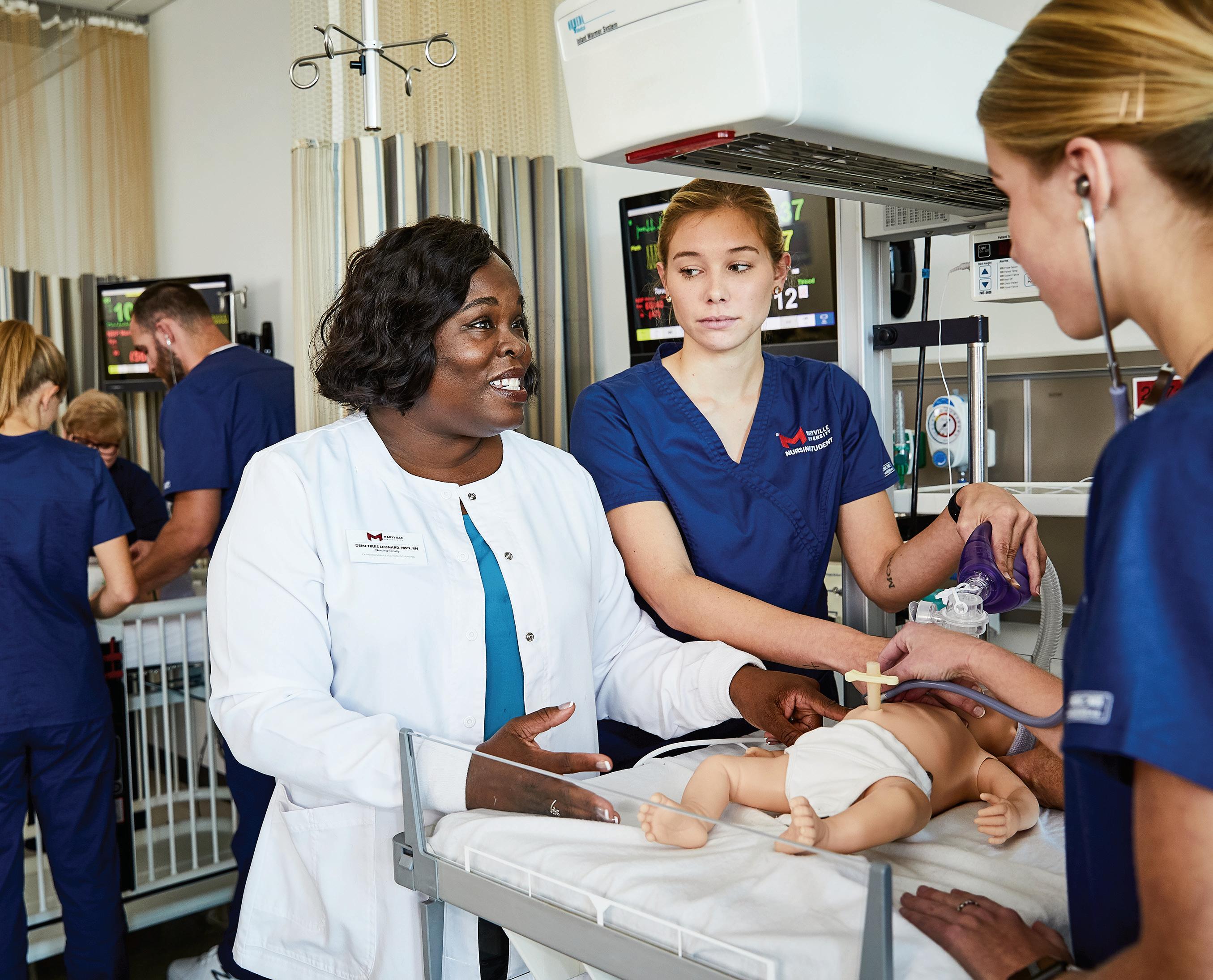
“It’s rewarding to work with students at the beginning of their journeys, when they’re fresh and ready, and then work with them again during their junior year,” Leonard said. “I get to witness their transformation and see how their skills and confidence have grown. They come to my mental health class saying, ‘We’ve made it to your class!’”
Now, Leonard is pursuing her doctorate in education through Maryville University’s
online Doctor of Education in Higher Education Leadership Program. “This was my final goal,” she said. “I’ve done so much hands-on work with nursing that now it’s time for me to teach others what I know.”
Leonard’s real-world expertise has been especially beneficial for Maryville nursing students during the pandemic. The emotional and physical toll faced by health care workers over the last two years is immeasurable. But thanks to faculty like
Leonard, Maryville nursing students are able to persist in their academic studies rather than take a step back.
“Nurses don’t stop,” Leonard said.“Our students understand how important their jobs are and they’re going full force ahead. They’re very proud to have attended clinicals and cared for patients throughout the pandemic. They’ve shown incredible perseverance and continue to put forth their best effort every day.”
A recent exploration helped Maryville students learn how storytelling leads to deep engagement with complex scientific concepts.

“Who has heard of an exoplanet?” says David Ibbett, a composer with a passion for science. His question stumps the classroom of Maryville students gathered for his guest lecture.
“Exoplanets are planets outside our solar system,” he continues. “Can anyone guess how many exoplanets have been discovered?” Stumped again, Ibbett proudly shares the number: 4,843, the last time he checked. “We’re living in the middle of an exoplanet revolution!” he exclaims, his unabashed enthusiasm spreading among the students.
Ibbett then describes how he turns exoplanet data into music. Since exoplanets are hard to see directly with telescopes, astronomers study these planets by measuring how a star’s brightness decreases when an exoplanet passes in front of it.
“You can split that decreased light — or shadow — apart within the electromagnetic spectrum, which creates a pattern,” he says. “I take that pattern and translate it into sound, mapping the curves and dips of the waves to musical notes.”
Ibbett turns to his piano and plays an original song, a moving piece that turns the complex astrophysics into something the students can appreciate.
“I’m trying to communicate the science, but I also want to communicate the emotions and what the science means to us: how it’s inspiring and what it tells us about our place in the universe,” Ibbett said. Some exoplanet data suggests the presence of life on these planets.
The science lesson and live performance are part of an innovative Bascom Honors Program class titled Storytelling in the Sciences, taught by Vaughn Anderson, PhD, assistant professor of English. The class focuses on the intersection of science and the humanities. “Specifically, we look at how science depends on storytelling and what science in turn can tell us about how storytelling works,” Anderson said.
Students first looked at mythology and how myths help us to understand the natural world around us. They then dove into neuroscience and how the brain responds to storytelling. They learned from neuroethicist Geoffrey Holtzman, part of Boston University’s Center for Antiracist Research.
Another unit explored the paleontology boom of the mid-1990s following the release of the original “Jurassic Park.” The increased public interest led to increased budgets for paleontology research and projects.
Students even read the novel “Raptor Red” by paleontologist Robert T. Bakker, which is told from the point of view of a velociraptor. The book sought to dispel the perception of predators as evil and instead portray them as creatures to be admired.
A different unit examined the relationship between science and science fiction. Special guest lecturer for that week was Associate Professor of Biology Kyra Krakos, PhD, a self-proclaimed “sci-fi nerd.” It also included a viewing of “The Martian” starring Matt Damon. The film follows an astronaut who

becomes stranded on Mars and finds a way to survive the hostile environment. While the scenario is fictional, many scientific concepts in the movie are real.
Students spent the second half of the class putting together their own popular science projects. Projects included websites, social media campaigns, podcasts, videos, short stories and even a 200-page novel.
“I told students that the only thing they couldn’t submit was a traditional essay,” Anderson said.
The projects still required comprehensive research so that each student became an expert in their chosen topic. They were then charged with presenting their data by using storytelling elements, including plot, character and setting.
“My goal was to have students make a topic not just understandable, but also appealing and entertaining to a general audience,” Anderson said. “I wanted to show students that you can do things with your writing. Writing isn’t just something that you turn in to your professor.”
Emilee Hector, who is studying physical therapy, shared the effects of Alzheimer’s disease on the brain through a series of short vignettes. Hector used first-person narrative to drive her writing. Each vignette was told by a fictional Dr. Berk, a geriatric physical therapist.
“I thought of myself when writing the main character because I want to go into physical therapy to help these types of patients,” Hector said. “Both my grandparents passed
away from Alzheimer’s disease, so it’s a topic close to my heart. I essentially wrote what I want to see in my daily life after I become a physical therapist.”
Hector also enjoyed how the class was discussion-based. “I liked it because I never knew what we were going to talk about,” she said. “One week we’d talk about dinosaurs, the next about horror movies, and then we’d end up on music. It was a lot going on, but it was always interesting. And it was fun to see what Professor Anderson brought to the conversation because he always openly shared his opinions and experiences with us.”
For her final project, first-year student Emma Winkeler created a collection of short stories that discussed the positive effects of movement for people recovering from serious accident or injuries. Her characters included a teenage baseball player with a broken kneecap and a middle-aged man who suffered a stroke.
Winkeler is part of Maryville’s Pre-Occupational Therapy program and understands the benefits of strengthening the mind and body. Before arriving at Maryville, she worked at an assisted living facility where she provided crucial support to residents during the pandemic.
“Before this course, I had never written a story before,” Winkeler said. “It was so fun to write! I didn’t mean for my final project to be [18 pages] long. But once I got into the writing, I enjoyed it so much that I just kept going.”
For students like Winkeler, the course also helped prepare them for their future careers in science-related fields. “This class helped me realize that as an occupational therapist, my patients won’t always have the same knowledge that I do,” she said. “I need to present information in a way that they understand so they’re not confused or scared, and that they understand how treatment will help them.”
“I’M TRYING TO COMMUNICATE THE SCIENCE, BUT I ALSO WANT TO COMMUNICATE THE EMOTIONS AND WHAT THE SCIENCE MEANS TO US: HOW IT’S INSPIRING AND WHAT IT TELLS US ABOUT OUR PLACE IN THE UNIVERSE.”
Winkeler said she’s grateful to have experienced Maryville’s Active Learning Ecosystem during her first semester on campus. The Storytelling in the Sciences class set the stage for future active learning opportunities.
“The first few weeks of class I was hesitant and not sure the information was up my alley,” she said. “But now, I’m so glad I took this class. It wasn’t a normal humanities class where you read literature and respond. This class was so fun and engaging, and very different than any other class I’ve ever taken before.”
BY EMILY KARCHER


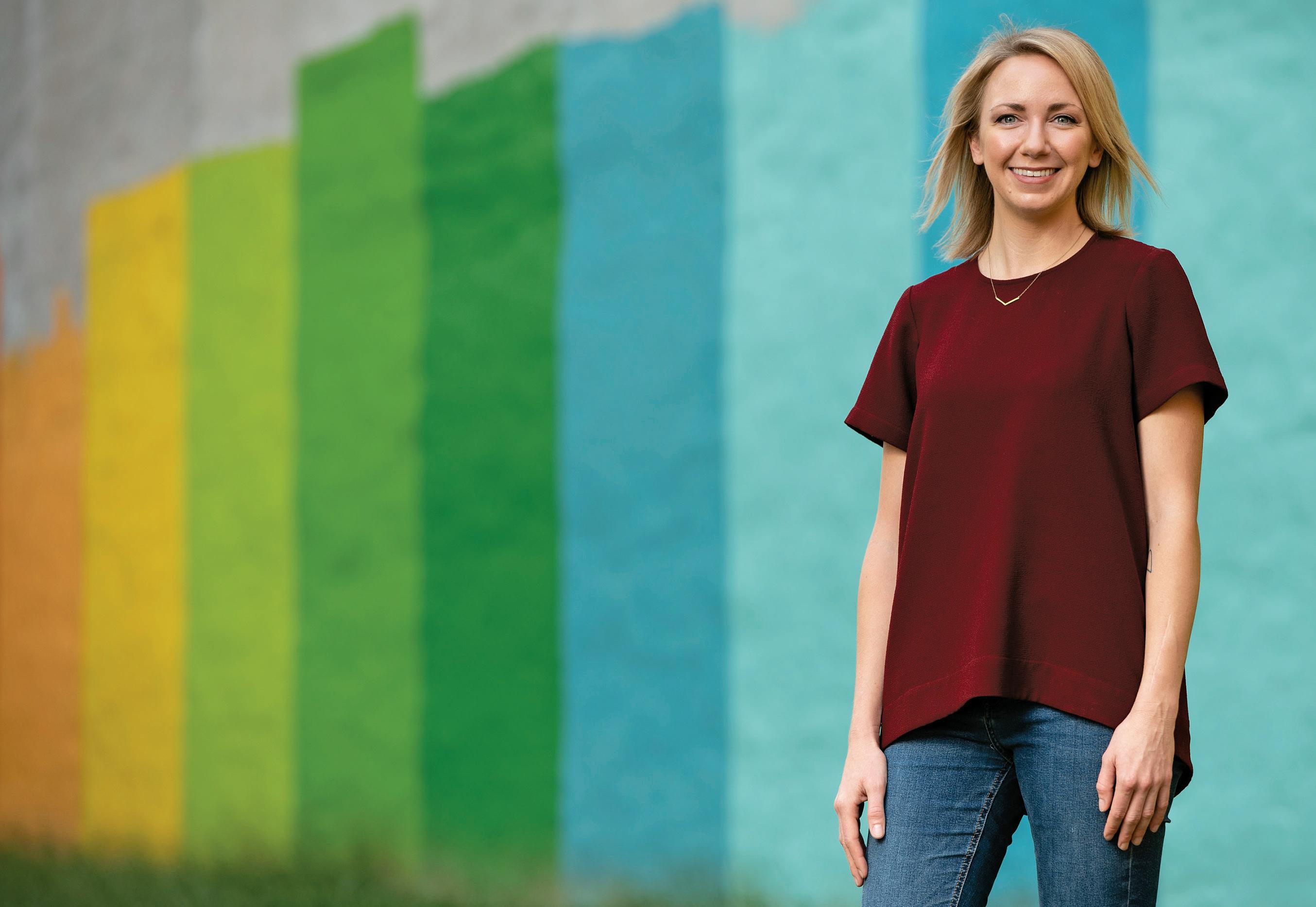
Samantha Lee Smugala, ’12, is reimagining and redeveloping unused plots of land into beautiful community spaces.



Running along Washington Avenue in downtown St. Louis in the fall of 2020, Samantha Lee Smugala, ’12, was struck with inspiration. “Wash Ave was barricaded off to cars, and I was able to see it in a completely new light,” she said.
“I saw so much opportunity to create activity because no one was out and businesses were suffering. I could see what a huge weight the pandemic was on the city.”
Smugala’s idea took shape into Pocketparks, a nonprofit seeking to develop small, underutilized parcels of land to provide communities with beautiful recreational areas. “We want to integrate into the urban community and bring vibrancy back to downtown,” Smugala said. “St. Louis is an underrated city with such potential. There’s a lot going on here, and I hope Pocketparks can help inspire St. Louis pride and join forces with other organizations hoping to do the same.”
After identifying land and communicating with landowners, work shifts to community engagement. By spending time in the space, greeting members of the community — both individuals and businesses — and encouraging them to share ideas for the space, Pocketparks aims to fill community gaps and incorporate solutions into their designs. Once parks are finished, the organization plans to return and assess its impact.
“We want to give each space a purpose, whether it’s playing a sport, spending time with your pet, using a giant chess set or simply providing an outdoor dining and work space,” Smugala said. “Creating parks that are beautiful but don’t serve the community’s needs would be a disservice.”
Each park will also feature rotating artwork by local St. Louis artists. Signage will include QR codes for additional information and continued learning in the parks. “Art has the power to transform the look of an entire block,” Smugala said. “Instead of seeing a vacant lot, which is dreary and doesn’t feel very safe, residents see a welcoming space that they want to enjoy.”
“Creating parks that are beautiful but don’t serve the community’s needs would be a disservice. ”
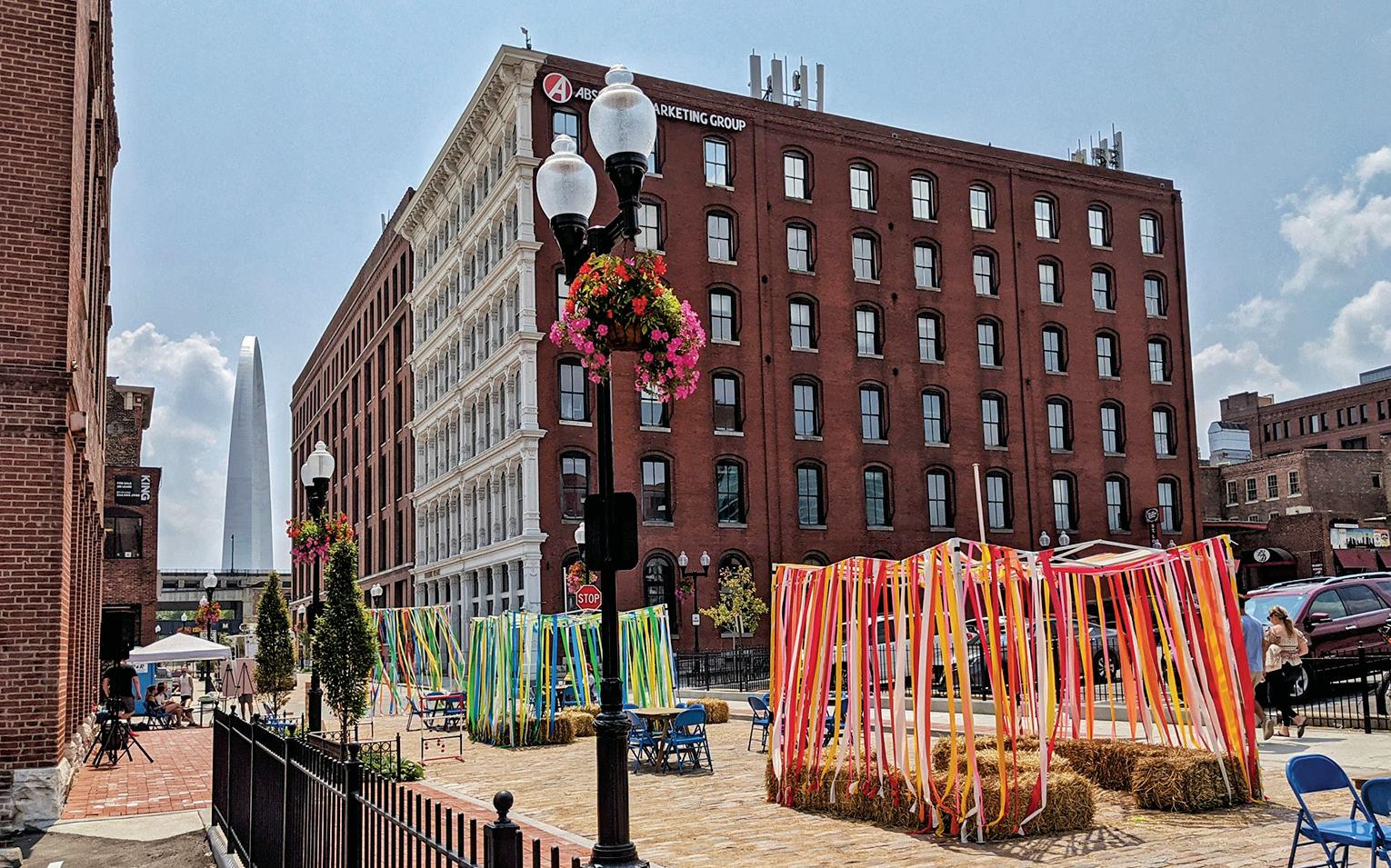
The organization’s first project, the DUC Park, is located in downtown St. Louis on the corner of 10th and Locust streets. To create the park, the lot was cleaned and pet waste stations were installed, allowing the grass to flourish. A color spectrum wall mural was painted, featuring bright shades of coral, turquoise, yellow and lime green. Plans are underway for adding picnic tables and sunshade sails, and bringing food trucks and acoustic bands into the space. Other projects include spaces in the Laclede’s Landing riverfront district, the West End, and near the innovation hub and technology district Cortex. The last location features a sunflower field. The small scale of each park makes them easier and quicker to plan, fund and develop. That flexibility is imperative for addressing the needs unique to each park’s immediate area.
Smugala credits her drive to turn Pocketparks from an idea into reality in only eight months to her lifelong love of learning, which began at Maryville. “Some see school as learning tasks, but I felt it was about learning a mindset, a way of thinking that allowed me to be successful at whatever I wanted to do,” she said. “That curiosity was encouraged by my professors.”
Smugala maintains her curiosity by teaching at Maryville as an adjunct professor for interior design. “I started teaching because I love design and sharing my passion with people,” she said. “Design isn’t just an outcome; it’s a tool you use. It’s not just a product; it’s a process.”
Select interior design students have the opportunity to work with Smugala on an upcoming Pocketparks project in Hyde Park, a historic North St. Louis neighborhood. The collaboration is part of Maryville’s new Design Ambassadors program, which is funded by a grant from the Angelo Donghia Foundation.
Smugala’s passion for learning and connecting with others has created enormous value: from creating Pocketparks, to helping students at the outset of their careers, to being inspired and challenged herself.
“I’m an interior designer who went outside, and now I feel like I’m the character Leslie Knope from ‘Parks and Recreation’ who was always working to improve her hometown,” she said. “I’ve always wanted to bridge my skill set with public impact work. Public space is the space that we all share. It’s accessible to everyone, it impacts the most amount of people and it gives the city its personality. Now my efforts aren’t just for one client and in one space, it’s for the entire community.”
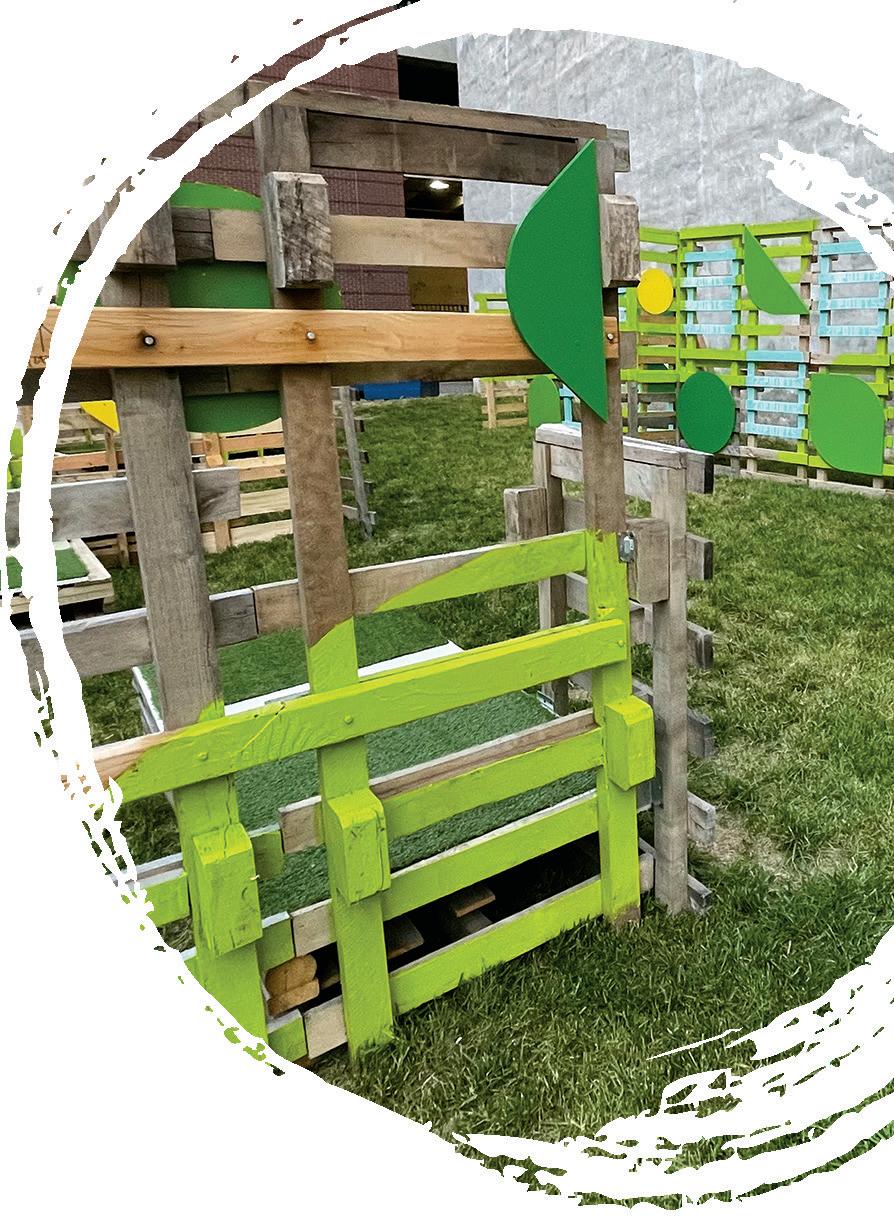
We celebrate the Maryville community members who fostered incredible progress and change during the past century and a half.

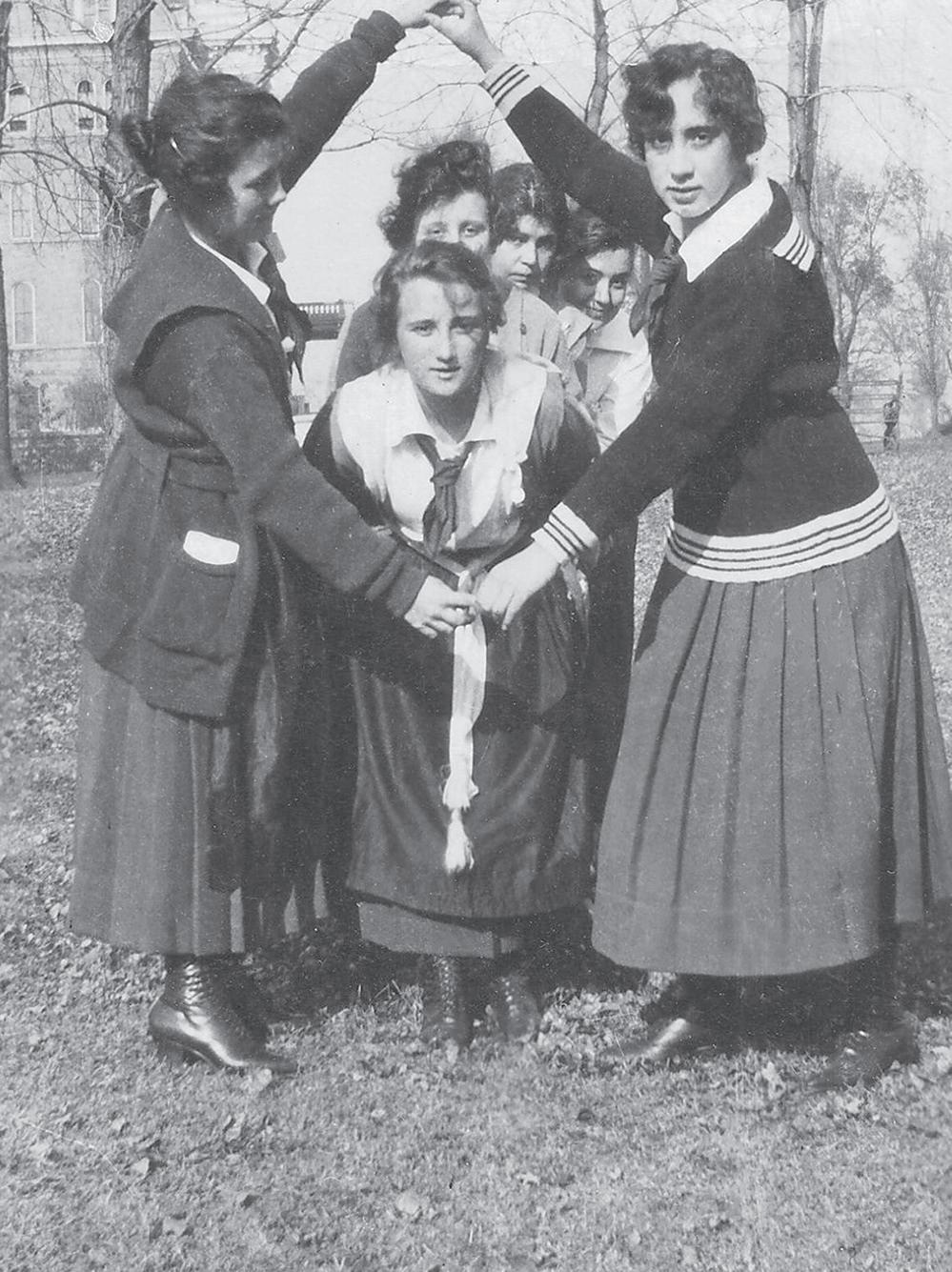
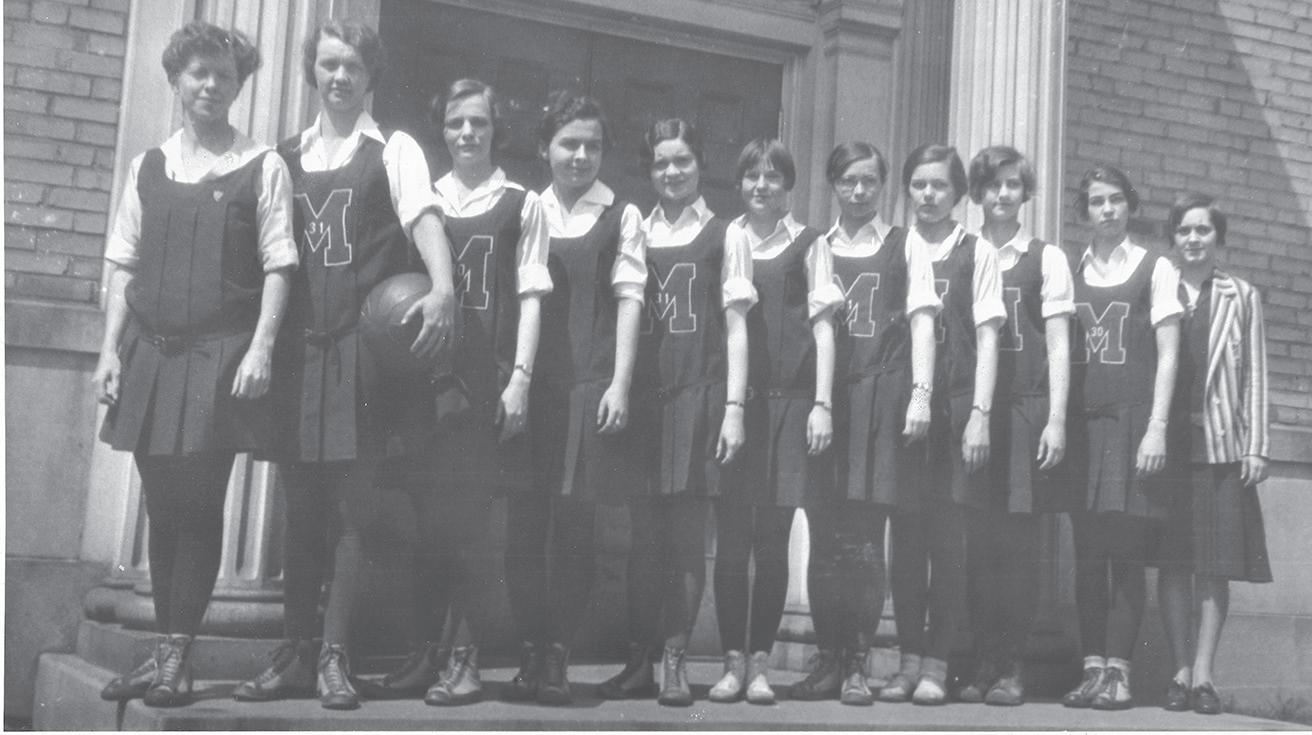
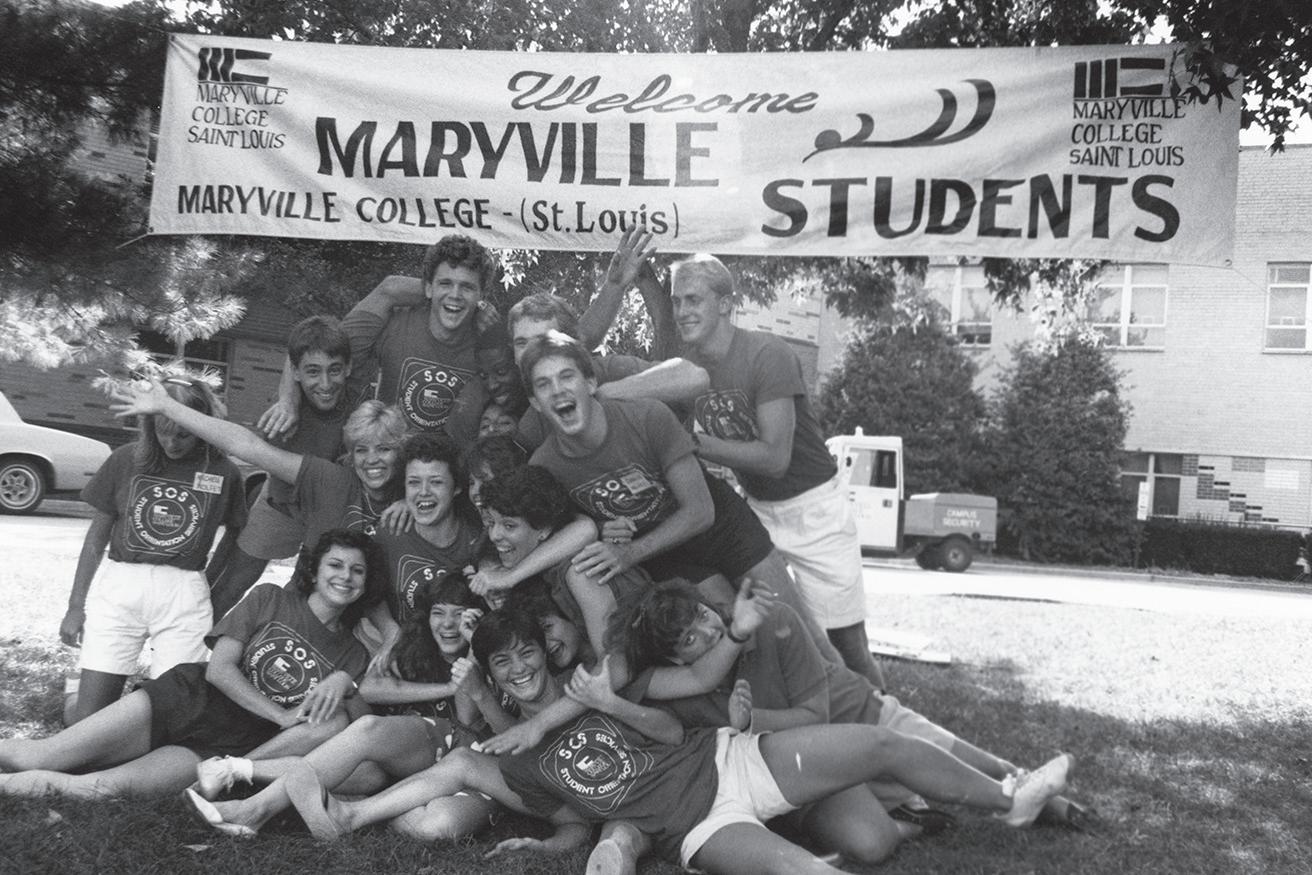
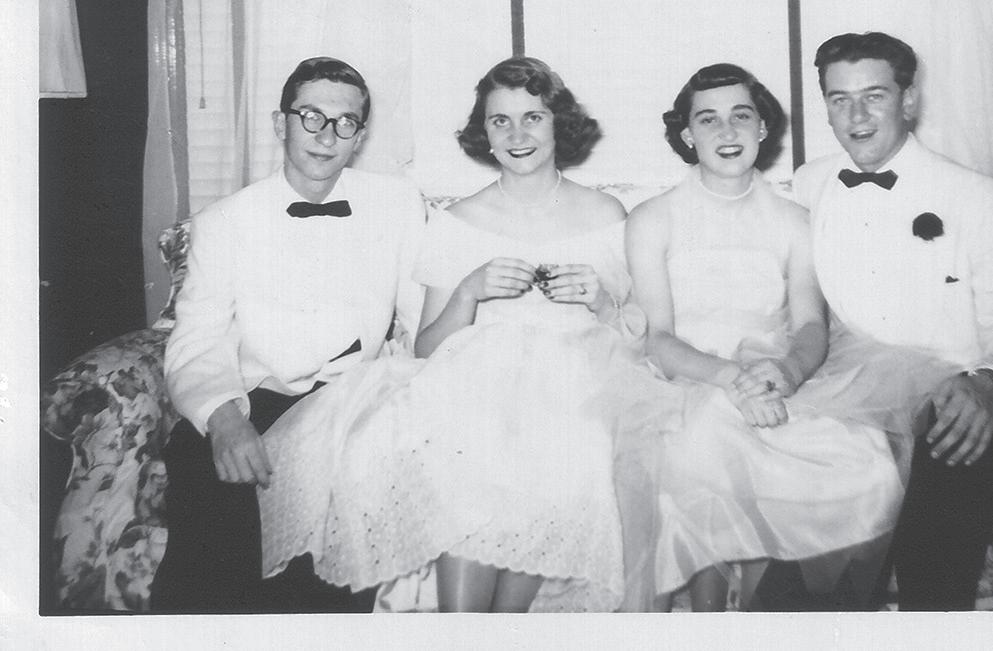
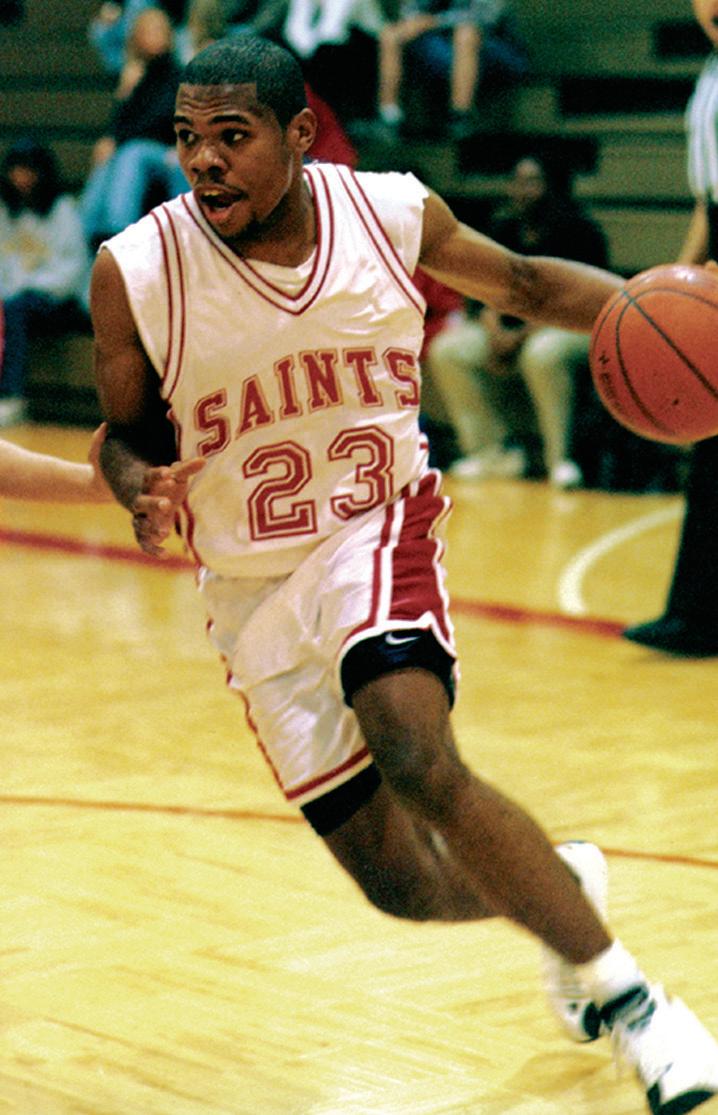
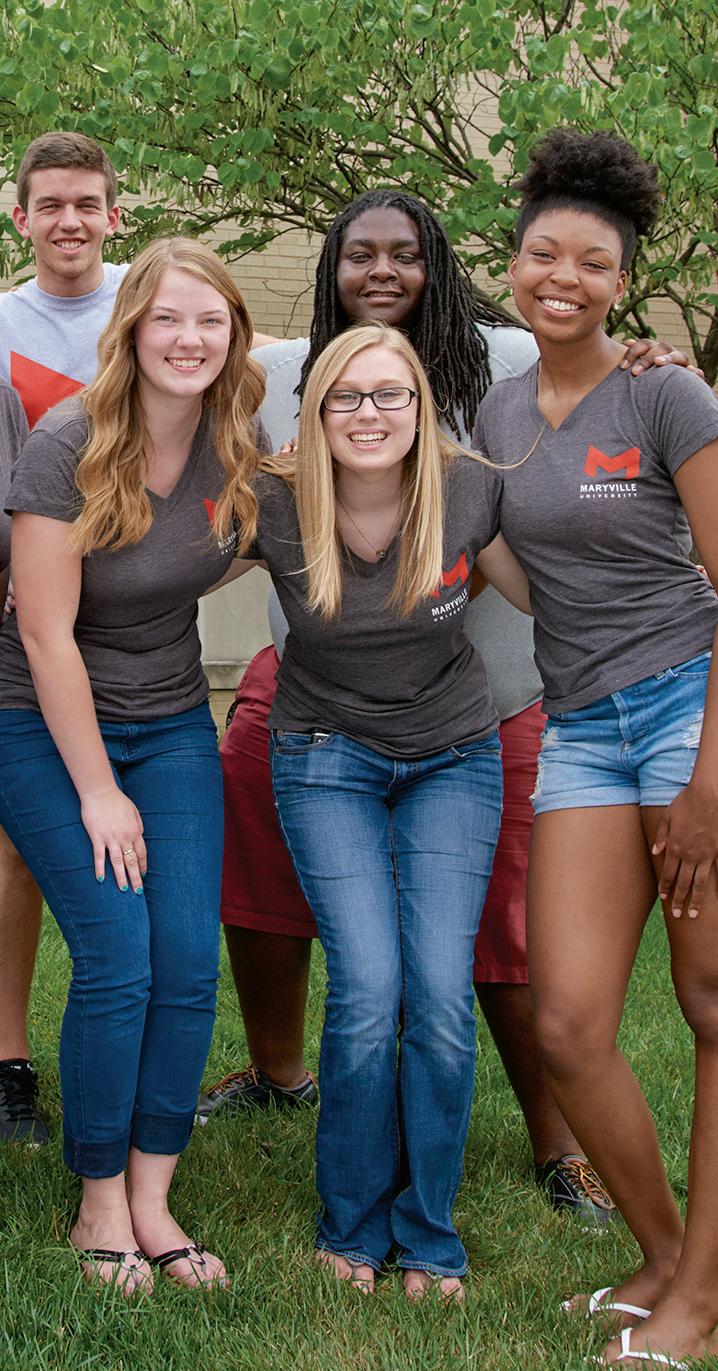
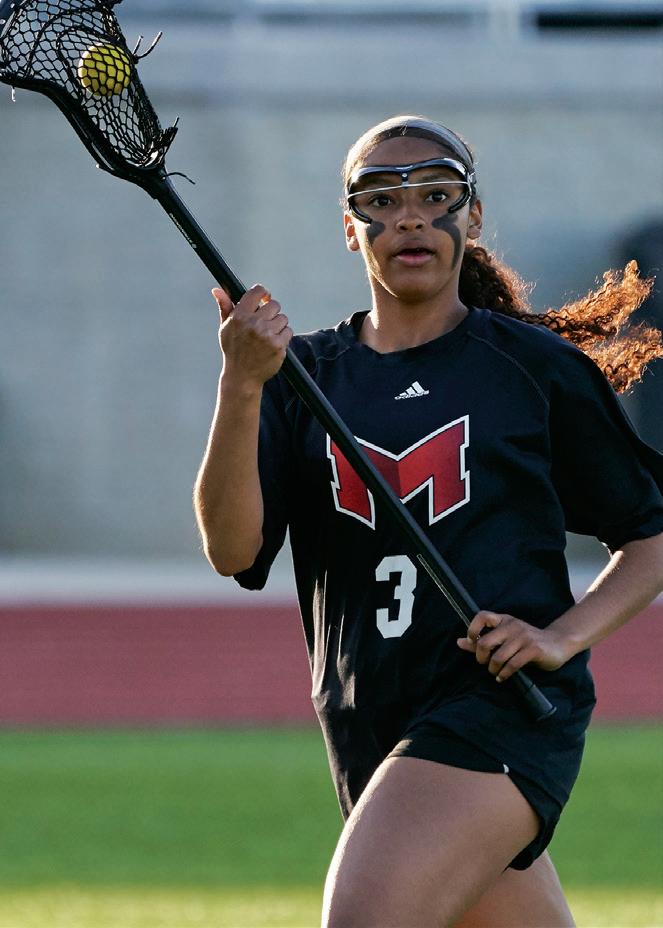

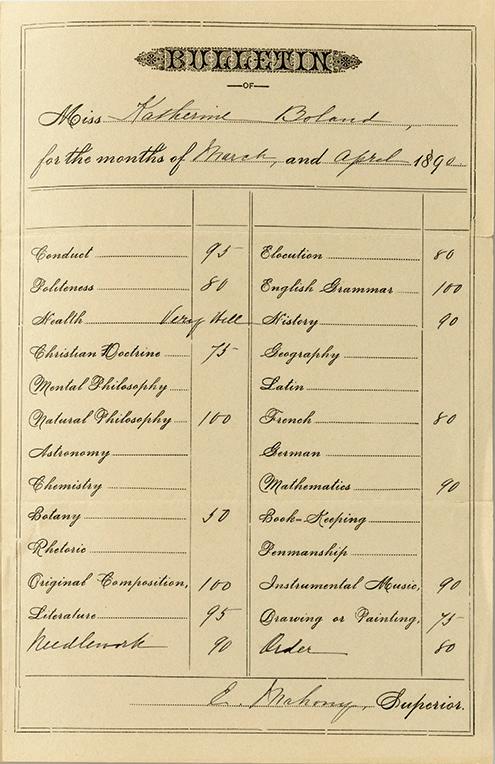
The year 2022 marks the 150th year of Maryville’s rich and storied history. It’s impossible to capture all that Maryville has accomplished in 150 years. That’s why we decided to reflect on the life, education, innovation and commitment to excellence of the entire Maryville community through pictures, quotes and words in a special coffee-table book titled: “Maryville University: 150+ Years.”
The book is a three-year effort and represents an enormous amount of diligence and detail. Its pages feature photographs, quotes and narratives gathered from interviews with hundreds of Maryville community members, including alumni, faculty, staff and students. We salute all the people who worked so long on this project. It was and will remain a labor of love for all those who contributed.
As always, our greatest debt goes out to the Religious of the Sacred Heart, whose vision, passion for education and commitment to innovation guide us today. We are proud to continue their legacy and tradition. Built upon that heritage, Maryville has positioned itself for monumental growth and revolutionary leadership in the next 150 years.
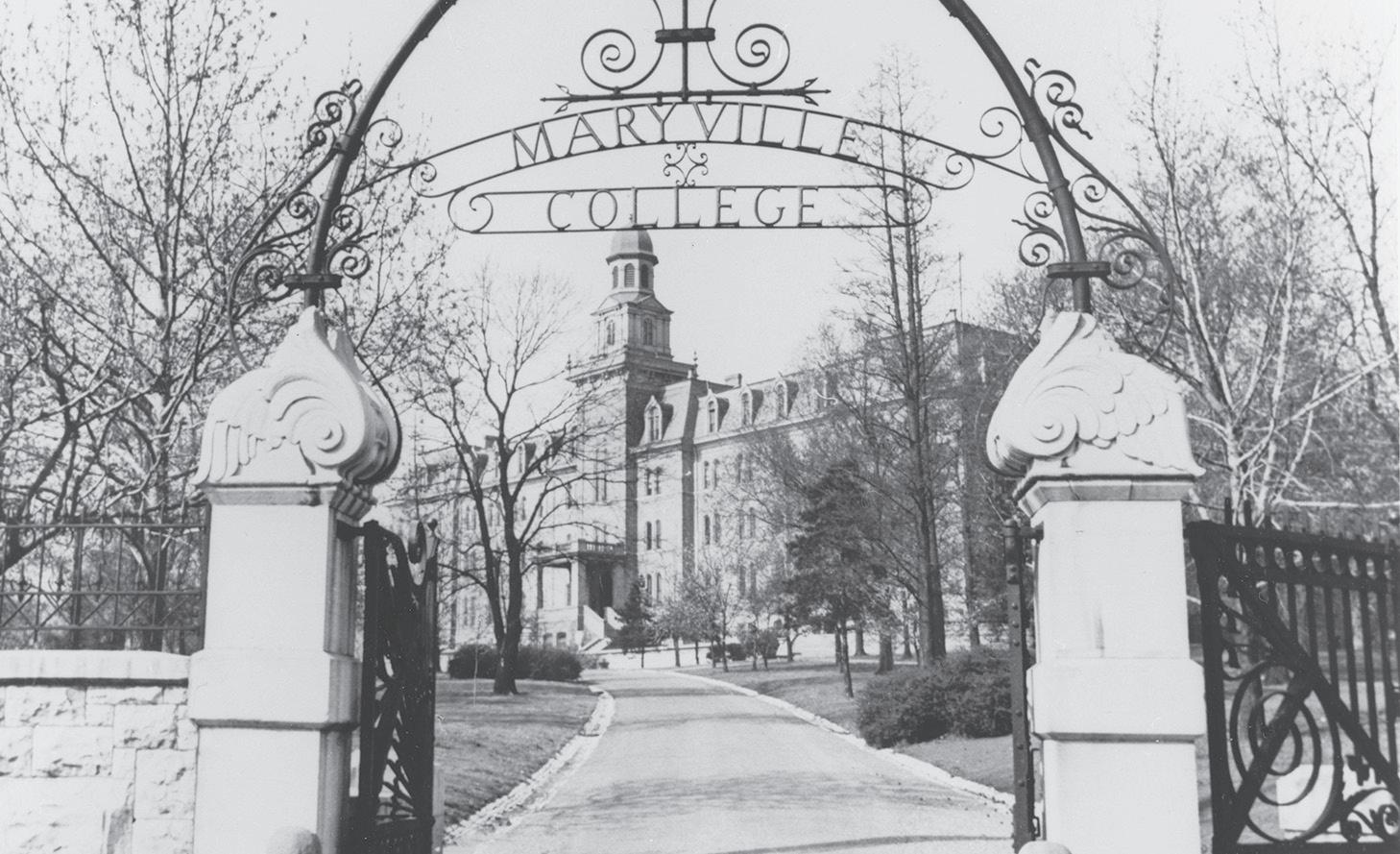
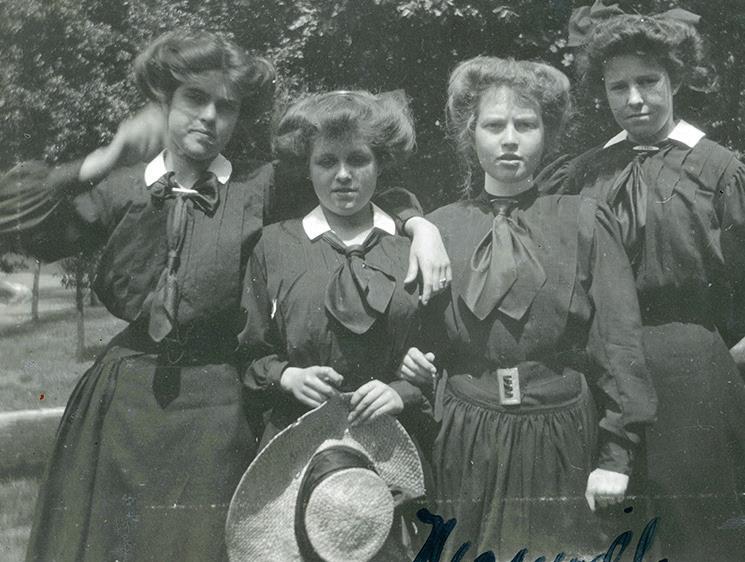
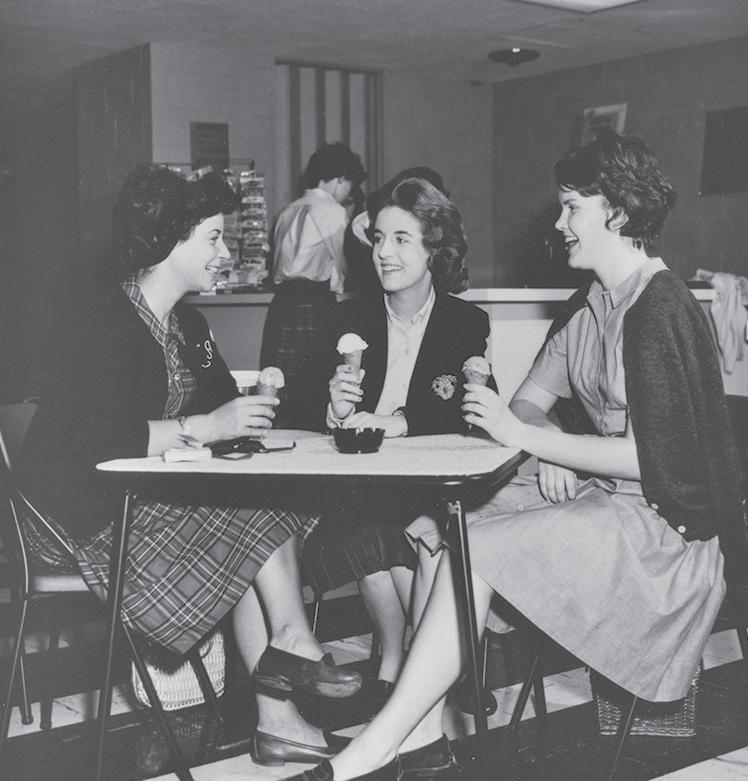
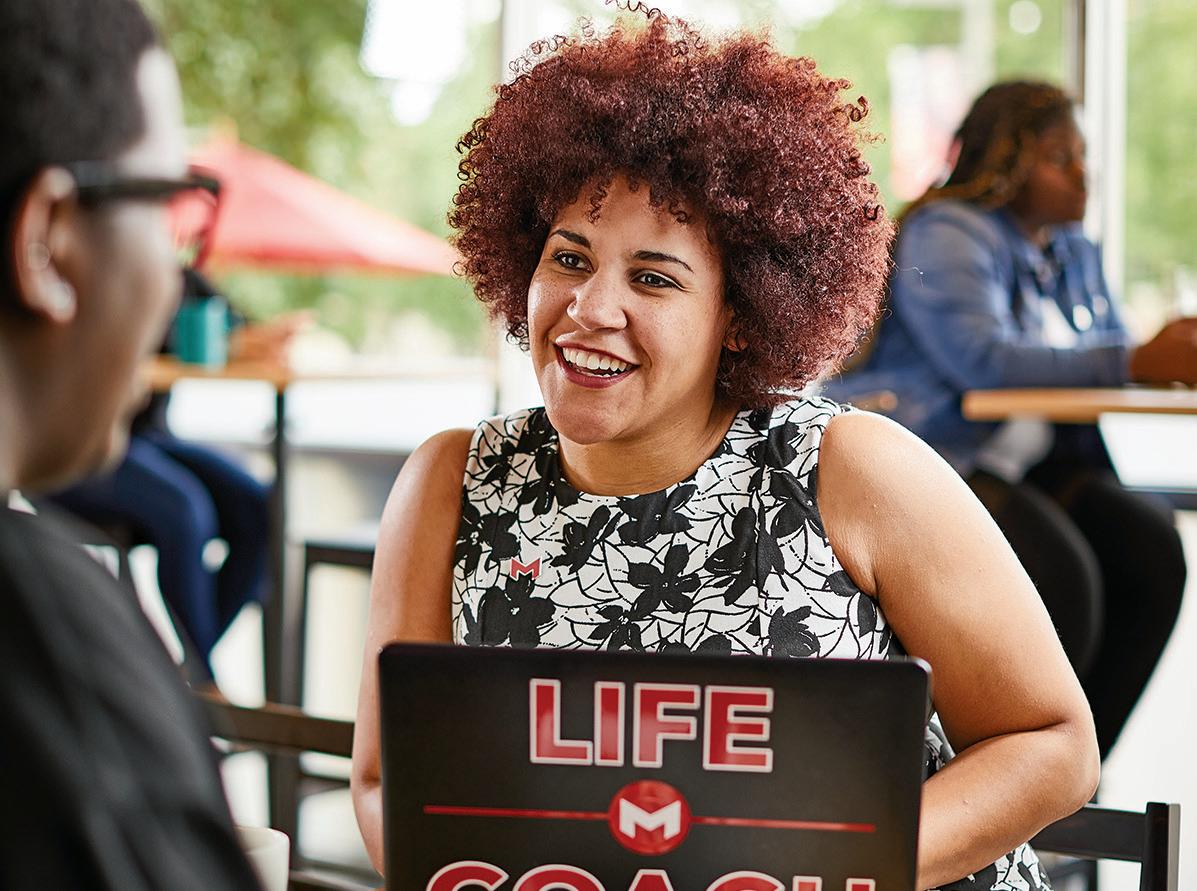
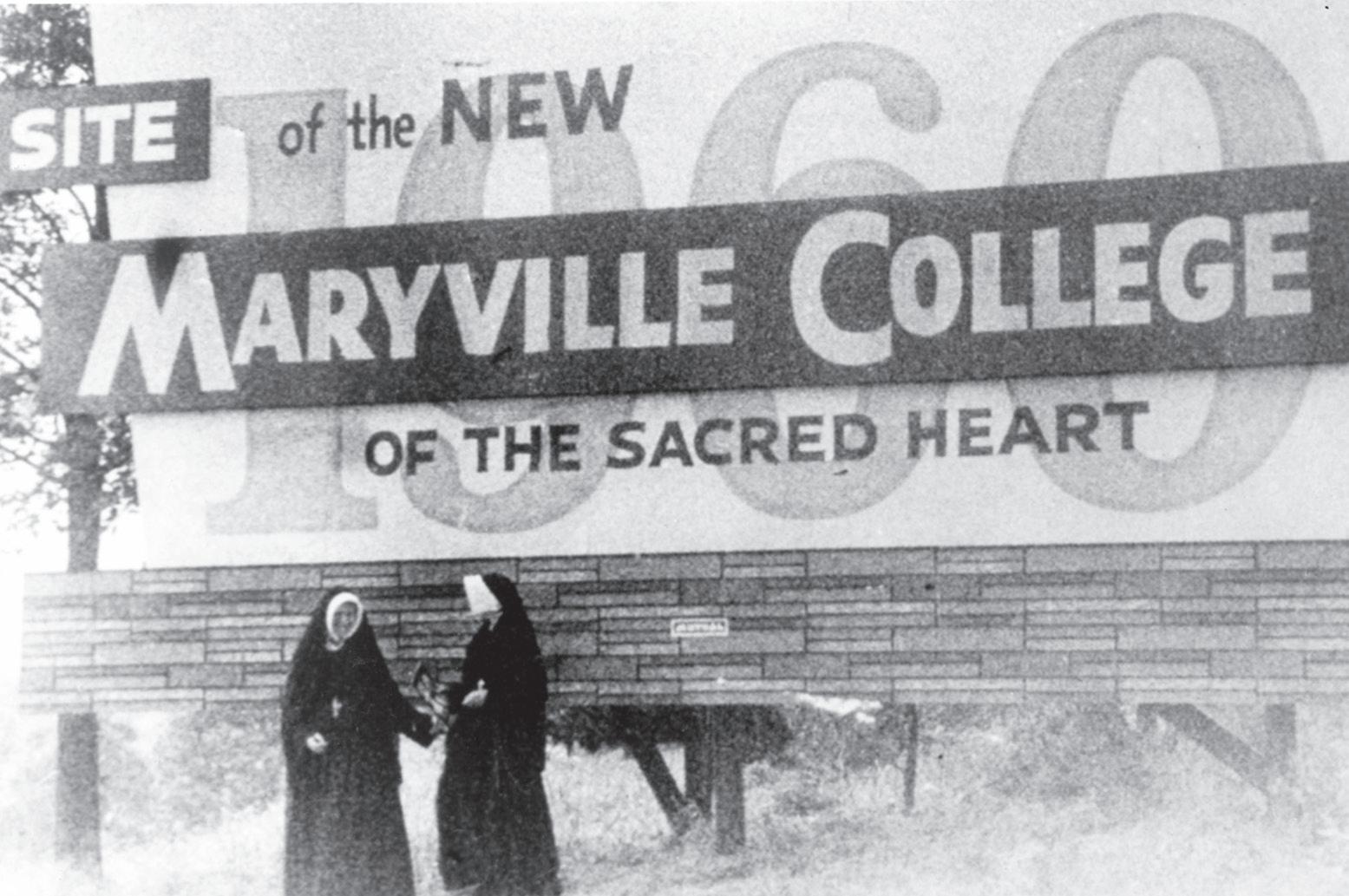
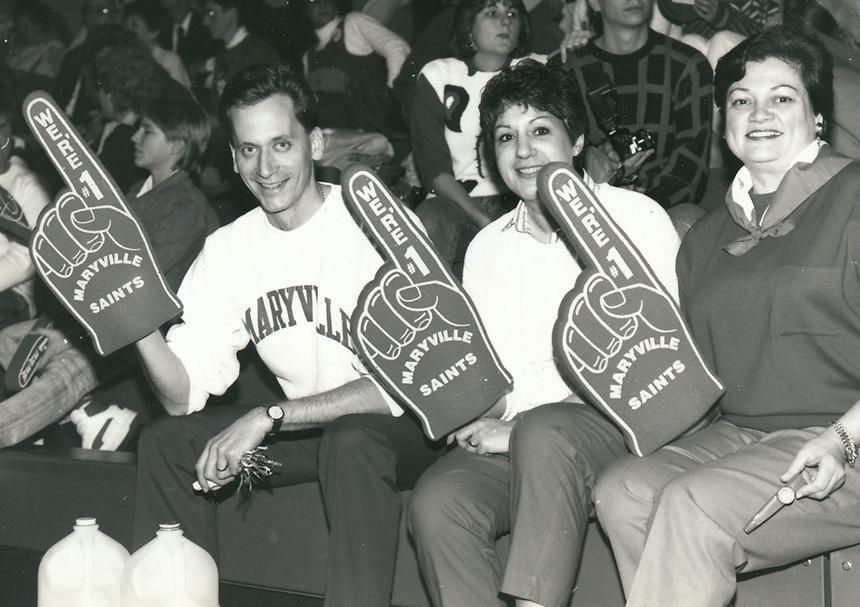
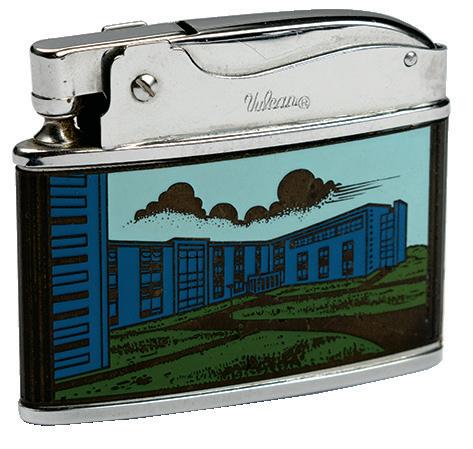
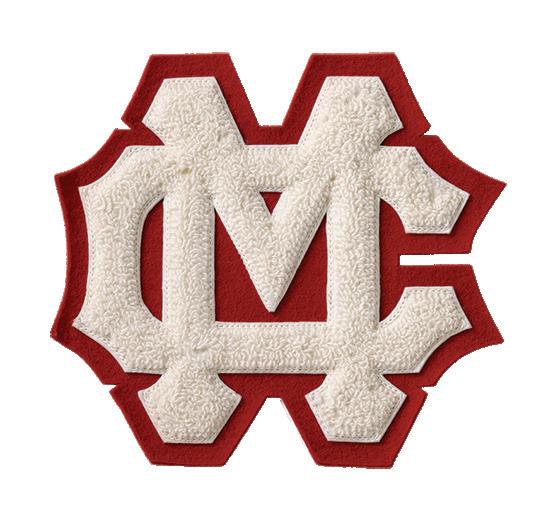

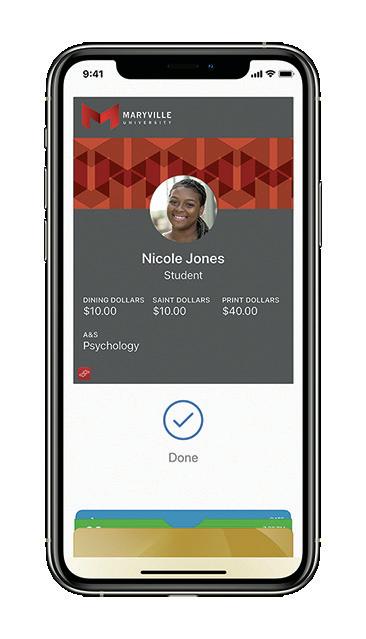
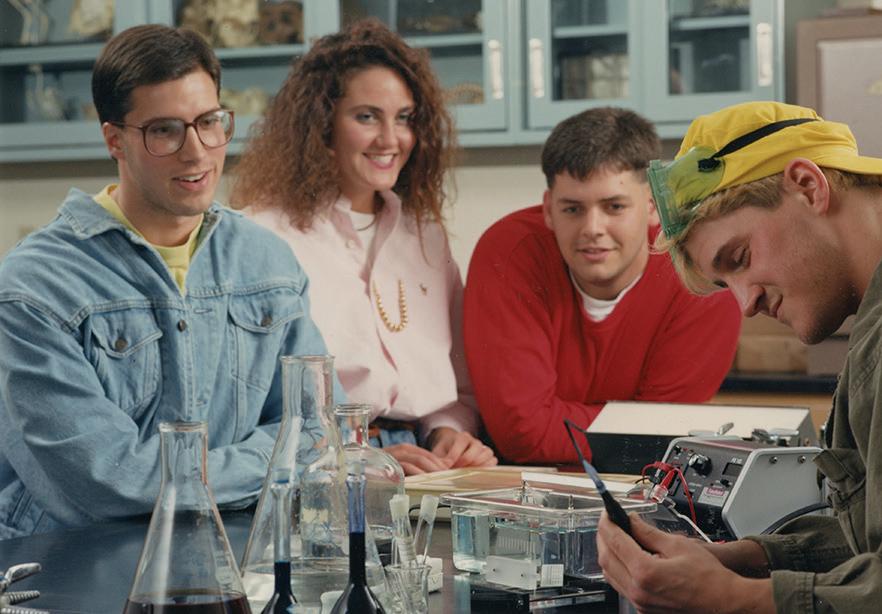
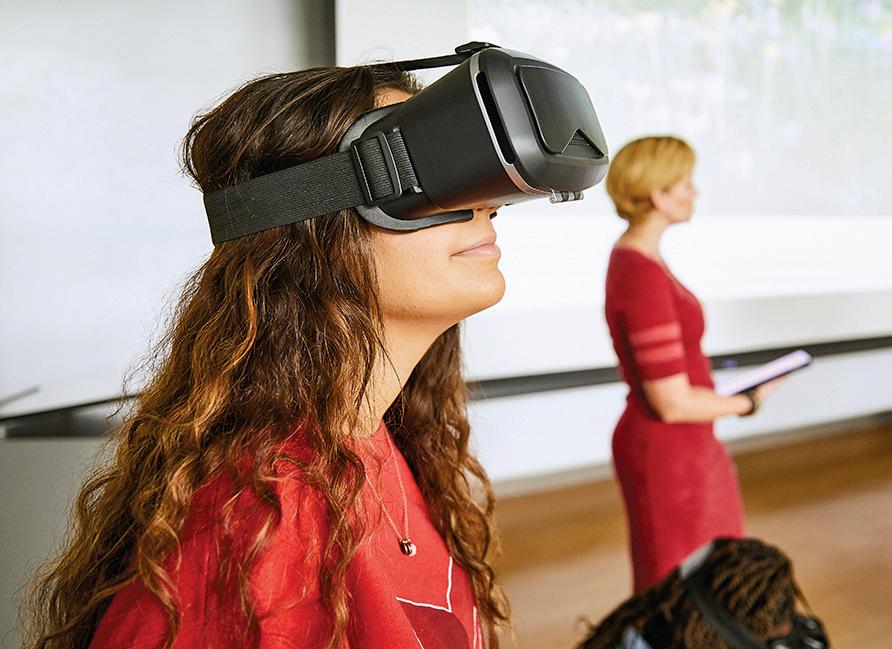
If Maryville were a person, I would say it would be my mother and my father. It takes you in, and it takes care of you. It nurtures. It helps you grow. It is non-judgmental. It’s a very, very good environment.”
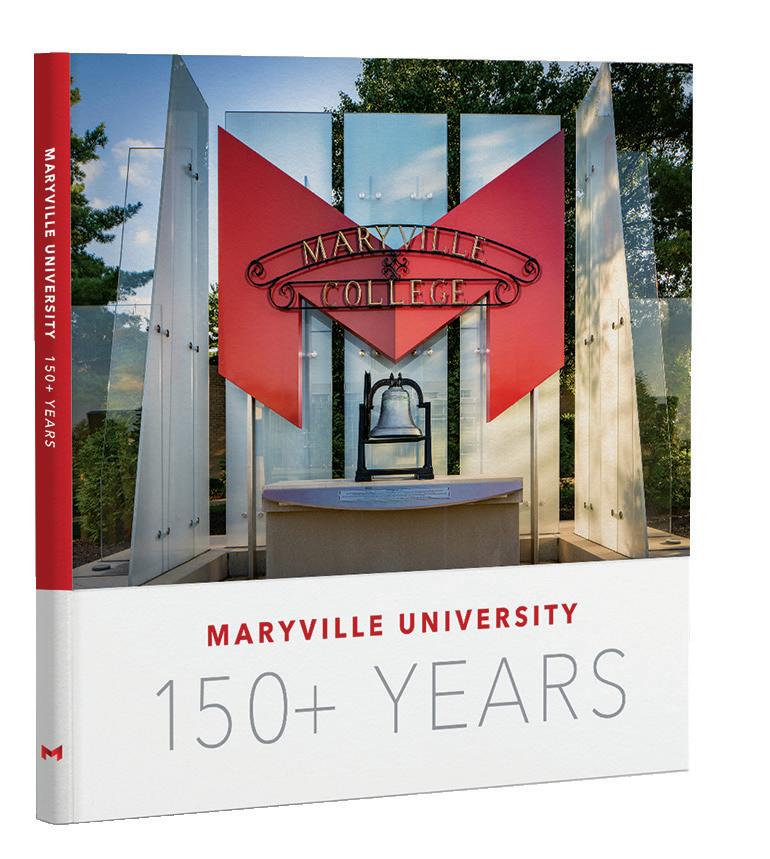
BY NANCY FOWLER
Acombination of cuttingedge technology and old-fashioned communitybuilding make Maryville’s Catherine McAuley School of Nursing a sought-after destination for students drawn to health care.
Maryville offers nursing degrees in five concentrations at the bachelor’s, master’s, doctorate and certificate levels to help meet an escalating need. According to the American Nurses Association, nursing is one of the fastest-growing occupations. By 2030, the U.S. health care field will demand more than 275,000 additional nurses.
Few other areas of employment impact as many people, according to Mykale Elbe, DNP, APRN, FNP-BC, director of the MSN/NP programs and assistant professor of nursing.
“Anyone who goes into a health care setting will interact with nurses,” Elbe said. “They are those first-line health care providers who pick up on information that could save a life.”
Today’s nurses and nurse practitioners work and learn in a world unimaginable to past generations. Technology gives Maryville’s undergraduate students unique opportunities
to deal with medical crises in real time through programmable mannequins. The nursing program’s seven mannequins can exhibit shortness of breath, elevated heart rate and other signs common to a number of conditions including heart attack and stroke. Through a microphone, instructors can make mannequins “talk” to convey slurred speech or declining cognitive abilities. Sessions can be recorded, allowing valuable information for the debriefing process.
“Where we talk about what went wrong, what can we do better — that’s where the magic comes in,” Elbe said.
During the past two years, lack of access to clinical sites because of COVID-19 has ramped up the importance of simulated patient care in academics. It’s also revolutionized learning in other ways. Nursing training now includes the practice and ethics of telehealth along with new coding and billing practices related to virtual care. The pandemic is also changing the way the program is taught. This fall, the nursing master’s program transitions to a fully online curriculum.
But something that hasn’t changed through the pandemic is the program’s personal touch.
they will be there for you,” Johnson said. Johnson appreciates how instructors provide the flexibility working students need. “They’ve made themselves available late in the evening and on the weekends,” Johnson said. “And it’s not just an email response; if you need a phone call, they will do that even if it’s after 9:00 p.m.”
Elbe is happy to go the extra mile because she loves what she does. She entered the field of nursing with a passion for taking care of patients. As an instructor, she also helps students — and they help her.
“I think I learn just as much from students
fulfills my passion to learn, while also making
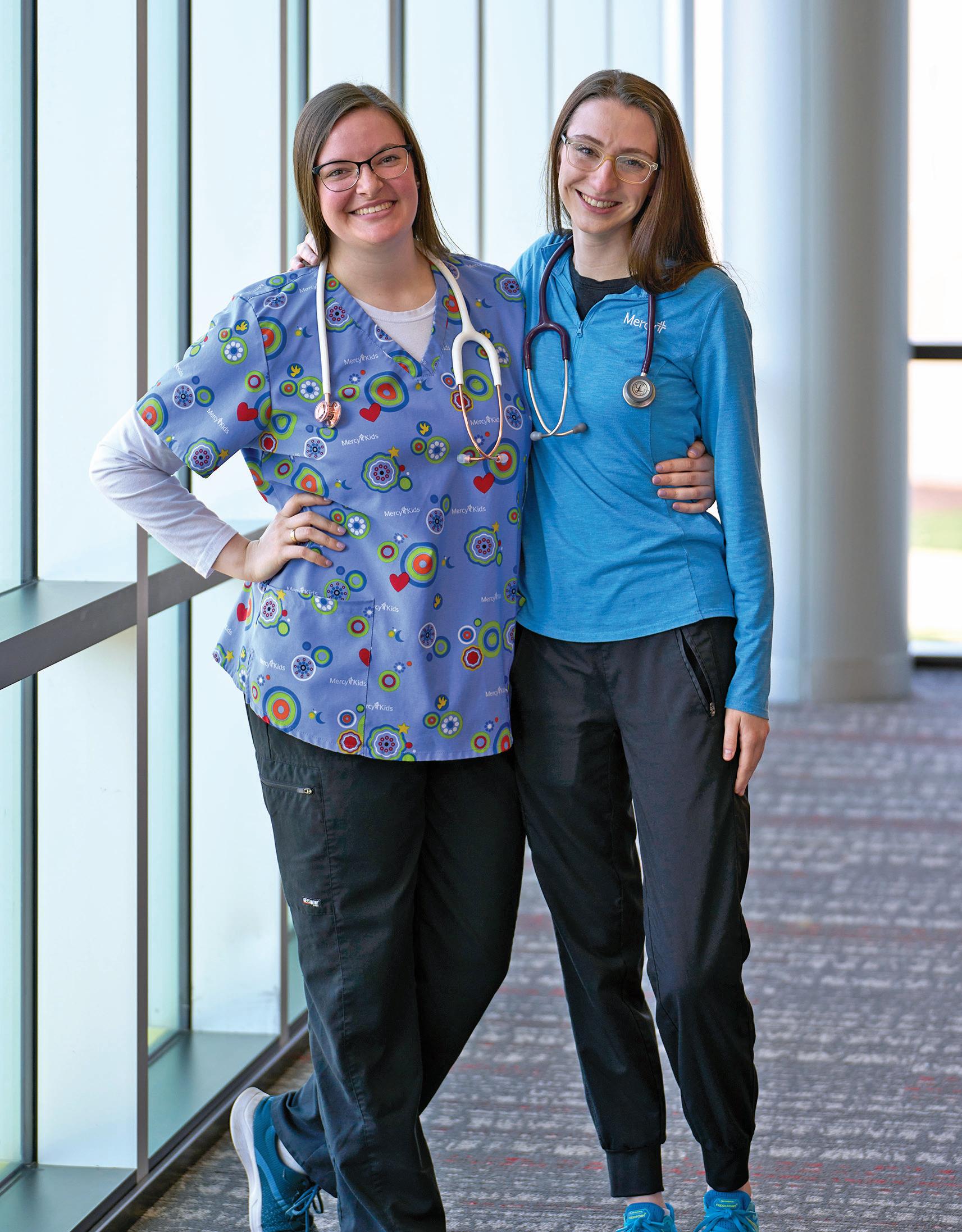
to determine which position would be the best fit. “And then afterward, she sent me her employment contract and asked, ‘Hey, can you just look over this?’” Elbe said. “And I was glad to help.”
Others ask for help with their resumes. Many come back to Maryville to teach at undergraduate and graduate levels.
“We have a building, working relationship with our nursing alumni,” Elbe said. “We are lifelong colleagues.”
We salute the Maryville nursing community, including our nursing alumni, students and educators around the world and across every nursing discipline. For more than two years, you’ve been working tirelessly in very difficult conditions to care for our society. Your bravery, your empathy and your grit is awe-inspiring.
All of Maryville University salutes you. We are proud to award the Myrtle E. and Earl E. Walker Medal to all nursing alumni, students and educators. The Walker Medal recognizes outstanding contributions or achievement in the field of Health and Wellness. In April, President Mark Lombardi, PhD, presented the Walker Medal to the entire Maryville nursing community during the 2022 Nurse Pinning Ceremony. That medal is now on display in the lobby of Myrtle E. and Earl E. Walker Hall. Additionally, each member of the Maryville nursing community received a special Walker Medal lapel pin. An engraving was also added to the Visionary Leaders Wall on the Gander Quad to honor the Maryville nursing community and recognize those who have made significant personal impact on the University.
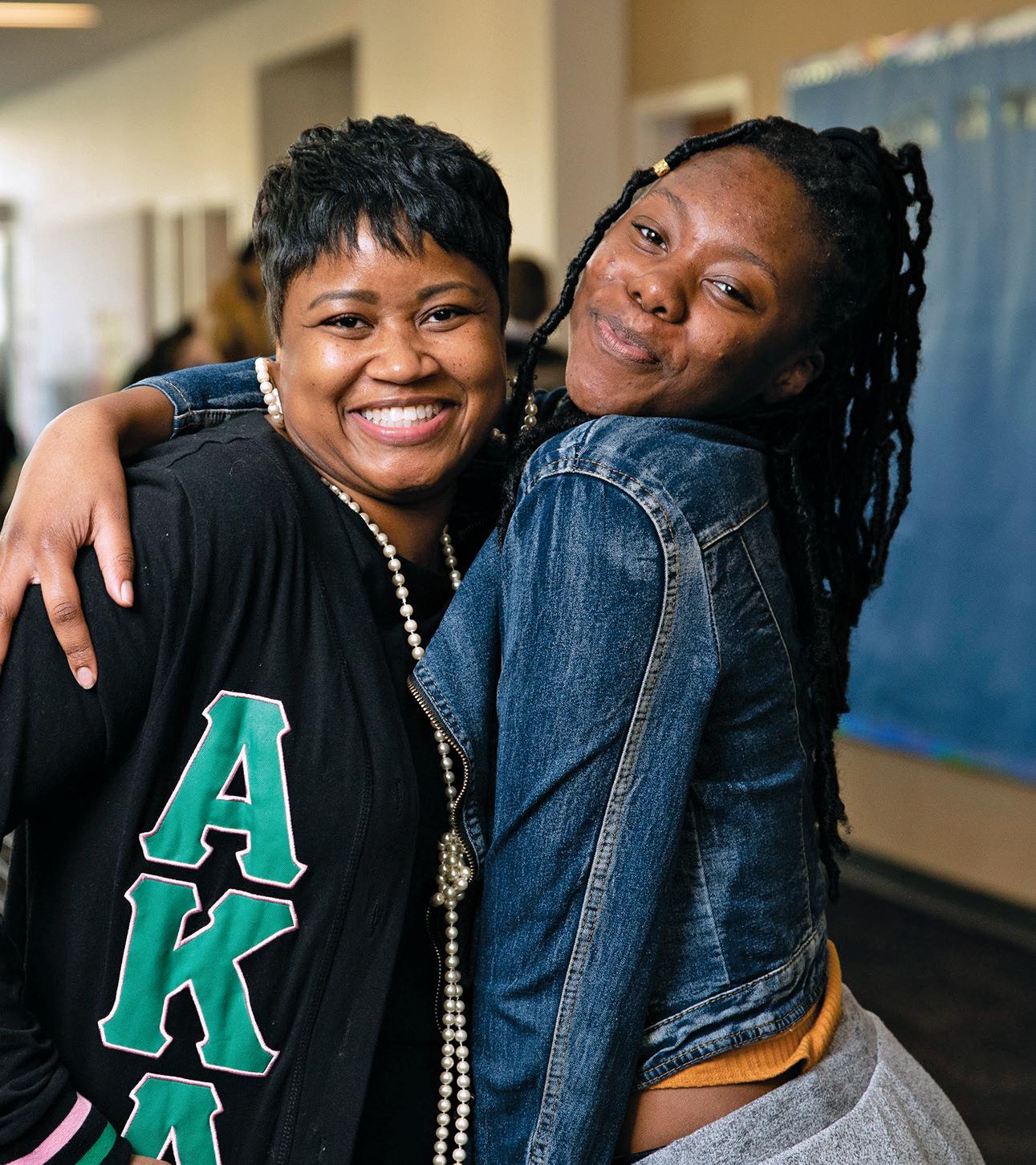
K-12 educators have found a renewed sense of optimism and opportunity for the future of education after teaching through the challenges of the pandemic.
BY GABBIE ST. PIERRE
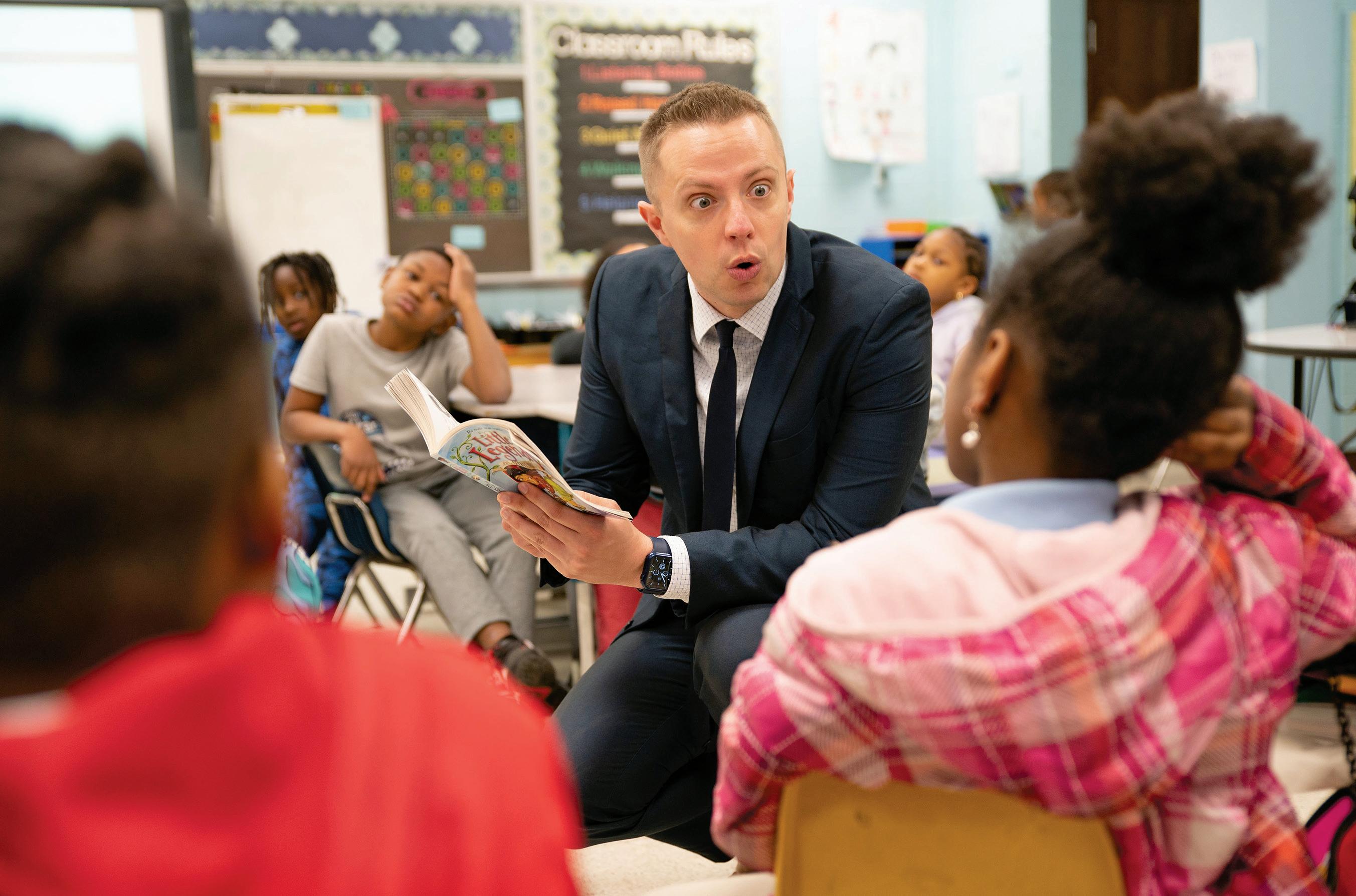
Alumni of the Educational Leadership Program found themselves leaning on what they had learned from the program to navigate the pandemic, too.
In March 2020, K-12 educators found themselves packing up for spring break while hearing murmurs about something called the coronavirus. Most thought school would only be closed for two weeks. They didn’t know they would need to pivot for the next two years.
Oakville High School Principal Jason Buatte, who is studying educational leadership, leaned heavily on Maryville’s Doctor of Education cohort model throughout the pandemic.
“It was great to talk to my classmates and see what their schools were doing with COVID-related policies,” Buatte said. “We had each other to lean on; it was nice to realize it wasn’t just tough for me, it was tough for all educators.”
Michael Baird, ’18, EdD, principal of Hickey Elementary School, part of Saint Louis Public Schools, thought back to how Maryville taught him how to leverage his strengths as a leader.
“My strength is relationship building. I knew my best access point to lead during the pandemic was to foster relationships with my colleagues,” Baird said. “That meant checking in on them to make sure they were well taken care of — so that they could take care of their students.”
After Wydown Middle School, part of the Clayton School District, transitioned to virtual learning, Assistant Principal Tarita Rhimes, ’20, EdD, realized that some students excelled in the new virtual format, while others struggled.
“It made us step back and think about how our students learn differently from one another,” she said. “For those who were doing well virtually but hadn’t typically thrived in a brick-and-mortar classroom setting, we asked ourselves, ‘What about the virtual learning environment is better for them? What can we do differently for these students in the future?’”
When many schools returned to inperson learning last year, it brought about new challenges as students and faculty alike grappled with their new normal. Back at school, Rhimes found her students to be socializing less and acting out more after having spent so much time learning through a screen. “Students were more subdued. We were prepared for them to be behind academically, but we didn’t expect the lapse they had socially and emotionally,” Rhimes said.
K-12 classroom learning is slowly returning to the way things were pre-COVID but with a continued focus on providing an equitable atmosphere for learning thanks to leaders like Michael Baird, ’18, EdD, principal of Hickey Elementary.
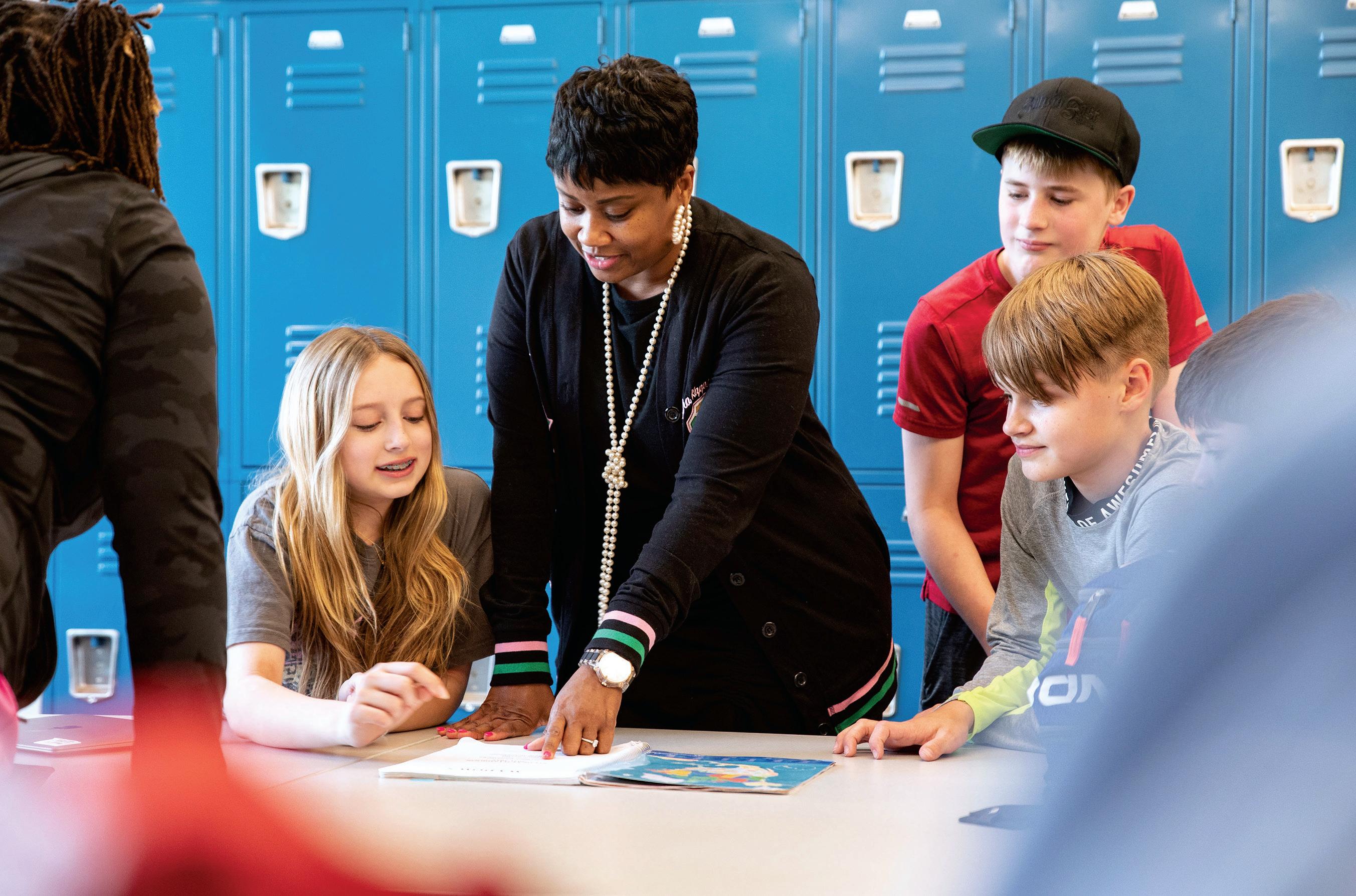
xTo help with this, Rhimes has implemented activities for her students to participate in during their lunch hour, like a rock-paperscissors tournament. “I try to remind students that school can be a fun place and encourage them to spend time rebuilding their social skills,” she said.
Baird and his team at Hickey Elementary grappled with similar hurdles. The school’s recent change to a mask-optional policy has made a dramatic difference. “It has been really cool to see our students’ whole faces again. To see them smiling and making facial expressions as they learn is what I missed most.”
Some aspects of education, however, may be changed for good.
“I hope we don’t go back to how we did things pre-COVID,” said Rhimes. “We had much more personalized education during the pandemic, and I hope that’s something that stays the same.”
Rhimes, Baird and Buatte agreed that the pandemic highlighted inequities in the education system.
“Education cannot return to the way it was pre-pandemic. Now that we know the inequities that surfaced due to the pandemic, we cannot ignore them,” Baird said. “As a leader, I know I have to look at the system as a whole and ask how we’re going to make sure that every student has equitable access to education.”
Being an educator in the time of COVID meant adapting and being flexible, an outcome for which Buatte is grateful.
“Before COVID, we often thought of all the reasons why we couldn’t do something. The pandemic taught us that we can pretty much do anything and gave many teachers the courage to try new, creative things,” he said.
Challenging times also created opportunity for Kevin Stokes, EdD, director of the educational leadership program and assistant professor of educational leadership. As a professor in Maryville’s School of Education, he was able to experience both teaching himself and observing other educators navigating pandemic learning.
Early on, he realized that his courses may not be able to cover as much traditional content as usual. Instead, he shifted his approach to make sure students were given the space they needed to work through what was happening in their real lives together.
“We weren’t just doing theory,” Stokes said. “We were using the courses as a way to ask, ‘What’s going to happen when I go to work tomorrow, and how can I apply what I’m learning?’”
Looking back, Stokes can see that the past two years weren’t all doom and gloom. Instead, he sees it as a lesson that teaching and learning can happen in many ways.
“There is the possibility to make education really exciting based on what we’ve learned from the pandemic,” he said. “We shouldn’t lose that opportunity.”
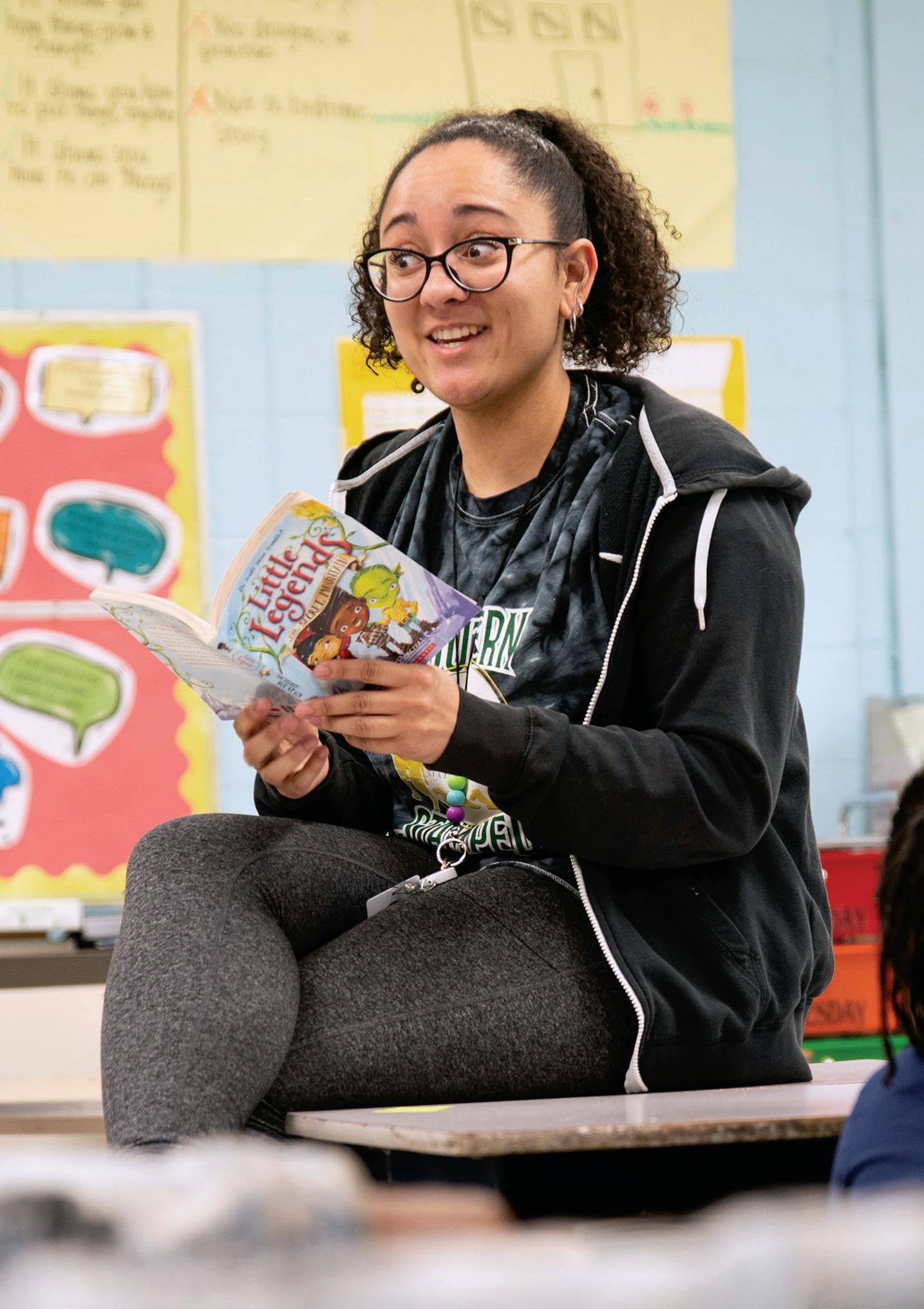
The elitism of many universities disenfranchises millions of students each year. Maryville University is challenging the status quo by creating an ecosystem of inclusion and opportunity. Maryville’s Chief Innovation Officer Phil Komarny is accelerating these efforts by harnessing the power of learner data.
Why is the higher education industry stuck in a 20th-century model?
Higher education has created a culture resistant to innovation. Many universities consider innovative ideas, but then fail by putting those ideas through a process involving endless deliberations and committee meetings, with no endpoint in sight. I call this Innovation Theater because it’s going through all the motions but in a “play,” not in reality. The pandemic has only accelerated the essential need for a new matrix that can break us free from this 20thcentury model. At Maryville University, we are creating that new, revolutionized model.
What does the future of learning look like, and how will this new model benefit our students?
One of my favorite quotes is from Beth Rudden, IBM’s cognitive artificial intelligence lead: “Data is an artifact of the human experience.” Learner data tells us who they are, how they learn, how their brains develop and work, what their needs are and what hopes and dreams they hold in their hearts.
Maryville’s new model of higher education uses learner data to create learning and
living profiles that tailor content and pedagogy to each learner. All content will be modularized to allow for an endless array of education and skill development throughout a learner’s lifetime. A vast content store will be available at a subscription rate as affordable as your cellphone bill. By reducing costs and removing obstacles, Maryville is opening up pathways of access to underrepresented groups who have been historically closed out of education and society. We want to make higher education an affordable necessity for all students instead of an expensive commodity for the elite.
Tell us about the technology that makes this new ecosystem possible. This new model uses artificial intelligence in two specific ways. First, it provides a new language between universities and companies through the use of NLP (natural language processing) and semantic analysis to create a skills-based representation of both learning objectives and job qualifications. Second, the AI focused at what knowledge a learner might need next to help them along their journey will become better and better as more people interact with it.
It’s very important to note that the artificial intelligence is servicing the learner through a consented relationship with that learner’s data. We want all learners to be empowered by their data and begin to understand how it can be used in service of them, not like the multitude of companies and digital services that abuse it. We’re also investigating new ways to use new tools and services to delight our community. Unlike existing tools and services — that I like to call link farms that essentially copy and paste a website — Maryville’s tools and services will offer learners a personalized experience. You can think of it similar to when you’re automatically served the next show during your Netflix binge.
How does Maryville’s commitment to innovation compare to other universities? The people here at Maryville are something very special. Some look at me like I’m crazy when I say that, but the conversations we’re having are not normal. And I know, I’ve had these conversations with educators all around the world. Maryville is special because we’re able to acknowledge that the past got us here, but we understand that what is going to move us forward isn’t the same as what brought us to this dance. And we’re really thinking about how to move forward together, with every department and campus area involved.
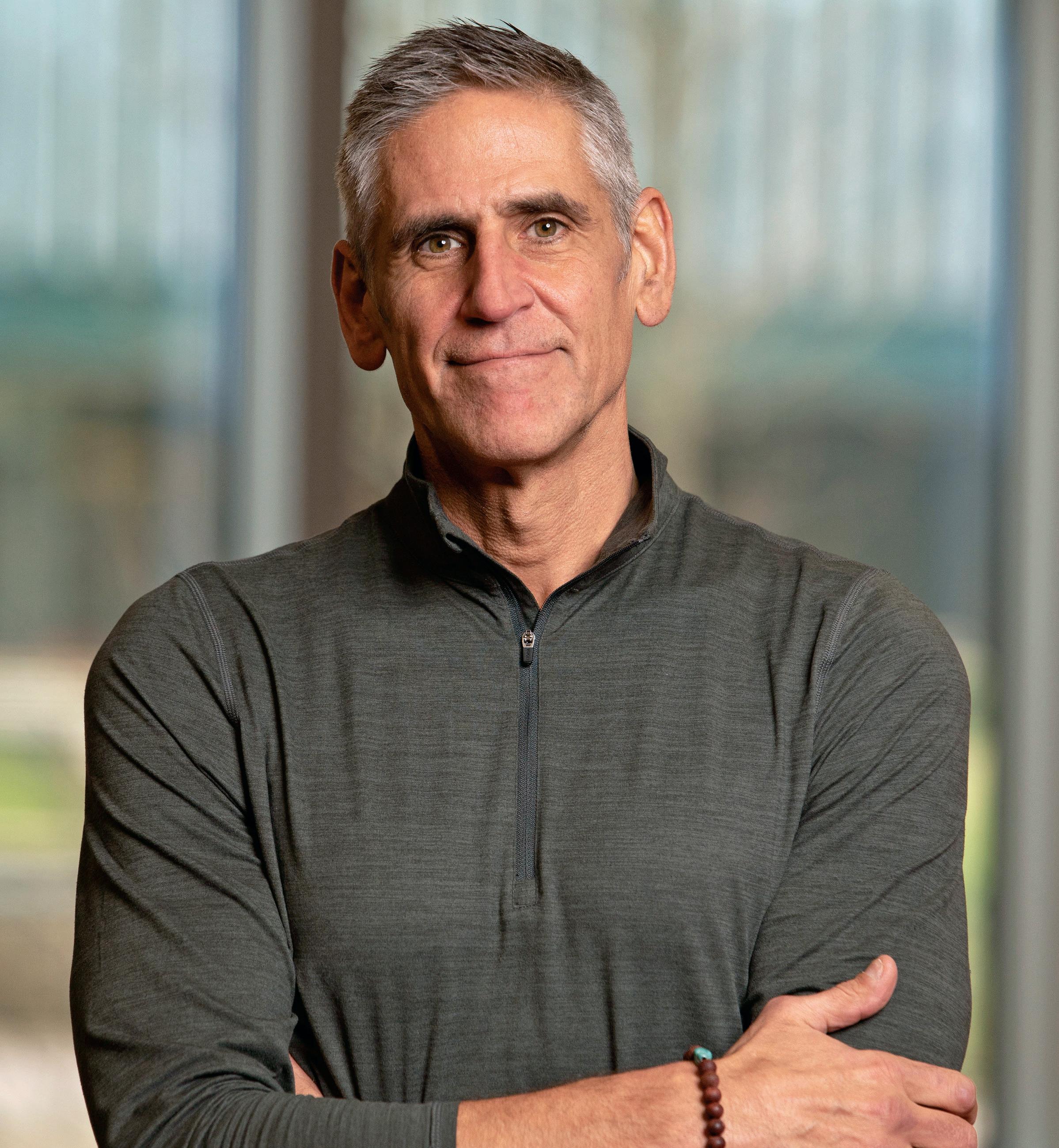
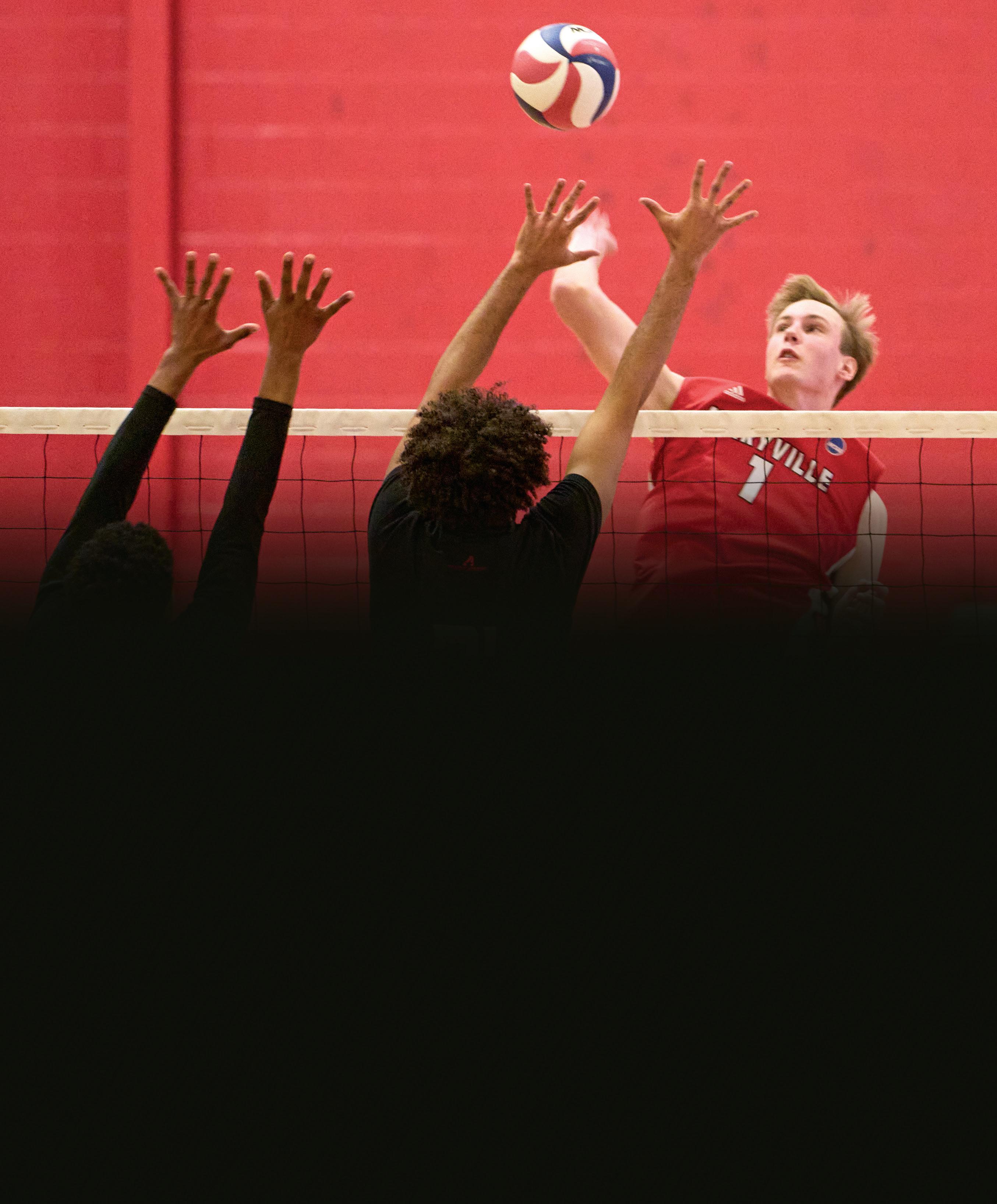
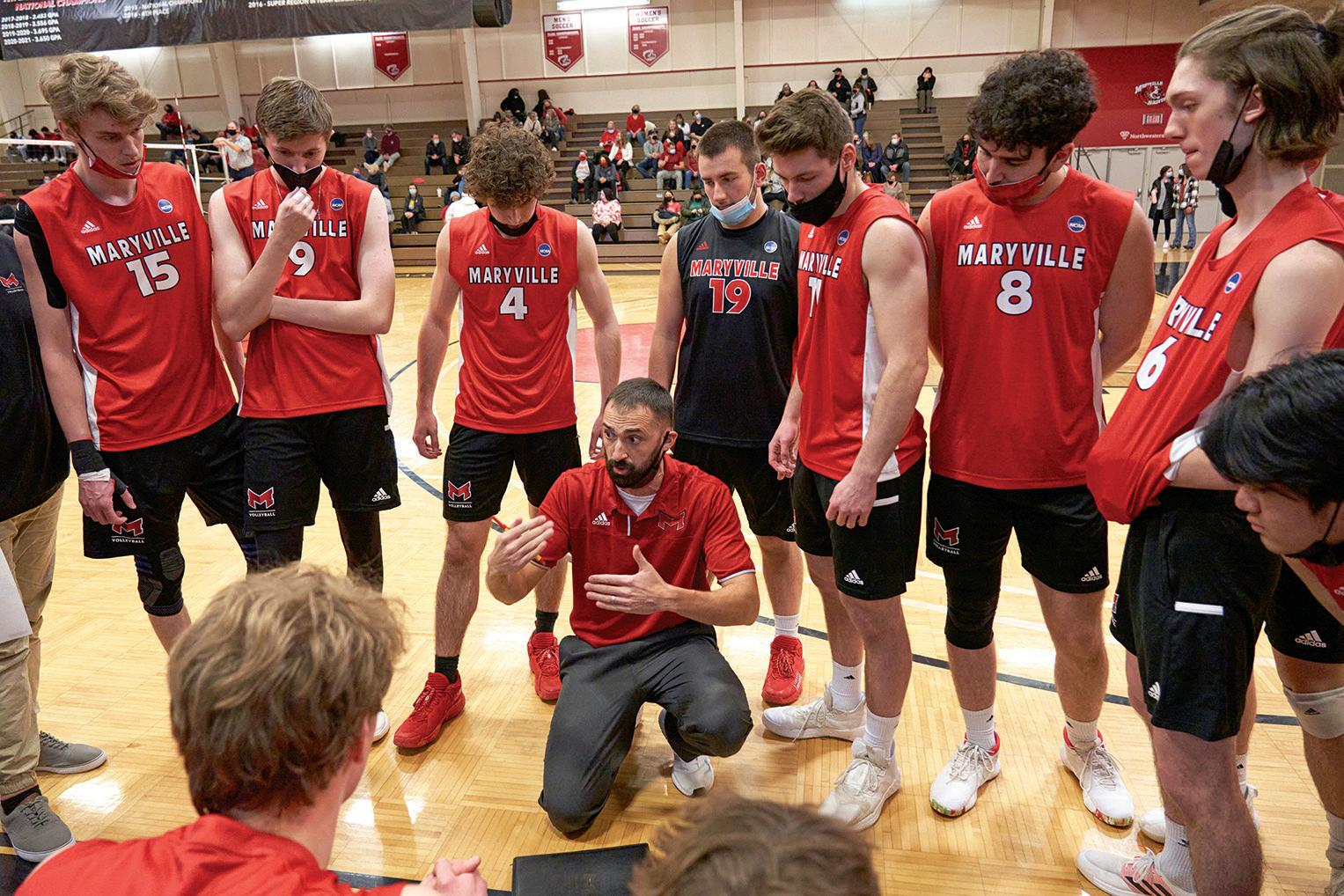
The Maryville men’s volleyball team celebrated its first season of NCAA play, including the program’s first-ever victory during the inaugural home opener.
BY DALE SINGER
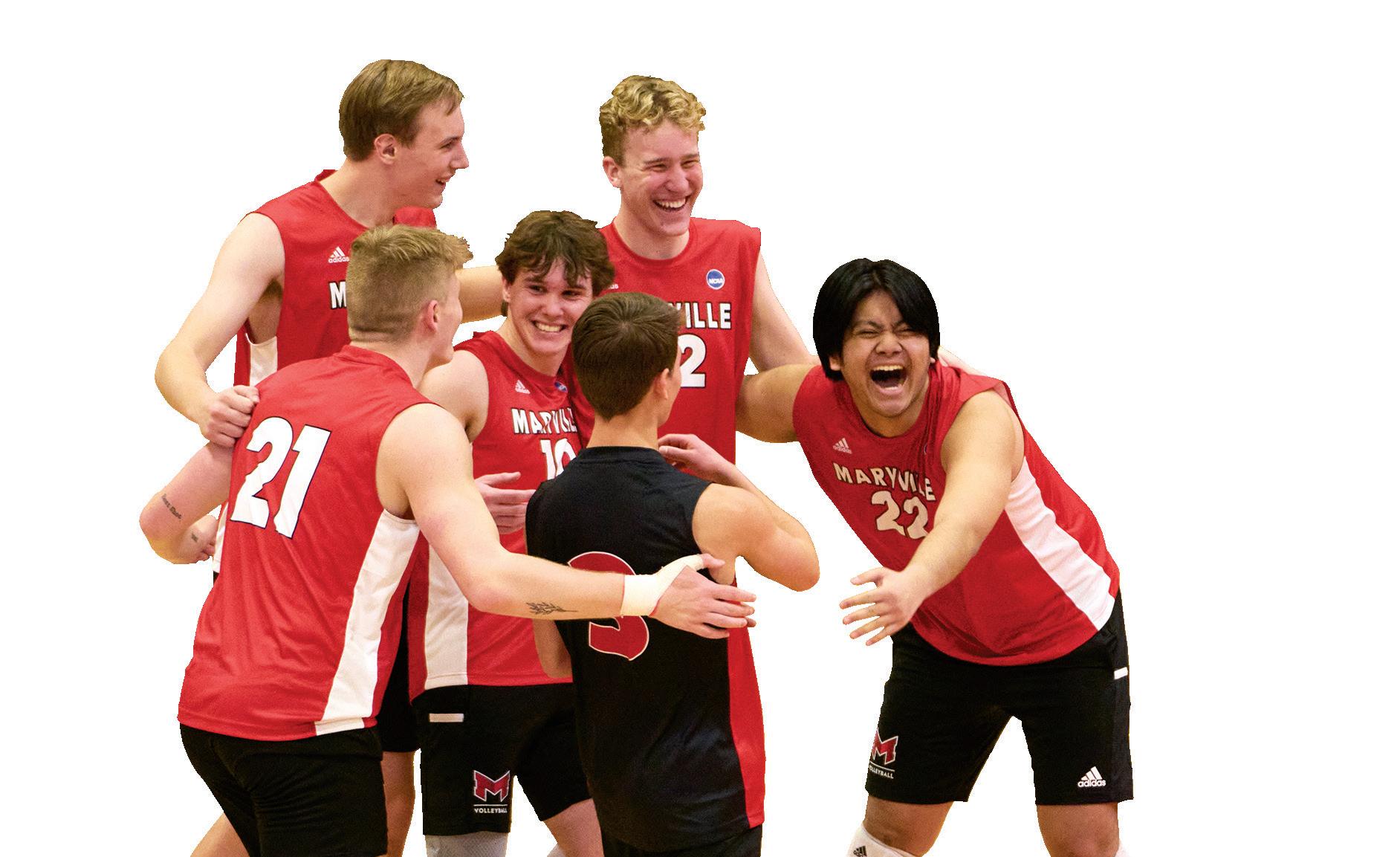
hen Mike Haston first got involved in volleyball, it wasn’t for love of the game. But it turned out to ignite a lifelong passion. Now, Haston is passing that enthusiasm on as Saints men’s volleyball celebrates its first season of NCAA play.
“He’s a very inspiring man,” said Mason Mortimer, a first-year student from Minnesota. “He knows how to communicate with young student-athletes on the team. He has the vocabulary of what a college-aged person would have. It’s not necessarily that we have to go to volleyball. We get to go to practice every day and spend time together.”
Haston brought a strong record of success when he arrived at Maryville, first serving as an assistant coach for the Saints NCAA Division II women’s volleyball team for four seasons. Earlier in his career, he coached at Fontbonne University and Fox High School in Arnold, Mo.; and played at Parkway North High School, where he contributed to back-toback state championships.
That experience helped guide the Saints from club status to NCAA play. Haston knows the game, he knows his players and he knows the path to help them perform their best. “It was all about culture first,” Haston said. “I had to bring in students that had the right focus and dedication.”
Director of Athletics and Recreation Lonnie Folks, ’82, ’98, said moving up to NCAA status was the impetus to bring Haston to campus.
“The dream of competing at the NCAA level helped with the profile of students interested in our program,” Folks said. “There were already four schools in the Great Lakes Valley Conference (GLVC) that had men’s volleyball, and we knew that one additional school was also going to start a program as well.”
Previously, the Maryville men’s volleyball team had operated as a student-led club team. Haston was named coach in 2018, and the team began varsity club competition in 2019.
“Our first year of varsity play, we were aided by the invaluable help of three upperclassmen: Patrick McPherson, ’22; Grant Vollmar, ’20; and Tyler Dreiling, ’21,” Haston said. “These three players were indispensable to our roster in the club years and were extremely helpful in getting the recruited players acclimated to life on the Maryville campus.”
The Saints were ranked the No. 3 club team in the nation when the pandemic shut down that first varsity season. Last year, club competition was also put on hold because of COVID-19.
This year, the team’s baptism into the world of NCAA play was difficult, but not necessarily a surprise. The opening weekend of the season, when the team traveled to Indiana and came home winless, reinforced the notion that NCAA matches would be tough. But the second weekend, with a home crowd cheering them on and the Maryville band helping set the tone, brought the squad’s first victory.
“It was all about culture first. I had to bring in students that had the right focus and dedication.”
And, having the entire team back for the inaugural home opener after some members had battled COVID was “a big booster,” said Luke VanHandel, a junior from Wisconsin. “We were just going in sync. And having the home crowd was amazing.”
“I knew the teams we would play would be tough, because they had more experience,” added Tate Sandvig, a freshman from Iowa.
“The pace of the game is a lot of quicker. Everyone jumps higher and hits harder. I’m impressed with the way we played and reacted to the situation we were in.” Haston said that positive attitude will help Maryville succeed. “We can’t get there overnight,” he said. “You can bring in one class, but one class doesn’t define your culture. To do it right means that the quality of this program will transcend one class, one player, into something bigger — into the sense that this is Maryville’s team.
“I tell the guys all the time: ‘You’re putting a program on the court,’ he said. “If we want to have an impact over time, we have to make sure our student-athletes understand that it’s the University that makes us their team. Saints Nation is all of us.”

Since 1972, Maryville men’s soccer has had a great influence on campus and created a unique community of student-athletes, alumni and fans.
BY JONG CAMBRON
More than 510 players and coaches. Six tournament championship banners. Three conference titles. These are just a few numbers that are part of the Maryville men’s soccer program, which just completed its 50th season.
The Saints created another team record by knocking off No. 1 Indianapolis 3-2, the firstever victory against a No. 1-seeded team, during the 50th anniversary celebration in October.
During halftime of that game, men’s soccer alumni were introduced with players from every decade represented, including Mike Deering, ’74, who played on the first team in 1972. Alumni were presented with custom Maryville soccer scarves, which are synonymous with soccer passion. Past Saints also attended a social event the night before.
“The celebration was a huge success, and I was overwhelmed by how many alumni attended,” said Ron Landolt, ’80. “I enjoyed visiting with many of my former teammates. And I would say it was the largest turnout for a soccer match in the history of Maryville. The new Saints Pavilion was definitely standing room only that day.”
Current men’s soccer coach David Korn said the weekend reminded him how grateful he is to be part of such a strong program. “I see the value our alumni brought to the program and the tremendous pride they take in our success now. They also continue to support our studentathletes and take a sincere interest in them. It’s truly unique,” he said.
Fifty years ago in 1972, the very first men’s soccer team was led by coach Gary Utz and was nicknamed The Brewers. They finished their inaugural season with a 3-8-1 record. Three years later, the team posted its first winning season under coach Bob Rau.
Landolt, who is fifth all time in points with his 28 goals and 10 assists, started his career at Maryville the following year in 1976. He was inducted into the Maryville Athletics Hall of Fame in 1988 and has aided with creating an alumni scholarship for men’s soccer student-athletes.
“Maryville was a great fit for me to continue to play soccer while obtaining my business degree,” he explained. “Everyone I met during my campus tour, including (athletic director) Bill Heitholt and (coach) Bob Rau, was very caring and interested in me and my personal goals.”
In 1979, during his senior year, the newly named Saints reached double digits in wins for the first time. Landolt said defeating rivals McKendree and Washington University were the highlights of his career on the field, and he fondly remembers spending time with teammates off the field.
One of his teammates, Matt Crawford, ’81, was also on hand during the celebration. He was instrumental in promoting the event through his alumni newsletter.
Crawford also mentioned the travel to away games and celebrating wins as some of his favorite memories. “I loved it all,” he said.
“Walking onto the field for a game on a bright, crisp September day. Cold, wet practices in late October. Adventures on road trips and postgame celebrations at home.”
Even after graduation, Crawford continued his dedication by completing a partially started record book.
“In 2012, I happened to check out the team’s website and found there was virtually nothing prior to 2000,” he said. “I thought it a great injustice that there was no record of the guys who started the program since they had made it possible for me to play college soccer.”
After six years of researching, Crawford was able to piece together the 1972–1999 seasons and delivered the files to the Saints athletics office. The 39-page cataloged record book can be found online at maryvillesaints.com.
“The project was a labor of love,” Crawford said. “I contacted numerous former players, collecting copies of schedules, photos and other mementos. I spent hours poring through microfiche and online archives. I scoured the internet for opponents’ websites for records of our games against them.”
The record book is expected to grow in accomplishments and trophies in the coming years. The Saints have averaged 12 wins the past five years. In 2021, the team won the Great Lakes Valley Conference Championship, marking back-to-back GLVC titles.

Maryville’s new women’s field hockey program has hit the ground running since being announced last year. The program currently boasts committed student-athletes from St. Louis, New York, New Jersey, California, British Columbia and South Africa. Practice begins in August with the season home opener taking place over Labor Day weekend. “As the daughter of a Maryville graduate, it is an absolute honor and privilege to call myself a Saint,” said head coach Maggie Young. “I couldn’t be more excited or proud of the progress we’re making as we lay the foundation for the first-ever Maryville team. This fall, history will be made as Maryville breaks into the NCAA Division II field hockey world, looking to develop a reputation of excellence both in the classroom and on the field.”
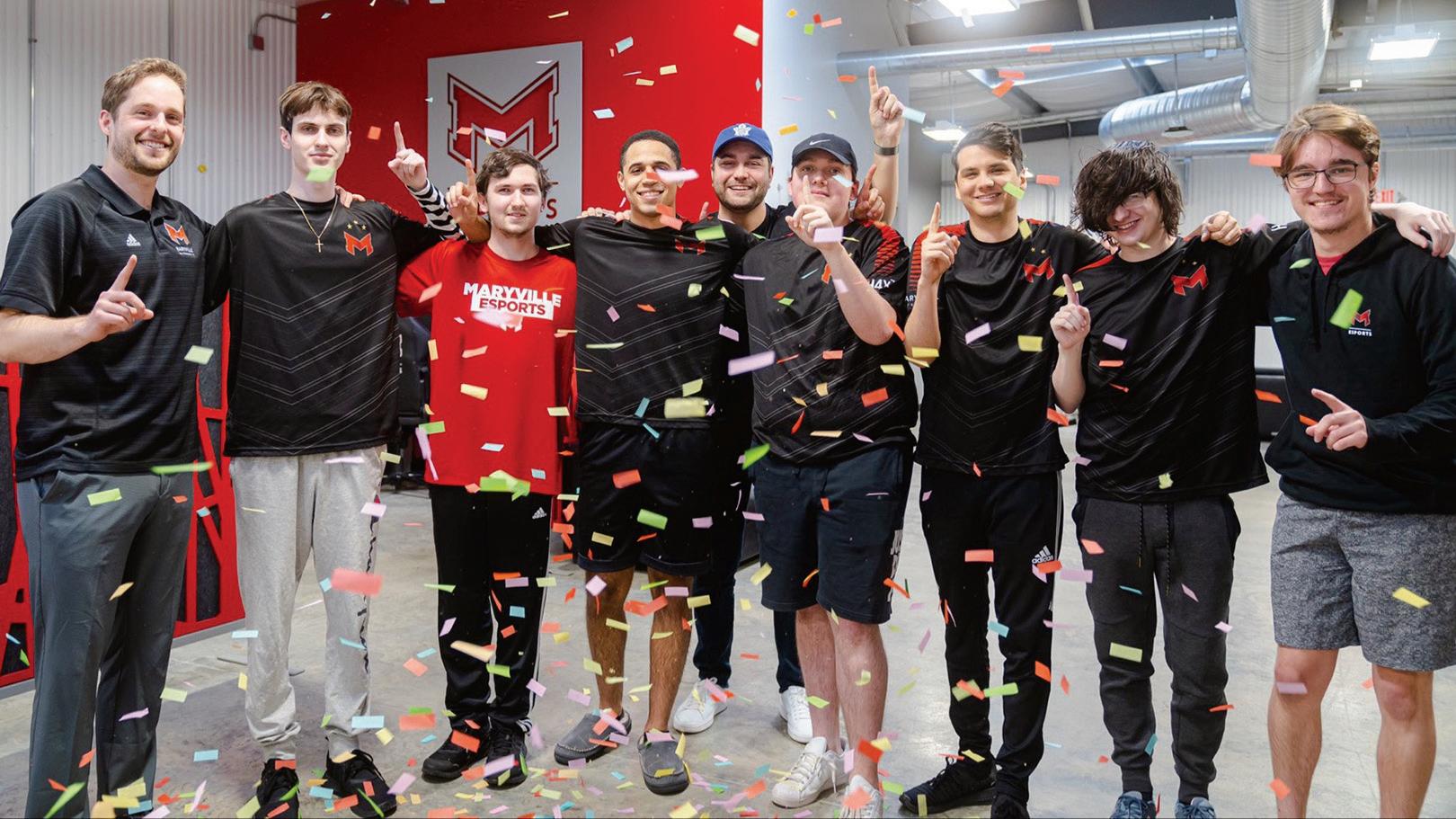
Maryville’s Overwatch Esports Team won its second national championship. The win marks Maryville’s fifth esports national title out of eight overall titles.
Maryville University’s Overwatch Esports Team won its second Overwatch Collegiate Championships, marking back-to-back national titles for the Saints.
“Maryville continues to dominate collegiate esports, and we’re proud to have the best collegiate esports program in the nation,” said President Mark Lombardi, PhD. “Our consistent success is thanks to the unrelenting commitment and dedication of our student-athletes, to Director of Esports Dan Clerke, ’18, and our entire esports staff, and broader community.”
Maryville defended its title by beating rival Northwood University. The two teams battled in the final round for the second year in a row. In earlier rounds, Maryville swept Bellevue University, the Savannah College of Art & Design and Illinois State University to reach the finals.
“Going back-to-back is one of the greatest experiences of my life,” said Zachary “iced”
Hughes. “Being able to overcome the hardships of this year and end it on top is a great feeling and shows just how dominant we are in the collegiate scene.”
Maryville’s esports program boasts five national championships for League of Legends and Overwatch, as well as dozens of major tournament titles. The program has sent multiple players to the professional scene.
“Joining Maryville has been a great experience so far, and it’s thanks to the staff for their understanding on how to run a program the right way,” said Michael “mikeyy” Konicki. “My apologies for giving everyone a heart attack in the final; we had to make it close for the fans!”
Maryville’s esports teams are known around the world. To further support its esports programs, the University has announced plans to build an esports arena seating up to 3,000 people. The project would redevelop the Woods Mill Center at Highway 141 and Interstate 64 and is currently in the conceptual phase.
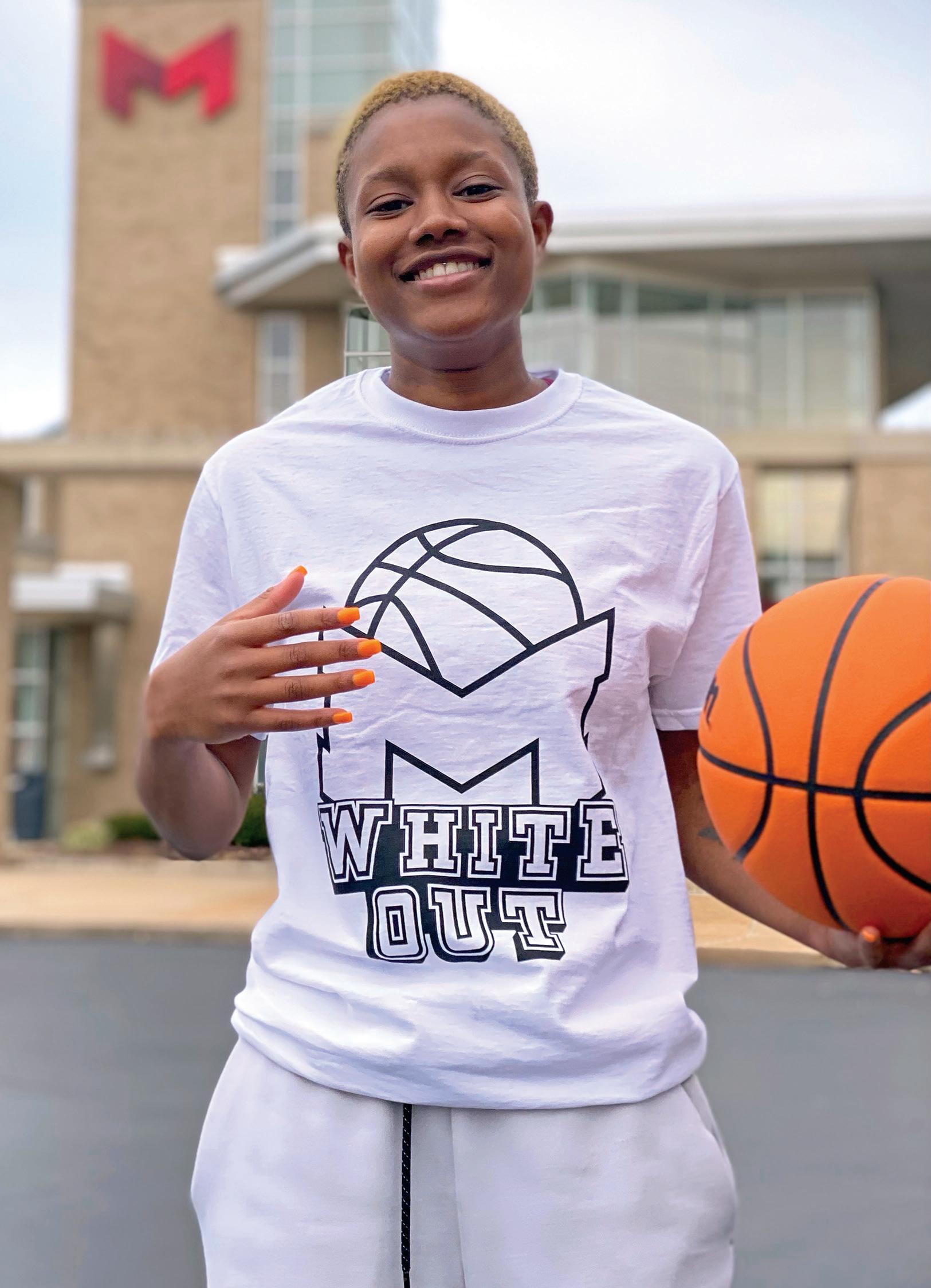
The White Out game is a beloved tradition in college athletics where spectators come dressed in all-white attire. Maryville’s Department of Athletics and Recreation hosted a White Out celebration for the men’s and women’s basketball teams as they took on McKendree University. The first 500 students who showed their support for the Saints received a free white T-shirt emblazoned with the Maryville spirit logo. Basketball team members modeled sneak peeks of the T-shirts on social media to garner excitement for the games.
Congratulations to Maryville for being named the Esports Collegiate Program of the Year! Presented by the Esports Awards, the recognition honors a program that has significantly contributed to the world of collegiate esports by improving the lives of players drastically, advancing the standards of collegiate esports and forging a path to professional play for individuals and teams. “We are humbled and excited to receive the award for the Esports Collegiate Program of the Year,” said Maryville’s Director of Esports Dan Clerke, ’18. “This is something we’ve been striving for over the last six years since the program began. I’d like to thank our players and staff members who put in the work every single day that make things like this possible.”
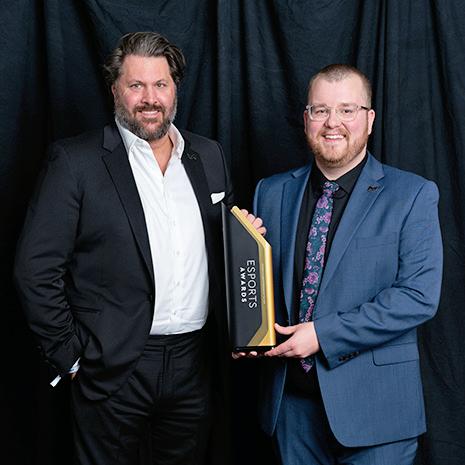
player and a recipient of the
Elizabeth “Libby” Jones Searles, ’60, of Kansas City, Kan., and her husband, Mike, moved from St. Louis to Kansas City to be closer to family. Searles has four sons and five grandchildren. She is retired from residential real estate management and now spends her time reading, working with clay, traveling and enjoying family. Her time spent on the Maryville University Board of Trustees was especially meaningful to her.
Kate Stoll Giordano, ’66, of Rome, Italy, is a judge for the Federation of Athletics, Track and Field. She works to keep athletes and coaches up to date on new rules and regulations. She said, “It’s a great way to influence the youngsters who are just getting started, teach them the discipline in sports and help them in all the events as they grow up. Right up through nationals into international and on to the Olympics!” Giordano was privileged to attend the 1966 Atlanta Olympics to help with the Italian athletes competing there. She and her family have lived in Rome for many years, yet she stays in contact with several of her Maryville classmates.
Theresa M. Grass, ’71, of St. Ann, Mo., has spent her 50-year teaching career at the Academy of the Sacred Heart in St. Charles, Mo. She previously served as a classroom teacher and school librarian and is currently the archivist for the historic school. Grass has poems published in a variety of collections and is a nature photographer. She shares that the English major and Biology minor from Maryville University came in handy!
Julie “Smitty” Smith Steinlage, ’72, of Hilton Head Island, S.C., shares that she and her classmates got together for a belated celebration of their 70th birthdays at the summer home of Rosemary Tracy Caragher, ’72, in Michigan City, Ind. She said, “We had a marvelous time and even played a game of Maryville trivia. There were lots of laughs and we even awarded prizes. We also shared which person at Maryville had the most influence on us during our four years there. A common theme was that many of us did not have the financial resources to attend Maryville, but Maryville President Mother Mary Gray McNally, RSCJ, with kindness and generosity, provided grants and work programs to make it possible.”
Elizabeth “Bette” Eardley Mueller, ’74, of St. Louis, opened her own interior design business, Interiors By Bette. Mueller has been designing for more than 35 years and was originally with Alan Brainerd, adjunct professor at Maryville University, until his death in August 2020. Mueller said it is the best retirement job ever!
Norma Flores Vogel, ’74, of McAllen, Texas, is happily retired after 36 years of teaching. She shares that she is enjoying her wonderful grandchildren: Sachin (13), Texas (12), Leela (9), Leavy (4) and Nora (18 months). Before COVID hit, she had a wonderful experience during a weeklong trip to Rome, Italy, highlighted by Christmas Midnight Mass inside St. Peter’s Basilica on December 24, 2019. Vogel keeps busy working part time as the receptionist at her parish, Our Lady of Sorrows, and is a member of the School Council for the parish school. She is also substituting in fifth grade with McAllen Independent District. Vogel said, “I am looking forward to traveling again and seeing sights on my bucket list.”
Darin W. Sorrell, ’97, of Brentwood, Mo., was appointed to the Lawyerto-Lawyer Dispute Resolution Committee by the Missouri Bar Board of Governors.
Lynnette Tway Horn, ’99, of Branson, Mo., held an art exhibit in November 2021 titled “We are Ozarks,” where solo art was on display at the Southern Missouri Arts Connection (SMAC) in Hollister, Mo. Horn has spent most of her adult life writing for newspapers and magazines, as well as freelancing. Seventeen years ago, Horn began painting as a creative path. She is a self-taught Christian artist who looks for divine fingerprints in nature and tries to capture them in her hyperrealism art style. She said she enjoys painting many things, but her favorite is painting portraits and people. Horn divides her time between painting and volunteer work with the SMAC. She is the board vice president, secretary and chair on the communications team for SMAC and has a private studio at the Southern Missouri Arts Connection Art Center.
Mary Ann Stoff Warfield, ’99, of Independence, Mo., is a board member of the Climate Control Council of Greater Kansas City. She is also a prolific writer on the group’s weekly digest blog.
Dominik W. Jansky, ’00, of St. Louis, is the new director of marketing and communications at Forest Park Forever. Jansky previously served on the communications team for Webster University.
William “Bill” R. Moore, ’00, of O’Fallon, Mo., has worked in the fitness and performance industry for more than a decade. He is the owner, head coach and programming director of Profectus Performance in Edwardsville, Ill. Moore previously served as an adjunct faculty member at Maryville University.
Kimberly “Kim” Muhs Neff, ’00, of Fenton, Mo., is a physical therapy assistant at Telegraph Road Physical Therapy. Kim also works part time as a professional photographer and coaches a dance team at Lutheran South High School.
Victoria E. Pines, ’01, of Florissant, Mo., works at Washington University School of Medicine in St. Louis in Information Technology as an epic applications analyst. She recently launched her own online business, Victoria I.C.E. You, where she specializes in personalized novelty items including candles, T-shirts, mugs and home decor.
Brian M. Gant, EdD, ’03, ’21, serves as assistant professor of cybersecurity at Maryville University. He was honored by The St. Louis American Foundation as an “Excellence in Education” awardee at the 2021 Salute to Excellence in
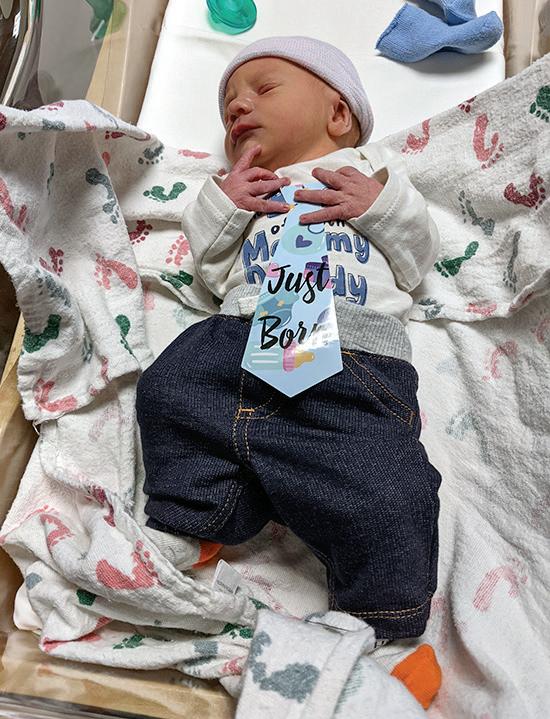
Education Scholarship & Awards Virtual Gala on November 5, 2021. His passion is his students because he believes in the power of access and education to better their lives, especially underserved populations of which he is a representative. In 2003, Gant received his Bachelor of Science in Management Information Systems, and in 2021 his Doctor of Education degree.
Darin W. Moore, ’04, of Bradenton, Fla., joined Ferrara as vice president and general manager on January 4, 2022. Moore has more than 17 years of experience in manufacturing, including operations leadership roles within Pierce Manufacturing, Kewaunee Fabrications, Wheeled Coach Industries and Lennox International.
The Honorable Christopher “Chris” J. McDonough, ’05, of Weldon Springs, Mo., was appointed a circuit judge for Division 5 of the 11th Judicial Court. His was one of four appointments announced by Gov. Mike Parson on February 4, 2022. Judge McDonough previously served as an associate circuit judge for the 11th Judicial Circuit. He holds a Bachelor of Science in Management from Maryville University, a Master of Science in Business Administration from Fontbonne University and a Juris Doctor from St. Louis University School of Law. Judge McDonough will fill the circuit judge vacancy created by the retirement of the Honorable Jon A. Cunningham.
1 Rina Lueck Schroeter, ’06, ’10, of Arnold, Mo., and her husband, John, welcomed their second child, John Walter Schroeter III, on October 29, 2021, at 6:45 p.m. He weighed 6 lbs 8 oz and was 201/4 inches long.
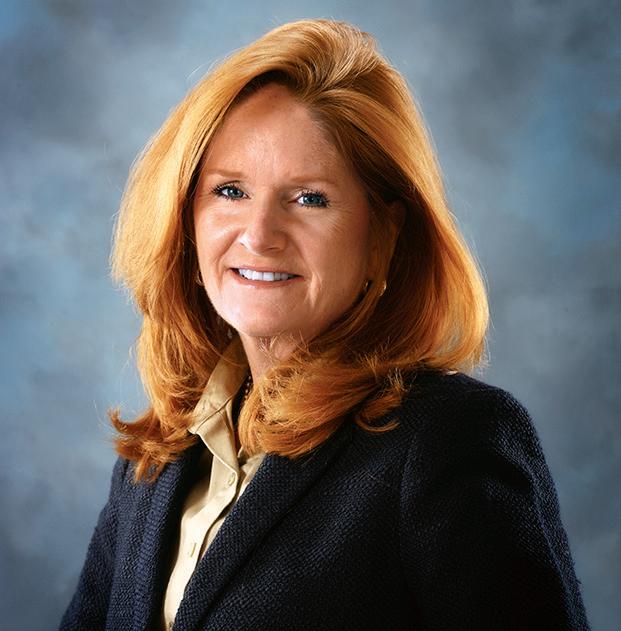
BY NANCY FOWLER
During Donna Baringer’s childhood, her mother worked as a secretary at the Missouri State Capitol. Because Baringer often went with Mom to the office, her days were filled with playing in the Capitol hallways.
Today, Baringer, ’89, works at the Capitol, representing St. Louis’ 82nd District in the Missouri House of Representatives. But her progression from running through the halls to running for office wasn’t a foregone conclusion.
Baringer was attending the University of Missouri in the early 1980s when her father was diagnosed with brain cancer. His illness brought her back to St. Louis where she helped care for him before he died. His greatest wish was for her to finish college. But she also needed to work.
At the time, few universities offered nights-and-weekend options. But Maryville was ahead of its time, pioneering a path for nontraditional students. Baringer became a full-time student while working 40 hours a week.
Soon her life became a whirlwind of teaching community college, working with a nonprofit and raising two boys. She also volunteered with her neighborhood association, where her oratory skills led to helping a state senator with presentations. It was in that capacity that she caught the attention of St. Louis Alderman Jim Shrewsbury. “He asked me, ‘Have you ever thought about politics?’” Baringer said. Shrewsbury wanted her to run for the seat he’d have to vacate to become board president. She said yes and was soon knocking on doors and debating with other candidates.
Baringer won her first aldermanic race and served 13 years on the board. In 2016, she set her sights on state office. She won and became the only Democrat and freshman to pass legislation during their first term. In this statewide position, Baringer keeps her eye on St. Louis. “I’ve been able to help make sure legislation that would harm our city never makes it to the floor,” she said. She’s particularly proud of her work related to St. Louis Lambert International Airport. Her successes include improving the airport retirement system and helping pass a REAL ID bill that brings Missouri up to federal standards. Baringer thoroughly enjoys the rough-and-tumble of state politics. “I just love what do,” she said.
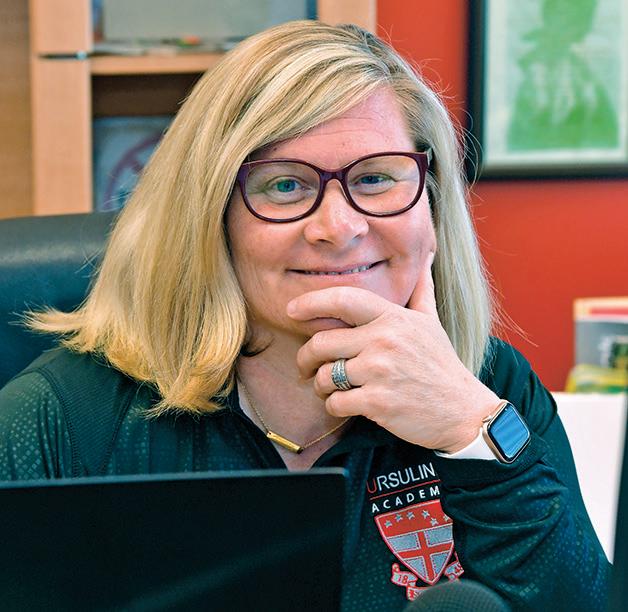
BY ANDREW FAUGHT
The daughter of a high school football coach, Jennifer Matusiak Brooks, ‘94, like all sports-loving girls her age, knew the prevailing sentiment of the time: Sports administration was a man’s business.
That didn’t stop her from helping her dad on game days, when she’d line the South City gridiron and mow the playing field. More than three decades later, it’s Brooks who has the final word. She’s been athletic director at Ursuline Academy for 26 years, all the while challenging and defying gender stereotypes.
“I deal with male officials who want to mansplain the rules to me, even to this day,” Brooks said. “I’ve dealt with dads who think that they know more than me. I’ve been doing this for a while, so I know what I’m doing.”
The Missouri Interscholastic Athletic Administration Association agrees. Last August, the organization feted Brooks with director of the year honors; she’s just the second woman — and the first from a private school — in 47 years to win the distinction.
Helming an athletic department wasn’t a sure thing for Brooks, who earned a religious studies degree at Maryville while competing in basketball, soccer and softball. Seeing the impact her father had on young athletes, Brooks also wanted to forge a career that would impact youths.
“I thought of teaching, but I’m not good at math, and I can’t remember anything, so history is off the table,” she said. Her fire for athletics always burned bright, and she reached out to Ursuline after graduating from Maryville in three years.
The school hired her to coach the junior varsity basketball team. At the same time, she helped coach soccer and softball at Maryville. Within two years, Ursuline hired Brooks to replace the outgoing athletic director.
She’s never lost her passion for the job, which includes scheduling contests, securing facilities and supporting parents and athletes. Brooks oversees 15 varsity sports, including last year’s state championship soccer team. The dance and lacrosse teams also won state championships under Brooks’ watch. Because Brooks found her way to her career without many female role models, she makes sure to be a resource for young women. “It was hard and scary to find my voice and get out of my comfort zone,” she said of her career development. “But I found that courage, and people respect that.”

Nina Patterson Caldwell, EdD, ’07, received the 2022 St. Louis City NAACP Frankie Muse Freeman/ Norman R. Seay Commitment to St. Louis Award. The award is presented annually in recognition of exemplary service, distinguished leadership and commitment to improve the cultural, social and economic growth and development of the St. Louis area. The award is named in honor of the late attorney Frankie Muse Freeman and the late civil rights activist Norman R. Seay.
Tracy E. Hansen, ’07, of St. Charles, Mo., received the Government Finance Officers Association of Missouri Excellence in Government Award. She is the finance director for the city of Des Peres and was presented the award at the organization’s 2021 annual conference. The award is presented to the government finance professional in the state of Missouri who displays the highest standard of leadership, professionalism, ethics and integrity.
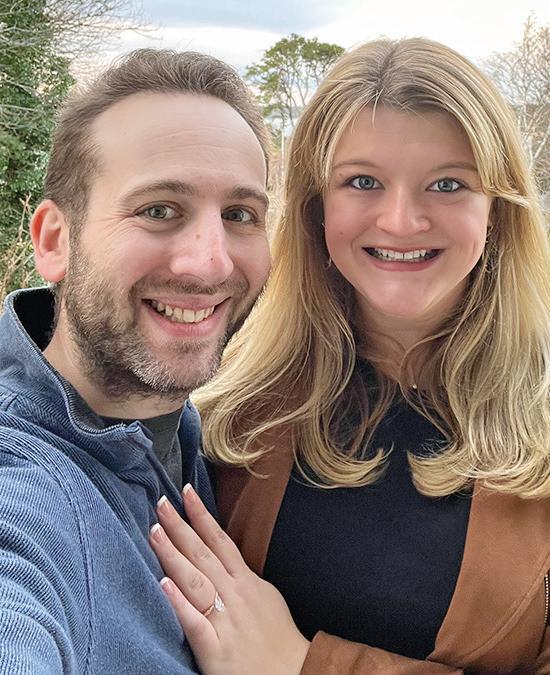
Dr. Lacey Kraft Wiegmann, ’12, ’14, of Breese, Ill., and her husband, Alex, welcomed their second child, Reed William, on January 8, 2021, nearly 12 weeks early. After a three-month neonatal intensive care unit stay, he was finally welcomed home by mom, dad and big sister, Aubrey.
John P. McCabe, ’13, of St. Louis, was named principal of Parkway West High School. McCabe served as the principal of the Fern Ridge High School choice program in the Parkway School District for three years prior to his new role. McCabe received his Master of Education in Educational Leadership from Maryville University.
Jordan A. Willimann, ’13, of St. Louis, was one of 85 St. Louis area educators to receive an Emerson Excellence in Teaching Award. The award pays tribute to area educators — from kindergarten teachers to college professors — for their achievements and dedication to the field of education.
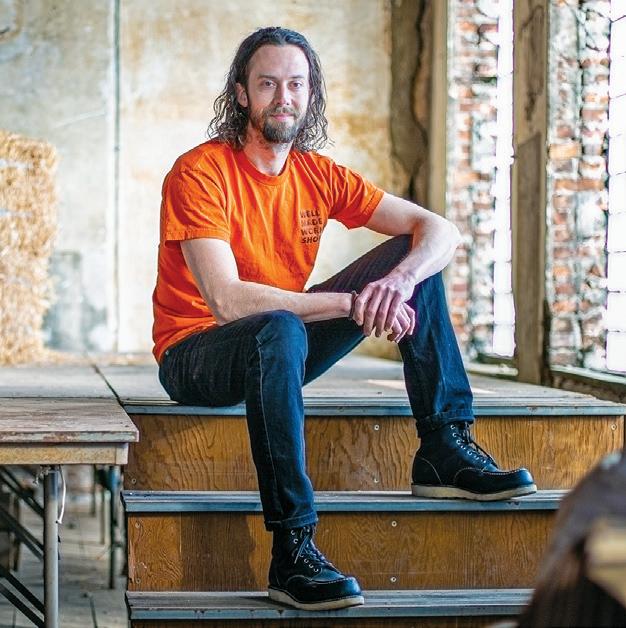
BY JOHN GIBBS
Back in 2020, when the mask mandate went into effect in St. Louis City, many people saw it as an inconvenience. Kevin Kelly, ’03, saw it as an opportunity.
Shiree Yeggins-Campbell, ’08, of St. Louis, was appointed by the Kirkwood School District Board of Education to serve as the assistant principal of Pioneer Pathways. Yeggins-Campbell has been an educator for 21 years. She obtained her doctorate in education from Maryville and previously served as a high school English teacher in the Riverview Gardens School District.
2 Lauren Dieckmann, ’10, of St. Louis, and her husband welcomed their first child, Levi Timothy, on November 5, 2021.
Dr. Anna M. Hindelang, ’11, ’13, of Chicago, is a senior physical therapist at the Shirley Ryan Ability Lab. She is a board-certified clinical specialist in neurological physical therapy and works on the spinal cord injury floor. Shirley Ryan Ability Lab (formerly the Rehab Institute of Chicago) has been rated the No. 1 rehabilitation lab in the United States for 31 years by U.S. News & World Report (Best Hospitals). Additionally, Hindelang was recently highlighted in a promotional video for the Shirley Ryan Ability Lab.
3 John A. Martellaro, ’13, of Jefferson City, Mo., married Katie Mehmert in October 2021. Martellaro is a legacy alumnus: His mom is alumna Diane Broeker Martellaro, ’82. Together, the family owns and operates Martellaro Marble & Granite in Jefferson City, Mo.
4 Vanessa Lang, ’14, ’16, of Holliston, Mass., joined the corporate legal team for Dunkin’ Donuts and Baskin-Robbins as a Loss Prevention Analytics Analyst in November 2021. This has been her dream job and dream company! While at dinner celebrating the job offer, her boyfriend of four years, Eric Bornfriend, proposed. They recently moved to Eric’s hometown of Holliston, where they live with their cat and dog.
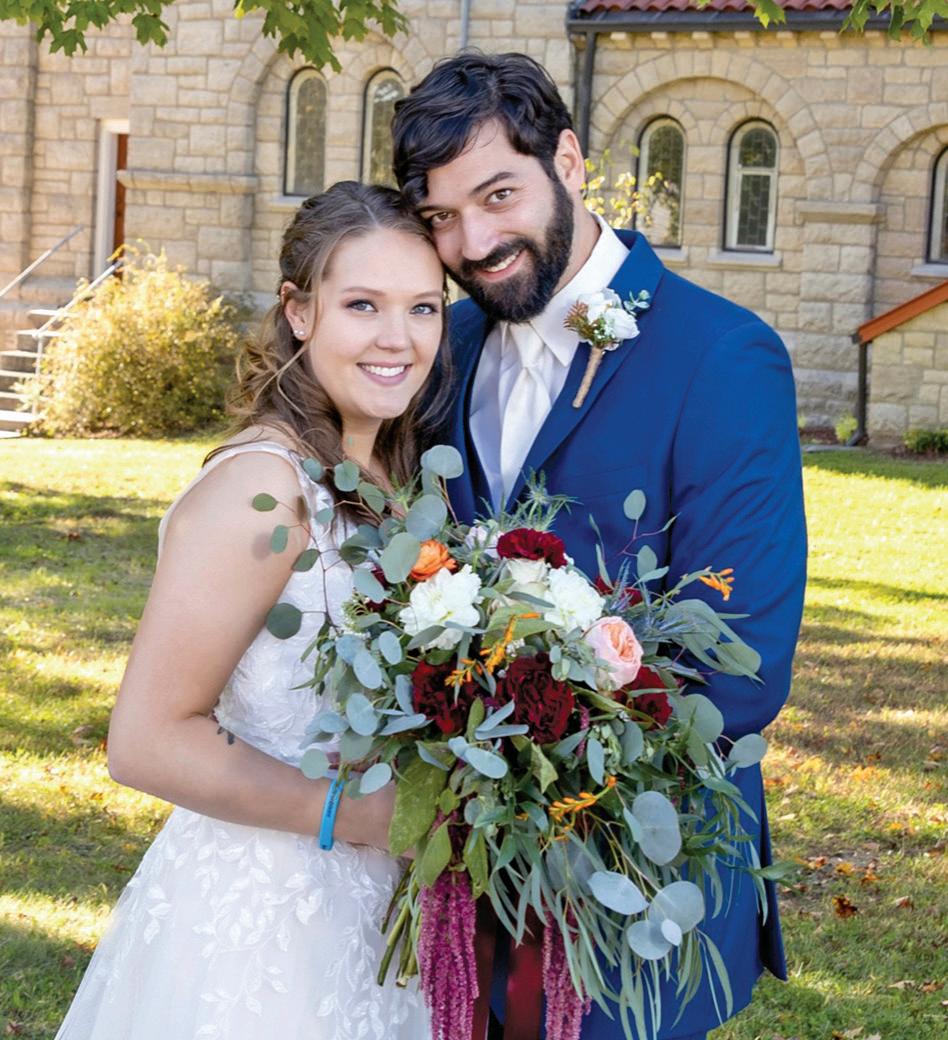
He’d just begun working with Well Made Workshop, a design studio he now owns and operates, when they decided to change course and focus solely on manufacturing face coverings — thousands of them. At one point during the initial COVID-19 surge, Kelly and his team were put in touch with actor Jason Momoa to design a custom mask based on his triangular-patterned arm tattoo.
“Everyone was exhausted,” Kelly said. “It was hard to turn away business. But once the pandemic began to plateau I think everyone wanted to get back to making different products.” This ability to adjust on the fly isn’t something new to Kelly. In fact, it’s a philosophy that speaks to how he lives his life.
Kelly started at community college when he was just 15 years old, transferring to Maryville three years later. He knew he didn’t want to pursue a traditional education, so he opted to set up his own independent study instead, graduating with a bachelor’s degree in digital media and philosophy, reading everything from Aristotle to Chomsky along the way.
After graduating from Maryville, he briefly returned to community college to study videography and writing, eventually landing a job as a creative director with a nonprofit. That stint taught him about collaborating with other creatives. In 2009, he founded his own company, Anti-Agency, and then started Snake Bite Co. in 2014, which manufactures handcrafted keychain bottle openers.
Now Kelly is focused on creative projects that emphasize America’s shared immigrant past. “How can we tell the story of this country where everyone feels welcome?” he asks. “Travel the world a bit and you’ll realize America is truly a unique place. Even though we have our own problems, we also have a process that allows us to be self-critical and constantly evolving.”
Kelly is encouraged by some of the more positive changes the pandemic has brought, particularly the Great Resignation. To him, it signals that people are finally waking up to question everything around them, something he’s been doing since his time at Maryville. He loves seeing people take creative risks and pursue what makes them happy, even if it means embracing uncertainty. “If something feels uncomfortable to you, you’re probably right where you should be,” he said.
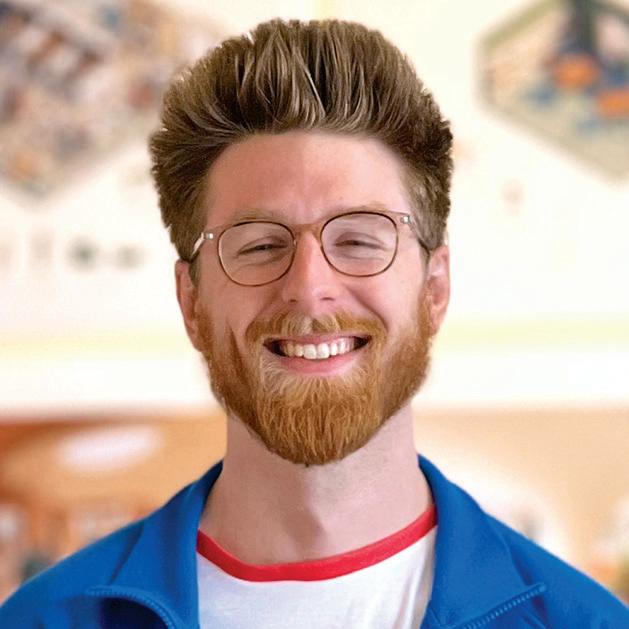
For as long as he can remember, Phil Snowbarger, ’20, has tried to convince his friends to make a video game.
Last year, he finally persuaded a close friend, Jacob Lear, who started learning a bit of coding. Snowbarger brings extensive design experience to the table. The pair decided to combine their strengths and participate in a Game Jam, a timed event where participants make a video game from scratch.
After their game ranked in the Top 40 out of 1,800 submissions, Snowbarger shared it on his work Slack channel. He received great feedback from his colleagues, which opened up a dialogue about taking the project further. Those conversations have resulted in a publishing deal with one of the most recognizable names in the gaming industry: Atari.
“I think if childhood Phil could meet me right now, think he would think I’m a pretty cool guy,” Snowbarger said.
The new title, Kombinera, will be available in June on 11 gaming platforms, including PlayStation, Xbox One and Nintendo Switch. The game lets players take control of multiple-colored balls while navigating through more than 300 increasingly perilous environments and puzzles.
Kombinera is being developed by Snowbarger’s employer, Graphite Lab, a St. Louis-based video game developer. The company already boasts one original title, Hive Jump, available on Xbox One, Nintendo Switch, Steam and Wii U. Graphite Lab has also been hired by publishers like Hasbro, Disney and Atari, including developing RollerCoaster Tycoon Puzzle, based on a beloved franchise.
Snowbarger said his experiences as an interactive design major at Maryville allowed a smooth transition into the world of video games. While at Maryville, Snowbarger was drawn to motion graphics, which he described as “bringing art to life.” The skills he learned while creating websites and mobile applications are also key components of game design.
“The culture at Maryville is very collaborative, and that was very formative for me,” Snowbarger said. “A lot of projects were organized in groups and we always bounced ideas off each other and helped each other out. It’s an environment where you learn how to work with others and push each other to be better and get excited about what everyone else is doing.”
5 Dr. Adam M Schwerdt, ’14, ’16, of Colorado Springs, Colo., and his wife moved from St. Louis to Colorado Springs in March 2020 with their two dogs. In August 2021, he quit his job at a traditional physical therapy practice to start his own: RunMental.
Schwerdt has been coaching runners for several years on the side and has expanded that business to include physical therapy where he can serve endurance athletes for everything from injury to performance.
Dr. Kathryn “Kate” Wagner Hill, ’14, of O’Fallon, Mo., joined Mercy’s Integrative Medicine and Therapy Services clinic as a chiropractic physician. She uses a variety of chiropractic techniques and acupuncture to treat musculoskeletal conditions. Hill will also continue to teach biology at Maryville University.
Brittany Garza Rees, ’15, of St. Louis, was one of 85 St. Louisarea educators to receive an Emerson Excellence in Teaching Award. The award pays tribute to area educators — from kindergarten teachers to college professors — for their achievements and dedication to the field of education.
Sarah J. Schwegel, ’15, of St. Louis, was born with spinal muscular atrophy and spent every summer as a child at Muscular Dystrophy Association’s (MDA) summer camp. Schwegel became an MDA ambassador and spent time traveling across the country and speaking with the association’s sponsors. Her time spent doing that helped with her current position. She now works at the nonprofit Paraquad, helping people with disabilities become the best advocates they can be. Schwegel is excited about the breakthroughs that have come for treatment of the disease and is hopeful for the future.
Dr. Jodi Klott Bielicke, ’15, ’17, of Valley Park, Mo., is clinic director at Axes Physical Therapy in Fenton, Mo., which offers pre- and post-surgical rehabilitation and athletic training services, as well as free injury screenings. Bielicke specializes in treating children and teen athletes. She competed in track and field at Maryville University, which led her to work with runners and other athletes to help them heal from and treat lower extremity injuries.
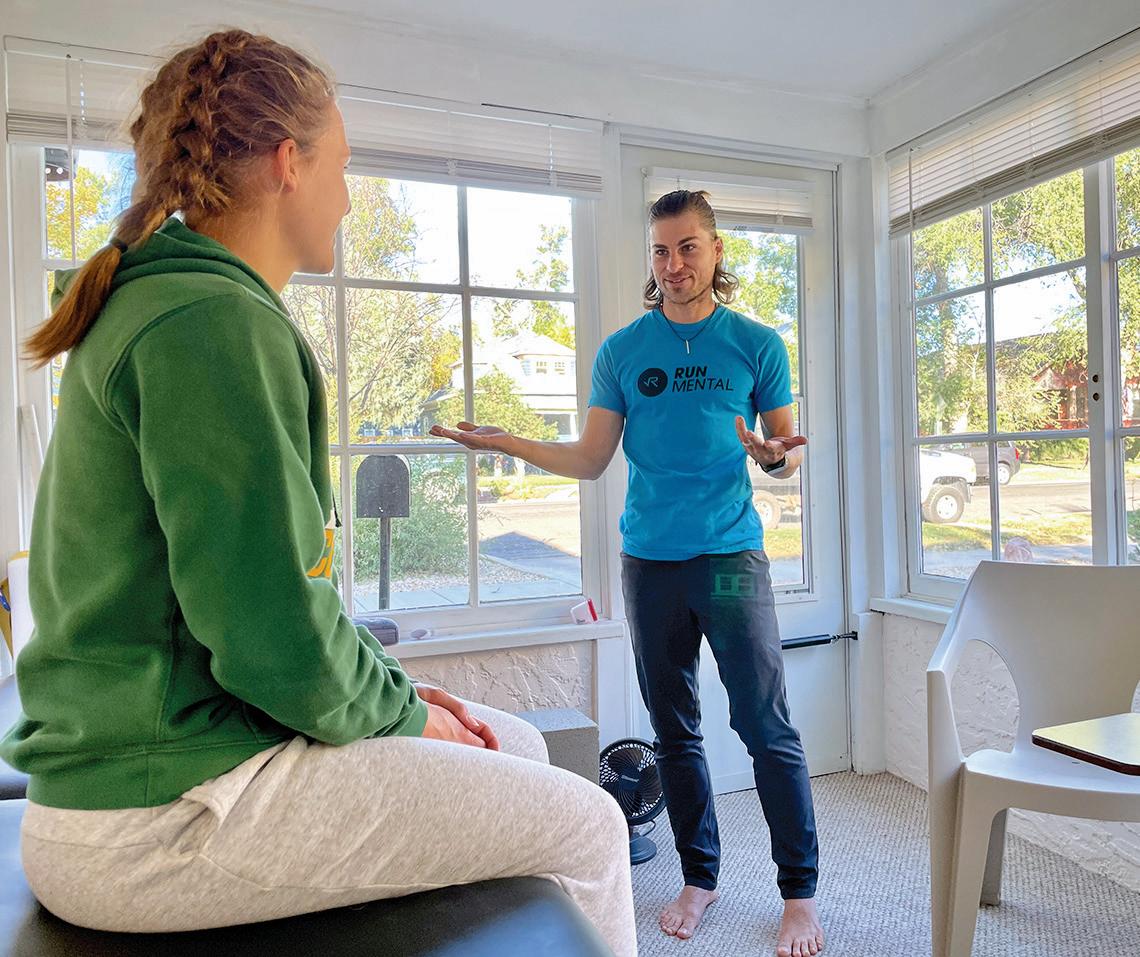
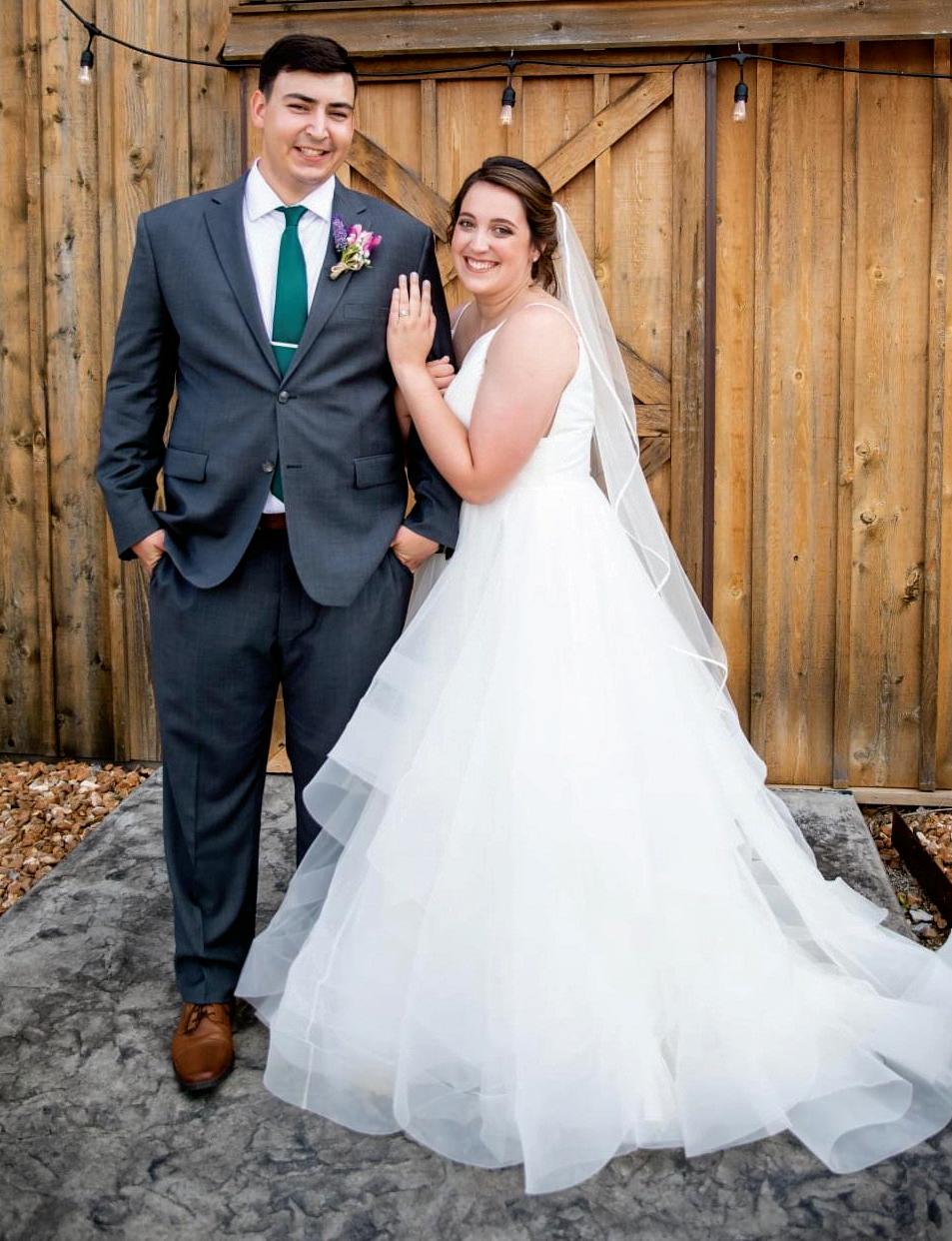
Michael “Mike” J. Scharf, ’16, of Memphis, Tenn., was added to the Memphis Americans men’s soccer roster in December 2021. Scharf played collegiate soccer at Maryville University as well as Rhodes College in Memphis and Missouri University of Science and Technology in Rolla, Mo. The St. Louis native was the captain of Maryville’s team. Scharf’s professional indoor soccer career began with the Cedar Rapids Rampage, where he earned a roster spot late in the 2017–2018 season. In 2018, Scharf spent time with the Tacoma Stars and went on to play for his hometown team, the St. Louis Ambush, from 2019 to 2021. Over the years, Scharf has also played for teams across a variety of leagues, including the Southwest Florida Adrenaline, Kitsap SC Pumas and Nordvärmlands FF.
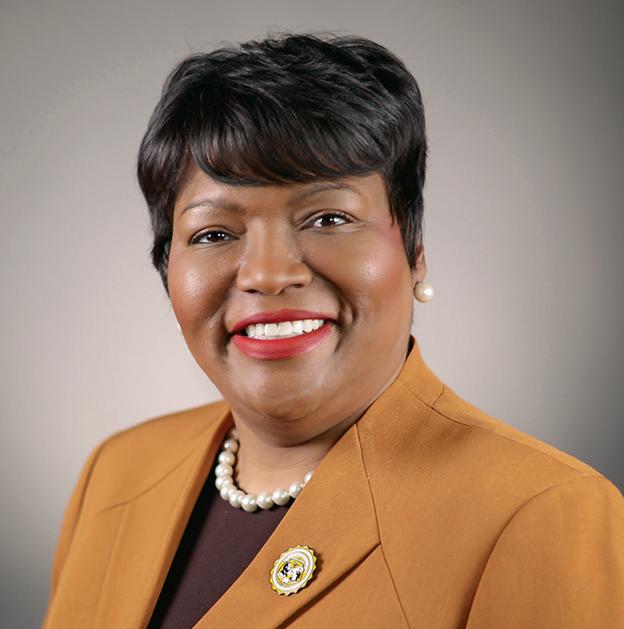
When LaTonia Collins Smith, EdD, ’14, first began her application to the doctoral program in education at Maryville, she hit a bit of a snag when it came to writing the essay.
Then she met a colleague at Harris-Stowe State University who was the second person to tell her that a Maryville degree would be a big boost for her advancement in higher education, so she decided to get back to work on her essay.
That was in 2011. Her diligence paid off, as she earned her doctorate in higher education leadership and has steadily climbed the career ladder at Harris-Stowe, culminating with being named the institution’s first female African American president.
The Maryville program “was relevant and rigorous,” she said. “It allowed me to reflect on my previous career as a social worker and public health practitioner, so I could utilize skills already had to work in a career in higher ed.”
6 Dr. Amanda Gross Matlock, ’16, ’19, of O’Fallon, Mo., married Timothy Matlock, a firefighter paramedic for Metro West Fire Protection District, on July 10, 2021.
Jordan Coker King, ’17, ’20, of Cincinnati, started a new job as a recruiter with Excite Health Partners.
Ryan McDonnell, EdD, ’17, of St. Louis, joined Lindenwood University as director of residential life. McDonnell plans to focus on the student experience, including ensuring residential housing is a comfortable place where students can learn and grow.
Collins Smith, a St. Louis native and graduate of Saint Louis Public Schools, had been serving as interim president at HarrisStowe since last June, after filling jobs ranging from project coordinator in the office of counseling services to provost and vice president for academic affairs. She is also co-principal investigator of a $5 million grant from the National Science Foundation to strengthen STEM education in Missouri. That discipline has been a primary focus for her, particularly for minority students. She wants to make sure that students who may not be able to afford a larger university can still become proficient in science, technology, engineering and math.
“In August, Governor Parson signed a bill for Harris-Stowe to have a statewide mission in STEM,” she said. “That aligns with our overall mission to provide an accessible, high-quality and diverse education for the underserved.”
Fulfilling that mission will help the university live up to its potential, Collins Smith said. “Our university is a jewel in the St. Louis crown,” she added, “and being the first female African American president at Harris-Stowe, want to be a living example for Black and brown girls, letting them know that their dreams are possible.”
Collins Smith’s agenda for her tenure as president of Harris-Stowe is an ambitious one: increased enrollment, a few construction projects, new partnerships and new relationships, an established foundation, fundraising and increased alumni engagement. “It’s a big list,” she said, “but it’s doable.”
Margaret Louise Wade Long, ’48
Virginia “Ginny” Schless Senkosky, ’49
Jean Handley Franks, ’51
Carol Stephens Dubuque, ’54
Mary Virginia “Ginger” Klohr Krebs, ’56
Helen Ann Riechmann, ’56
Virginia “Jane” Shannon Cannon, ’57
Kathleen Brennan Danna, ’62
Elaine “Lainee” George Smith, ’65
Donald “Don” E. Price, ’82
Barbara “Barb” Reber Ottolini, ’90
Sharon Nugent Head, ’91
Calvert A. Jared, ’95
Darren A. Pilarski, ’96
Shawn Aaron Downs, ’00
Carolyn E. Samuelson, ’18
Kyle L. Anderson, ’18, of Riverton, Wyo., joined Community Health Centers of Central Wyoming at the Riverton location in January 2022 as a family nurse practitioner. She has a wide range of experience and likes working in smaller towns so she can get to know her patients and the community.
7 Jennifer Baker Cook, ’18, and Connor K. Cook, ’17, both of Wildwood, Mo., have been married for two years. The couple dated all through their years at Maryville University.
Ryan J. Short, ’18, of St. Louis, started a new job as assistant director of ticket operations at the University of Florida.
Jeanie L. Wadlington, ’18, of Cadiz, Ky., and Billie Dawn Stokes have partnered to establish Infinity Family Care PLLC. The community was invited to attend a ribboncutting ceremony on November 5, 2021, to celebrate the opening. Infinity Family Care provides health care services for patients ages 6 months through adulthood. Wadlington has a strong desire to care for the community and has hopes that the new clinic can help do this.
8 Carrie A. Boyer, ’19, of St. Louis, welcomed a baby boy, Eli James, on September 8, 2021.


Laken D. Lasher, ’20, of Smithland, Ky., joined Baptist Health Medical Group Primary Care as a nurse practitioner.
Vittorio “Vito” Sasso, ’20, of Lakeland, Fla., was named to the 2021 Sun Conference Men’s Soccer All-Academic Team. Sasso is now a midfielder for Southeastern University in Lakeland, Fla., where he is pursuing his graduate degree.
Elizabeth Rivers-Conley, ’21, of Florissant, Mo., accepted a nursing position with Mercy Hospital St. Louis on the Operating Room team.
Theresa Jackson Seeker, ’21, of St. Louis, graduated from Maryville in December 2021 with a Doctor of Nursing Practice. Seeker is currently working at Barnes-Jewish Hospital in the Emergency Room department. She also recently married a young man who works as a paramedic. Seeker and her grandmother, Anne Nurre Heidt, ’46, are both proud Maryville alumnae!
Macee Eickmeyer Smith, ’21, of Hoyleton, Ill., is serving as a nurse practitioner at AST Primary Care in Marion, Ill. Macee has returned to her hometown to work after spending time as a registered nurse at St. Elizabeth’s Hospital in O’Fallon, Ill.
Danalee Robb, ’21, of Davidsonville, Md., has owned and operated her own assisted living facility for 24 years. She shares that graduating from Maryville with her post-master’s certificate (adultgerontology primary care nurse practitioner) has enhanced her autonomy in caring for the patient population that she dearly loves and serves. She will be pursuing a Doctor of Nursing Practice in the coming months. Robb also received an honorary doctorate in philosophy and the President’s Volunteer Service Award from President Joe Biden.
Richard “Rick” C. Trietley, ’22, of La Crosse, Wis., was named the 10th president of Viterbo University. Trietley had served as the interim president since June 25, 2021. He recently graduated from Maryville University with a Doctor of Education in Spring 2022.
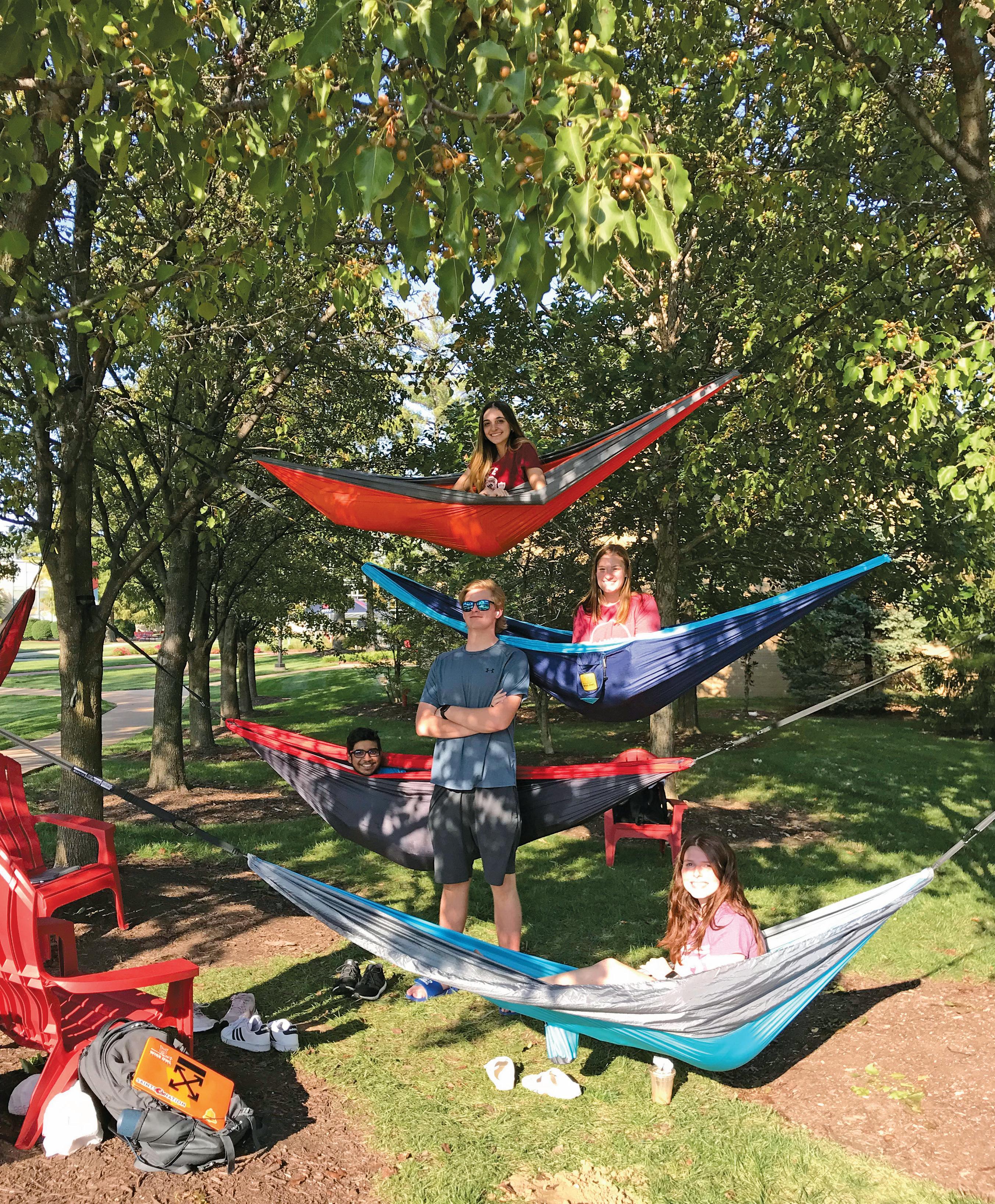
HANGING OUT: On warm-weather days, hammocks are often seen along the tree-lined path leading to the Donius University Center. Students enjoy doing homework, talking with friends and relaxing in their hammocks. This next-level hammock grove was recently spotted on campus. Measuring four hammocks high, this balancing act is proof that Saints know how to hammock! Follow the new Maryville University Hammock Society on Instagram @muhammocksociety.
